
MBARE, HARARE, ZIMBABWE, 21 JANUARY 2020: Dixon Chibanda is a Zimbabwean clinical psychiatrist and the founder of the Friendship Bench program, an evidence based psychological therapy for depression delivered by over 700 trained community grandmothers on wooden park benches in over 100 communities across Zimbabwe. In a country where on average there is 1 psychiatrist for every 1.5 million people this has proven a meaningful solution for many suffering from mental health trauma. The program has now spread to 18 countries and continues to grow. I photographed the program all over Zimbabwe, a failed state with 89% unemployment, mass economic migration and a brutal regime that regulars traumatizes its citizens. Zimbabwe has one of the highest suicide rates in the world. I added previously shot images of trauma in Zimbabwe to add context to the therapy.Volunteer grandmothers for Friendship Benches are seen in at the Mbare Poly Clinic. Shelter Nhengo, 72, in the pink hat, has been working for FB since 2006, part of the original group. The grandmothers work as voluntary counsellors for those who would otherwise have no access to mental health services. The participants are taught a structured approach to identifying problems and to find workable solutions. The grandmothers follow a detailed script contained in a manual to conduct 6 sessions on a bench located in a discreet area outside the clinic. They listen and have the trust of the patients due to the cultural traditions of older woman being beacons of trust and confidentiality. The Grandmothers say that they are also benefitting, their problems gain perspective and they have a better sense of community.

RUTSANANA, HARARE, ZIMBABWE, 17TH JANUARY 2020: Mavis Mumamato, 82, has been a counsellor for Friendship Benches for 3 years. She has 48 grandchildren and had ten children herself. 4 of those died. She became a healthworker in 1986. She is seen with other grandmother’s who work with Friendship Benches gather for a workshop at Rutsanana Community Clinic outside of Harare. They are here for a workshop on malnutrition. The grandmothers also work as voluntary counselers for those who would otherwise have no access to mental health services. The participants are taught a structured approach to identifying problems and to find workable solutions. The grandmothers follow a detailed script contained in a manual to conduct 6 sessions on a bench located in a discreet area outside the clinic. They listen and have the trust of the patients due to the cultural traditions of older woman being beacons of trust and confidentiality. The Grandmothers say that they are also benefitting, their problems gain perspective and they have a better sense of community. This therapy was developed by Dixon Chibanda, Zimbabwe’s leading psychiatrist, and has spread around the world. (Photo by Brent Stirton/Getty Images

MBARE, HARARE, ZIMBABWE, 22 JANUARY 2020: Sekesayi Idah Hwiza, 86, is a former freedom fighter from Zimbabwe’s war of liberation. She was involved in a notorious incident where freedom fighters blew up a major fuel depot in Harare. She was involved in hiding the explosives and the fighters in her home and she was subsequently tortured by the authorities at the time. She was also threatened and hurt by the freedom fighters who were suspicious of what she may have told the authorities. She suffered from PTSD for many years and she claims that working with Friendship Benches helped her to get over that. The grandmothers of FB work as voluntary counselers for those who would otherwise have no access to mental health services. The participants are taught a structured approach to identifying problems and to find workable solutions. The grandmothers follow a detailed script contained in a manual to conduct 6 sessions on a bench located in a discreet area outside the clinic. They listen and have the trust of the patients due to the cultural traditions of older woman being beacons of trust and confidentiality. The Grandmothers say that they are also benefitting, their problems gain perspective and they have a better sense of community. This therapy was developed by Dixon Chibanda, Zimbabwe’s leading psychiatrist, and has spread around the world. (Photo by Brent Stirton/Getty Images for GEO magazine.)

ZAKA, MSVINGO, ZIMBABWE, 24 JANUARY 2020: Elizabeth Mapaire, 56, works as a Friendship Bench counselor in the Zaka area, servicing rural clinics in the area. She is a lay health worker who is paid by the Ministry of Health but her salary is less than 2 dollars. She is seen on the bench with patient Sophia Nyamuwngi, 34, in Sophia’s first of six sessions. Sophia was quickly red flagged in this session as she expressed a desire to kill herself due to her husband’s neglect and abandonment of her and her children. Elizabeth sent her to a more experienced nurse counselor and after that visit, Sophia returned to the bench with Elizabeth. The grandmothers work as voluntary counselors for those who would otherwise have no access to mental health services. The participants are taught a structured approach to identifying problems and to find workable solutions. The grandmothers follow a detailed script contained in a manual to conduct 6 sessions on a bench located in a discreet area outside the clinic. They listen and have the trust of the patients due to the cultural traditions of older woman being beacons of trust and confidentiality. The Grandmothers say that they are also benefitting, their problems gain perspective and they have a better sense of community. This therapy of communal empathy was developed by Dixon Chibanda, Zimbabwe’s leading psychiatrist, and has spread around the world. (Photo by Brent Stirton/Getty Images

ZAKA, MSVINGO, ZIMBABWE, 24 JANUARY 2020: Elizabeth Mapaire, 56, works as a Friendship Bench counselor in the Zaka area, servicing rural clinics in the area. She is a lay health worker who is paid by the Ministry of Health but her salary is less than 2 dollars. She is seen on the bench with patient Sophia Nyamuwngi, 34, in Sophia’s first of six sessions. Sophia was quickly red flagged in this session as she expressed a desire to kill herself due to her husband’s neglect and abandonment of her and her children. Elizabeth sent her to a more experienced nurse counselor and after that visit, Sophia returned to the bench with Elizabeth. The grandmothers work as voluntary counselors for those who would otherwise have no access to mental health services. The participants are taught a structured approach to identifying problems and to find workable solutions. The grandmothers follow a detailed script contained in a manual to conduct 6 sessions on a bench located in a discreet area outside the clinic. They listen and have the trust of the patients due to the cultural traditions of older woman being beacons of trust and confidentiality. The Grandmothers say that they are also benefitting, their problems gain perspective and they have a better sense of community. This therapy of communal empathy was developed by Dixon Chibanda, Zimbabwe’s leading psychiatrist, and has spread around the world. (Photo by Brent Stirton/Getty Images

ZAKA, MSVINGO, ZIMBABWE, 24 JANUARY 2020: Elizabeth Mapaire, 56, works as a Friendship Bench counselor in the Zaka area, servicing rural clinics in the area. She is a lay health worker who is paid by the Ministry of Health but her salary is less than 2 dollars. She is seen on the bench with patient Sophia Nyamuwngi, 34, in Sophia’s first of six sessions. Sophia was quickly red flagged in this session as she expressed a desire to kill herself due to her husband’s neglect and abandonment of her and her children. Elizabeth sent her to a more experienced nurse counselor and after that visit, Sophia returned to the bench with Elizabeth. The grandmothers work as voluntary counselors for those who would otherwise have no access to mental health services. The participants are taught a structured approach to identifying problems and to find workable solutions. The grandmothers follow a detailed script contained in a manual to conduct 6 sessions on a bench located in a discreet area outside the clinic. They listen and have the trust of the patients due to the cultural traditions of older woman being beacons of trust and confidentiality. The Grandmothers say that they are also benefitting, their problems gain perspective and they have a better sense of community. This therapy of communal empathy was developed by Dixon Chibanda, Zimbabwe’s leading psychiatrist, and has spread around the world. (Photo by Brent Stirton/Getty Images

MBARE, HARARE, ZIMBABWE, 21 JANUARY 2020: Volunteer grandmothers for Friendship Benches are seen in at the Mbare Poly Clinic. Shelter Nhengo, 72, has been working for FB since 2006, part of the original group. The grandmothers work as voluntary counselers for those who would otherwise have no access to mental health services. The participants are taught a structured approach to identifying problems and to find workable solutions. The grandmothers follow a detailed script contained in a manual to conduct 6 sessions on a bench located in a discreet area outside the clinic. They listen and have the trust of the patients due to the cultural traditions of older woman being beacons of trust and confidentiality. The Grandmothers say that they are also benefitting, their problems gain perspective and they have a better sense of community. This therapy was developed by Dixon Chibanda, Zimbabwe’s leading psychiatrist, and has spread around the world. (Photo by Brent Stirton/Getty Images

ZAKA, MSVINGO, ZIMBABWE, 24 JANUARY 2020: Elizabeth Mapaire, 56, works as a Friendship Bench counselor in the Zaka area, servicing rural clinics in the area. She is seen in her community with a long term patient of hers, this patient is HIV +. She has lost two children to Aids as well as her husband, she thinks her other two children may be HIV+ too. Last years cyclone devastated her home and crops and she is reliant on charity. She was refered to Elizabeth a year ago and has had 4 sessions with her. They discussed her immediate problems, the children, food issues and focused on solutions like a chicken breeding project. She says that Elizabeth has offered her empathy, confidentiality and friendship, that has helped her a great deal. The grandmothers work as voluntary counselors for those who would otherwise have no access to mental health services. The participants are taught a structured approach to identifying problems and to find workable solutions. The grandmothers follow a detailed script contained in a manual to conduct 6 sessions on a bench located in a discreet area outside the clinic. They listen and have the trust of the patients due to the cultural traditions of older woman being beacons of trust and confidentiality. The Grandmothers say that they are also benefitting, their problems gain perspective and they have a better sense of community. This therapy of communal empathy was developed by Dixon Chibanda, Zimbabwe’s leading psychiatrist, and has spread around the world. (Photo by Brent Stirton/Getty Images

RUTSANANA, HARARE, ZIMBABWE, 17TH JANUARY 2020: Grandmother’s who work with Friendship Benches gather for a workshop at Rutsanana Community Clinic outside of Harare. They are here for a workshop on malnutrition. The grandmothers also work as voluntary counselers for those who would otherwise have no access to mental health services. The participants are taught a structured approach to identifying problems and to find workable solutions. The grandmothers follow a detailed script contained in a manual to conduct 6 sessions on a bench located in a discreet area outside the clinic. They listen and have the trust of the patients due to the cultural traditions of older woman being beacons of trust and confidentiality. The Grandmothers say that they are also benefitting, their problems gain perspective and they have a better sense of community. This therapy was developed by Prof. Dixon Chibanda, Zimbabwe’s leading psychiatrist, and has spread to many other countries as a means by which people without means can gain access to mental health couselling. (Photo by Brent Stirton/Getty Images

RUTSANANA, HARARE, ZIMBABWE, 17TH JANUARY 2020: Grandmother’s who work with Friendship Benches gather for a workshop at Rutsanana Community Clinic outside of Harare. They are here for a workshop on malnutrition. The grandmothers also work as voluntary counselers for those who would otherwise have no access to mental health services. The participants are taught a structured approach to identifying problems and to find workable solutions. The grandmothers follow a detailed script contained in a manual to conduct 6 sessions on a bench located in a discreet area outside the clinic. They listen and have the trust of the patients due to the cultural traditions of older woman being beacons of trust and confidentiality. The Grandmothers say that they are also benefitting, their problems gain perspective and they have a better sense of community. This therapy was developed by Prof. Dixon Chibanda, Zimbabwe’s leading psychiatrist, and has spread to many other countries as a means by which people without means can gain access to mental health couselling. (Photo by Brent Stirton/Getty Images

MBARE, HARARE, ZIMBABWE, 21 JANUARY 2020: Juliet Kusikwenyu, 66, works as a mental health counsellor for Friendship Benches, are seen in a counselling session on the benches at Mbare Poly Clinic. The patient in this case is someone who is dealing with her second husband’s rejection of her child, a difficult situation. Her husband is also HIV +, something he did not share with her before they were married. Juliet says that working for Friendship Benches has made her own life more managable. She feels that there are now less suicides and that the benches are part of that. “Mr Chipanda brought us a solution, now we know where to go.” The grandmothers work as voluntary counselers for those who would otherwise have no access to mental health services. The participants are taught a structured approach to identifying problems and to find workable solutions. The grandmothers follow a detailed script contained in a manual to conduct 6 sessions on a bench located in a discreet area outside the clinic. They listen and have the trust of the patients due to the cultural traditions of older woman being beacons of trust and confidentiality. The Grandmothers say that they are also benefitting, their problems gain perspective and they have a better sense of community. This therapy was developed by Dixon Chibanda, Zimbabwe’s leading psychiatrist, and has spread around the world. (Photo by Brent Stirton/Getty Images

MBARE, HARARE, ZIMBABWE, 21 JANUARY 2020: A grandmother working for Friendship Benches is seen counselling a yong mother at the Mbare Poly Clinic. The young women is talking about the difficulties of finance in a country with 90% unemployment. The grandmothers work as voluntary counselers for those who would otherwise have no access to mental health services. The participants are taught a structured approach to identifying problems and to find workable solutions. The grandmothers follow a detailed script contained in a manual to conduct 6 sessions on a bench located in a discreet area outside the clinic. They listen and have the trust of the patients due to the cultural traditions of older woman being beacons of trust and confidentiality. The Grandmothers say that they are also benefitting, their problems gain perspective and they have a better sense of community. This therapy was developed by Dixon Chibanda, Zimbabwe’s leading psychiatrist, and has spread around the world. (Photo by Brent Stirton/Getty Images

HIGHLANDS, HARARE, ZIMBABWE, 19 JANUARY 2020: Sunday morning church scenes at St Paul’s Anglican Church. Friendship Bench grandmother/Counsellor Shebbah Komayi, 65, was present at the service and is a member of the mother’s union of the Church. She is seen receiving communion, giving donations and dancing with her sister and other ladies from the Church. Shebbah lives an impoverished life and cares for a number of orphans in her small house as well as 5 of her own grandchildren. She says though that Friendship Benches has given her great support and a sense of community that has made her life better through this initiative. Friendship Benches is a concept that brings mental health care and counselling to the masses via a group of grandmothers who work as health care workers in their communities. They are trained as counsellors to administer a psychological evaluation to patients who come for 6 visits that is aimed at practical solutions and a compassionate therapeutic experience. (Photo by Brent Stirton/Getty Images

MBARE, HARARE, ZIMBABWE, 21 JANUARY 2020: A group of grandmothers who work for Friendship Benches are seen in a conference room at the Mbare Poly Clinic. The grandmothers work as voluntary counselers for those who would otherwise have no access to mental health services. The participants are taught a structured approach to identifying problems and to find workable solutions. The grandmothers follow a detailed script contained in a manual to conduct 6 sessions on a bench located in a discreet area outside the clinic. They listen and have the trust of the patients due to the cultural traditions of older woman being beacons of trust and confidentiality. The Grandmothers say that they are also benefitting, their problems gain perspective and they have a better sense of community. This therapy was developed by Dixon Chibanda, Zimbabwe’s leading psychiatrist, and has spread around the world. (Photo by Brent Stirton/Getty Images

MBARE, HARARE, ZIMBABWE, 21 JANUARY 2020: Volunteer grandmother for Friendship Benches, Shelter Nhengo, 72, is seen in at the Mbare Poly Clinic. The grandmothers work as voluntary counselers for those who would otherwise have no access to mental health services. The participants are taught a structured approach to identifying problems and to find workable solutions. The grandmothers follow a detailed script contained in a manual to conduct 6 sessions on a bench located in a discreet area outside the clinic. They listen and have the trust of the patients due to the cultural traditions of older woman being beacons of trust and confidentiality. The Grandmothers say that they are also benefitting, their problems gain perspective and they have a better sense of community. This therapy was developed by Dixon Chibanda, Zimbabwe’s leading psychiatrist, and has spread around the world. (Photo by Brent Stirton/Getty Images

MBARE, HARARE, ZIMBABWE, 21 JANUARY 2020: Volunteer grandmothers for Friendship Benches are seen in at the Mbare Poly Clinic. Shelter Nhengo, 72, has been working for FB since 2006, part of the original group. The grandmothers work as voluntary counselers for those who would otherwise have no access to mental health services. The participants are taught a structured approach to identifying problems and to find workable solutions. The grandmothers follow a detailed script contained in a manual to conduct 6 sessions on a bench located in a discreet area outside the clinic. They listen and have the trust of the patients due to the cultural traditions of older woman being beacons of trust and confidentiality. The Grandmothers say that they are also benefitting, their problems gain perspective and they have a better sense of community. This therapy was developed by Dixon Chibanda, Zimbabwe’s leading psychiatrist, and has spread around the world. (Photo by Brent Stirton/Getty Images

MBARE, HARARE, ZIMBABWE, 21 JANUARY 2020: Dixon Chipanda, psychiatrist and founder of Friendship Benches, attends to one of the grandmothers who works as a Friendship Bench counsellor. She was suffering from a suspected stroke but later recovered. (Photo by Brent Stirton/Getty Images

MBARE, HARARE, ZIMBABWE, 22 JANUARY 2020: Dixon Chipanda, psychiatrist and founder of mental health NGO Friendship Benches, meets with the group of grandmothers who work for Friendship Benches at Mbare Poly Clinic. The grandmothers work as voluntary counselers for those who would otherwise have no access to mental health services. The participants are taught a structured approach to identifying problems and to find workable solutions. The grandmothers follow a detailed script contained in a manual to conduct 6 sessions on a bench located in a discreet area outside the clinic. They listen and have the trust of the patients due to the cultural traditions of older woman being beacons of trust and confidentiality. The Grandmothers say that they are also benefitting, their problems gain perspective and they have a better sense of community. This therapy was developed by Dixon Chibanda, Zimbabwe’s leading psychiatrist, and has spread around the world. (Photo by Brent Stirton/Getty Images for GEO magazine.)

MBARE, HARARE, ZIMBABWE, 22 JANUARY 2020: Dixon Chipanda, psychiatrist and founder of mental health NGO Friendship Benches, meets with the group of grandmothers who work for Friendship Benches at Mbare Poly Clinic. The grandmothers work as voluntary counselers for those who would otherwise have no access to mental health services. The participants are taught a structured approach to identifying problems and to find workable solutions. The grandmothers follow a detailed script contained in a manual to conduct 6 sessions on a bench located in a discreet area outside the clinic. They listen and have the trust of the patients due to the cultural traditions of older woman being beacons of trust and confidentiality. The Grandmothers say that they are also benefitting, their problems gain perspective and they have a better sense of community. This therapy was developed by Dixon Chibanda, Zimbabwe’s leading psychiatrist, and has spread around the world. (Photo by Brent Stirton/Getty Images for GEO magazine.)

ZAKA, MSVINGO, ZIMBABWE, 23 JANUARY 2020: Grandmother and Friendship Bench counsellor Aleta Gukwa, 60, mops the floor while waiting for a patient for her counselling services. Friendship Benches is an NGO that offers free mental health counselling through trained grandmothers who work as lay health workers in clinics in Msvingo and Harare areas of Zimbabwe. (Photo by Brent Stirton/Getty Images for GEO magazine.)

ZAKA, MSVINGO, ZIMBABWE, 23 JANUARY 2020: Grandmother and Friendship Bench counsellor Aleta Gukwa, 60, is seen with a new patient Apolonia Mekadha, 58. Friendship Benches is an NGO that offers free mental health counselling through trained grandmothers who work as lay health workers in clinics in Msvingo and Harare areas of Zimbabwe. Aleta initially identified patient Apolonia Mekadha, 58, as being a red flag case. This means a high risk of suicide. She took Apolonia to a more qualified nurse counsellor who calmed her and she returned to speak to Aleta. They live in the same village and Apolonia now has someone she can rely on for empathetic advice and a sympathetic ear. Apolonia is HIV+, unemployed and without support. She lost her home to a violent cyclone last year and her temporary shelter was destroyed by yet more rain. She is now homeless and living with her daugher and her daughter on the street. Aleta says she hears this kind of story regularly, she is paid only 44 Zimbabwe dollars every 3 months by the ministry of health. That is the equivalent of 2 US dollars. She continues her work with Friendship Benches however because she feels it makes a real difference in people’s lives. “Friendship Benches gives you as a counsellor and patient specific instructions, it can be immediately helpful with suicidal people and you can see the person getting better in your sessions with them. When my husband passed in 1990, I was depressed for a long time. Friendship Benches helped me to deal with that. I have the skills I need now. “(Photo by Brent Stirton/Getty Images for GEO magazine.)

ZAKA, MSVINGO, ZIMBABWE, 23 JANUARY 2020: Grandmother and Friendship Bench counsellor Aleta Gukwa, 60, is seen with a new patient Apolonia Mekadha, 58. Friendship Benches is an NGO that offers free mental health counselling through trained grandmothers who work as lay health workers in clinics in Msvingo and Harare areas of Zimbabwe. Aleta initially identified patient Apolonia Mekadha, 58, as being a red flag case. This means a high risk of suicide. She took Apolonia to a more qualified nurse counsellor who calmed her and she returned to speak to Aleta. They live in the same village and Apolonia now has someone she can rely on for empathetic advice and a sympathetic ear. Apolonia is HIV+, unemployed and without support. She lost her home to a violent cyclone last year and her temporary shelter was destroyed by yet more rain. She is now homeless and living with her daugher and her daughter on the street. Aleta says she hears this kind of story regularly, she is paid only 44 Zimbabwe dollars every 3 months by the ministry of health. That is the equivalent of 2 US dollars. She continues her work with Friendship Benches however because she feels it makes a real difference in people’s lives. “Friendship Benches gives you as a counsellor and patient specific instructions, it can be immediately helpful with suicidal people and you can see the person getting better in your sessions with them. When my husband passed in 1990, I was depressed for a long time. Friendship Benches helped me to deal with that. I have the skills I need now. “(Photo by Brent Stirton/Getty Images for GEO magazine.)

ZAKA, MSVINGO, ZIMBABWE, 23 JANUARY 2020: Grandmother and Friendship Bench counsellor Aleta Gukwa, 60, mops the floor and tidies up after her grandchildren at home. Friendship Benches is an NGO that offers free mental health counselling through trained grandmothers who work as lay health workers in clinics in Msvingo and Harare areas of Zimbabwe. Aleta says she hears tragic stories regularly in her counselling sessions. She is paid only 44 Zimbabwe dollars every 3 months by the ministry of health. That is the equivalent of 2 US dollars. She continues her work with Friendship Benches however because she feels it makes a real difference in people’s lives. “Friendship Benches gives you as a counsellor and patient specific instructions, it can be immediately helpful with suicidal people and you can see the person getting better in your sessions with them. When my husband passed in 1990, I was depressed for a long time. Friendship Benches helped me to deal with that. I have the skills I need now “ (Photo by Brent Stirton/Getty Images

ZAKA, MSVINGO, ZIMBABWE, 23 JANUARY 2020: Grandmother and Friendship Bench counsellor Aleta Gukwa, 60, mops the floor and tidies up after her grandchildren at home. Friendship Benches is an NGO that offers free mental health counselling through trained grandmothers who work as lay health workers in clinics in Msvingo and Harare areas of Zimbabwe. Aleta says she hears tragic stories regularly in her counselling sessions. She is paid only 44 Zimbabwe dollars every 3 months by the ministry of health. That is the equivalent of 2 US dollars. She continues her work with Friendship Benches however because she feels it makes a real difference in people’s lives. “Friendship Benches gives you as a counsellor and patient specific instructions, it can be immediately helpful with suicidal people and you can see the person getting better in your sessions with them. When my husband passed in 1990, I was depressed for a long time. Friendship Benches helped me to deal with that. I have the skills I need now “ (Photo by Brent Stirton/Getty Images

ZAKA, MSVINGO, ZIMBABWE, 23 JANUARY 2020: Grandmother and Friendship Bench counsellor Aleta Gukwa, 60, mops the floor and tidies up after her grandchildren at home. Friendship Benches is an NGO that offers free mental health counselling through trained grandmothers who work as lay health workers in clinics in Msvingo and Harare areas of Zimbabwe. Aleta says she hears tragic stories regularly in her counselling sessions. She is paid only 44 Zimbabwe dollars every 3 months by the ministry of health. That is the equivalent of 2 US dollars. She continues her work with Friendship Benches however because she feels it makes a real difference in people’s lives. “Friendship Benches gives you as a counsellor and patient specific instructions, it can be immediately helpful with suicidal people and you can see the person getting better in your sessions with them. When my husband passed in 1990, I was depressed for a long time. Friendship Benches helped me to deal with that. I have the skills I need now “ (Photo by Brent Stirton/Getty Images

ZAKA, MSVINGO, ZIMBABWE, 23 JANUARY 2020: Grandmother and Friendship Bench counsellor Aleta Gukwa, 60, fools around with her grandchildren at the home she built herself. She cares for her grandkids while her children are in South Africa trying to work and send money home. Friendship Benches is an NGO that offers free mental health counselling through trained grandmothers who work as lay health workers in clinics in Msvingo and Harare areas of Zimbabwe. Aleta says she hears tragic stories regularly in her counselling sessions. She is paid only 44 Zimbabwe dollars every 3 months by the ministry of health. That is the equivalent of 2 US dollars. She continues her work with Friendship Benches however because she feels it makes a real difference in people’s lives. “Friendship Benches gives you as a counsellor and patient specific instructions, it can be immediately helpful with suicidal people and you can see the person getting better in your sessions with them. When my husband passed in 1990, I was depressed for a long time. Friendship Benches helped me to deal with that. I have the skills I need now “ (Photo by Brent Stirton/Getty Images for GEO magazine.)

ZAKA, MSVINGO, ZIMBABWE, 23 JANUARY 2020: Friendship Bench patient Apolonia Mekadha, 58, is seen at her cyclone damaged house. That is only one of many challenges she faces for her and her childrens survival in rural Zimbabwe. Friendship Benches is an NGO that offers free mental health counselling through trained grandmothers who work as lay health workers in clinics in Msvingo and Harare areas of Zimbabwe. Aleta Gukwa, 60, is helping patient Apolonia who she initially identified as being a red flag case. She took Apolonia to a more qualified nurse counsellor who calmed her and she returned to speak to Aleta. They live in the same village and Apolonia now has someone she can rely on for empathetic advice and a sympathetic ear. Apolonia is HIV+, unemployed and without support. She lost her home to a violent cyclone last year and her temporary shelter was destroyed by yet more rain. She is now homeless and living with her daugher and her daughter on the street. Aleta says she hears this kind of story regularly, she is paid only 44 Zimbabwe dollars every 3 months by the ministry of health. That is the equivalent of 2 US dollars. She continues her work with Friendship Benches however because she feels it makes a real difference in people’s lives. “Friendship Benches gives you as a counsellor and patient specific instructions, it can be immediately helpful with suicidal people and you can see the person getting better in your sessions with them. When my husband passed in 1990, I was depressed for a long time. Friendship Benches helped me to deal with that. I have the skills I need now. “(Photo by Brent Stirton/Getty Images

ZAKA, MSVINGO, ZIMBABWE, 23 JANUARY 2020: Grandmother and Friendship Bench counsellor Aleta Gukwa, 60, is seen with her patient Apolonia Mekadha, 58. They are at Apolonia’s house that was badly damaged by a recent cyclone, together they are trying to work out how to help fix the home. Friendship Benches is an NGO that offers free mental health counselling through trained grandmothers who work as lay health workers in clinics in Msvingo and Harare areas of Zimbabwe. Aleta is seen with patient Apolonia Mekadha, 58, who she initially identified as being a red flag case. She took Apolonia to a more qualified nurse counsellor who calmed her and she returned to speak to Aleta. They live in the same village and Apolonia now has someone she can rely on for empathetic advice and a sympathetic ear. Apolonia is HIV+, unemployed and without support. She lost her home to a violent cyclone last year and her temporary shelter was destroyed by yet more rain. She is now homeless and living with her daugher and her daughter on the street. Aleta says she hears this kind of story regularly, she is paid only 44 Zimbabwe dollars every 3 months by the ministry of health. That is the equivalent of 2 US dollars. She continues her work with Friendship Benches however because she feels it makes a real difference in people’s lives. “Friendship Benches gives you as a counsellor and patient specific instructions, it can be immediately helpful with suicidal people and you can see the person getting better in your sessions with them. When my husband passed in 1990, I was depressed for a long time. Friendship Benches helped me to deal with that. I have the skills I need now. “(Photo by Brent Stirton/Getty Images

ZAKA, MSVINGO, ZIMBABWE, 25 JANUARY 2020: A carpentry workshop that manufactures the Friendship Bench. Friendship Benches is an NGO that offers free mental health counselling through trained grandmothers who work as lay health workers in clinics in Msvingo and Harare areas of Zimbabwe. Aleta is seen with patient Apolonia Mekadha, 58, who she initially identified as being a red flag case. She took Apolonia to a more qualified nurse counsellor who calmed her and she returned to speak to Aleta. They live in the same village and Apolonia now has someone she can rely on for empathetic advice and a sympathetic ear. Apolonia is HIV+, unemployed and without support. She lost her home to a violent cyclone last year and her temporary shelter was destroyed by yet more rain. She is now homeless and living with her daugher and her daughter on the street. Aleta says she hears this kind of story regularly, she is paid only 44 Zimbabwe dollars every 3 months by the ministry of health. That is the equivalent of 2 US dollars. She continues her work with Friendship Benches however because she feels it makes a real difference in people’s lives. “Friendship Benches gives you as a counsellor and patient specific instructions, it can be immediately helpful with suicidal people and you can see the person getting better in your sessions with them. When my husband passed in 1990, I was depressed for a long time. Friendship Benches helped me to deal with that. I have the skills I need now. “(Photo by Brent Stirton/Getty Images

MSVINGO, ZIMBABWE, 23 JANUARY 2020: Grandmothers who are Friendship Bench counsellors attend sunday service at the Catholic Church in Msvingo. Friendship Benches likes to partner with the church in offering support to their patients. Friendship Benches is an NGO that offers free mental health counselling through trained grandmothers who work as lay health workers in clinics in Msvingo and Harare areas of Zimbabwe. Aleta says she hears tragic stories regularly in her counselling sessions. She is paid only 44 Zimbabwe dollars every 3 months by the ministry of health. That is the equivalent of 2 US dollars. She continues her work with Friendship Benches however because she feels it makes a real difference in people’s lives. “Friendship Benches gives you as a counsellor and patient specific instructions, it can be immediately helpful with suicidal people and you can see the person getting better in your sessions with them. When my husband passed in 1990, I was depressed for a long time. Friendship Benches helped me to deal with that. I have the skills I need now “ (Photo by Brent Stirton/Getty Images

MSVINGO, ZIMBABWE, 23 JANUARY 2020: Young girls and grandmothers, including those who are Friendship Bench counsellors, attend sunday service at the Catholic Church in Msvingo. Friendship Benches likes to partner with the church in offering support to their patients. Friendship Benches is an NGO that offers free mental health counselling through trained grandmothers who work as lay health workers in clinics in Msvingo and Harare areas of Zimbabwe. Aleta says she hears tragic stories regularly in her counselling sessions. She is paid only 44 Zimbabwe dollars every 3 months by the ministry of health. That is the equivalent of 2 US dollars. She continues her work with Friendship Benches however because she feels it makes a real difference in people’s lives. “Friendship Benches gives you as a counsellor and patient specific instructions, it can be immediately helpful with suicidal people and you can see the person getting better in your sessions with them. When my husband passed in 1990, I was depressed for a long time. Friendship Benches helped me to deal with that. I have the skills I need now “ (Photo by Brent Stirton/Getty Images

MSVINGO, ZIMBABWE, 23 JANUARY 2020: Grandmothers who are Friendship Bench counsellors attend sunday service at the Catholic Church in Msvingo. Friendship Benches likes to partner with the church in offering support to their patients. Friendship Benches is an NGO that offers free mental health counselling through trained grandmothers who work as lay health workers in clinics in Msvingo and Harare areas of Zimbabwe. Aleta says she hears tragic stories regularly in her counselling sessions. She is paid only 44 Zimbabwe dollars every 3 months by the ministry of health. That is the equivalent of 2 US dollars. She continues her work with Friendship Benches however because she feels it makes a real difference in people’s lives. “Friendship Benches gives you as a counsellor and patient specific instructions, it can be immediately helpful with suicidal people and you can see the person getting better in your sessions with them. When my husband passed in 1990, I was depressed for a long time. Friendship Benches helped me to deal with that. I have the skills I need now “ (Photo by Brent Stirton/Getty Images

MSVINGO, ZIMBABWE, 23 JANUARY 2020: Grandmother and Friendship Bench counsellor Aleta Gukwa, 60, is seen with her church group, important partners to her in remaining strong in her counselling work. Grandmothers who are Friendship Bench counsellors attend sunday service at the Catholic Church in Msvingo. Friendship Benches likes to partner with the church in offering support to their patients. Friendship Benches is an NGO that offers free mental health counselling through trained grandmothers who work as lay health workers in clinics in Msvingo and Harare areas of Zimbabwe. Aleta says she hears tragic stories regularly in her counselling sessions. She is paid only 44 Zimbabwe dollars every 3 months by the ministry of health. That is the equivalent of 2 US dollars. She continues her work with Friendship Benches however because she feels it makes a real difference in people’s lives. “Friendship Benches gives you as a counsellor and patient specific instructions, it can be immediately helpful with suicidal people and you can see the person getting better in your sessions with them. When my husband passed in 1990, I was depressed for a long time. Friendship Benches helped me to deal with that. I have the skills I need now “ (Photo by Brent Stirton/Getty Images

MSVINGO, ZIMBABWE: Angela Ngwenya is a recently confirmed nun at the Catholic Church in Msvingo. She says she entered the church to be of service to other and that her main influence growing up was the grandmothers in her area. She sees a natural alliance between the Friendship Bench initiative and it’s grandmother counsellors and the church for offering mental health support to those who have none. (Photo by Brent Stirton/Getty Images.

HARARE, ZIMBABWE, 28 JANUARY 2020: Dixon Chipanda, psychiatrist and founder of NGO Friendship Benches, visits with his grandmother who he says was part of his inspiration for the benches project. Friendship Benches uses a network of grandmothers who are trained in basic analysis to offer mental health counselling to people who could not otherwise access or afford it. (Photo by Brent Stirton/Getty Images

HARARE, ZIMBABWE, 28 JANUARY 2020: Dixon Chipanda, psychiatrist and founder of NGO Friendship Benches, visits with his grandmother who he says was part of his inspiration for the benches project. Friendship Benches uses a network of grandmothers who are trained in basic analysis to offer mental health counselling to people who could not otherwise access or afford it. (Photo by Brent Stirton/Getty Images

MBARE, HARARE, ZIMBABWE, 22 JANUARY 2020: Dixon Chipanda, psychiatrist and founder of Friendship Benches, is seen practising Tai Chi in the botanical gardens in Harare. Dixon says this practise and martial arts have been crucial to his own mental health, allowing him a release from some of what he hears from patients in his practise and with Friendship Benches. The grandmothers of Friendship Benches work as voluntary counselers for those who would otherwise have no access to mental health services. The participants are taught a structured approach to identifying problems and to find workable solutions. The grandmothers follow a detailed script contained in a manual to conduct 6 sessions on a bench located in a discreet area outside the clinic. They listen and have the trust of the patients due to the cultural traditions of older woman being beacons of trust and confidentiality. The Grandmothers say that they are also benefitting, their problems gain perspective and they have a better sense of community. This therapy was developed by Dixon Chibanda, Zimbabwe’s leading psychiatrist, and has spread around the world. (Photo by Brent Stirton/Getty Images

HARARE, ZIMBABWE: Dixon Chibanda, one of only three clinical psychiatrists in Zimbabwe, is the founder of the Friendship Bench program, an evidence based psychological therapy for depression delivered by over 700 trained community grandmothers on wooden park benches in over 100 communities in Zimbabwe. In a country where on average there is 1 psychiatrist for every 1.5 million people this is problem solving at its best.

HARARE, ZIMBABWE: Dixon Chibanda, one of only three clinical psychiatrists in Zimbabwe, is the founder of the Friendship Bench program, an evidence based psychological therapy for depression delivered by over 700 trained community grandmothers on wooden park benches in over 100 communities in Zimbabwe. In a country where on average there is 1 psychiatrist for every 1.5 million people this is problem solving at its best.

JOHANNESBURG, SOUTH AFRICA, JUNE 2009: Susan Matsunga, 30, is a former MDC Zimbabwean opposition party Secretary for Gender on a National level, she is photographed in her half of a one bedroom shack in Lenasia, Johannesburg, South Africa, 3 June 2009. Susan was a very active organiser for the MDC, her primary role was to identify and build the future female MP's of Zimbabwe. In the run-up to the 2008 election in Zimbabwe Susan and her MDC youth compatriots attempted to hold prayer meetings and galvanise the youth. Police attacked their gathering and beat people until they dragged off to the police station where despite their wounds they were made to keep silent and denied food and water. All MDC supporters were made to lie flat and the police walked amongst them, beating them for over an hour. When Morgan Tsangarai, the leader of the MDC arrived and asked what the police were doing, they said they were waiting for him. The police then beat him to a pulp along with the others. In this beating Susan's right arm and leg were fractured but still she was forced to climb into a cattle truck along with the others where they were driven to Central Police Station in Harare. Here Susan was tortured for a further 4 days, her torture included the use of electric shock devices on her genitals. She was taken to a room with blood sprayed across the walls. The CIO officers holding her said that she must also leave her blood in this room. At this time Susan's mother, 67, was also arrested and badly beaten. After a number of days Susan was told she must drink 5 litres of contaminated water and then she could go. The CIO visited her in hospital where they told her that if she did not campaign for Mugabe they would kill her. They held syringes in their hands while they were saying this. After her ordeal Susan's husband left her as a result of her affiliation with the MDC. Susan fled to South Africa where she had no papers, passport or ID documents. Sympathetic border guards let he

ZAKA, ZIMBABWE, JUNE 2009: A young widow holds her child in a house destroyed by Zanu PF in a rural area of Zaka, Zimbabwe, 24 June 2009. She lost her husband at the conclusion of 2008's March elections in Zimbabwe where the MDC emerged the winner. Two Zanu PF sponsored Zimbabwean Army soldiers appeared at the MDC offices in Zaka. The soldiers shot one MDC worker in cold blood outside the office, shot another inside the office and then locked 3 more MDC officials inside and proceeded to pour 20 litres of petrol over the building, set it alight and fled. In the resultant blaze all three men suffered third degree burns before they were able to break down the door and escape. They suffered for three days without any treatment before they could reach a facility which could treat them. Once there, doctors were forced to hide the three men as Zanu PF supporters came looking for them with the intention of finishing the job the soldiers had started. This young widow is now dependant on the kindness of those around her for the liveliehoods of herself and her two orphaned children. (Photo by Brent Stirton/Reportage by Getty Images.)

HARARE, ZIMBABWE, JUNE 2009: A daughter looks on at her HIV+ mother lying desperately ill in a one bedroom shack in a makeshift township in Harare, Zimbabwe, 21 June 2009. Neither are employed or have any money and they were turned away from the hospital for lack of fees for admission. Zimbabwe has a reportedly 24% HIV positive population, one of the highest rates of infection in the world. The Zanu PF government has crippled the economy as well as interfered in Aid coming into the country. There are no real Aids education campaigns, hospitals are extremely expensive and 85% of the population is unemployed. This has meant that healthcare is distant dream for most Zimbabweans. A few institutions offer Anti-Retroviral treatments but it costs an average of $20 to get through the neccesary testing to get on the program. Transport costs alone to and from the hospital are beyond the means of most Zimbaweans in this failed state. As a result of scarcity food malnutrition plays a large role in the decline of HIV+ Zimbabweans, even those fortunate enough to be on ARV treatment. (Photo by Brent Stirton/Reportage by Getty Images.)

ZAKA, ZIMBABWE, JUNE 2009: A young MDC Zimbabwe oppostion party burn victim, name withheld, sits alone in his room in a rural area of Zaka, Zimbabwe, 24 June 2009. At the conclusion of 2008's March elections in Zimbabwe where the MDC emerged the winner, two Zanu PF sponsored Zimbabwean Army soldiers appeared at the MDC offices in Zaka. The soldiers shot one MDC worker in cold blood outside the office, shot another inside the office and then locked 3 more MDC officials inside and proceeded to pour 20 litres of petrol over the building, set it alight and fled. In the resultant blaze all three men suffered third degree burns before they were able to break down the door and escape. They suffered for three days without any treatment before they could reach a facility which could treat them. Once there, doctors were forced to hide the three men as Zanu PF supporters came looking for them with the intention of finishing the job the soldiers had started. The young man in the picture, a former MDC defence and security activist, now has limited use of his hands and is blind in one eye. In a country currently at 85% unemployment he can no longer even provide manual labour in his village's rural fields. (Photo by Brent Stirton/Reportage by Getty Images.)

HARARE, ZIMBABWE, JUNE 2009: A disabled Zimbabwean man, name withheld, lies quietly in a bedroom he rents in a shack in a makeshift township in Harare, Zimbabwe, 22 June 2009. His wife is a former oppostion party MDC councillor in Harare and as a result he was brutally attacked by Zanu PF party youth accompanied by two military soldiers. He was abducted and severely beaten along with other MDC members. He was eventually released but Zanu PF members came to the hospital where he was being treated and he was abducted and beaten further. His injuries prevent him from working today. His wife was also taken and beaten and abused for a week long period. Her legs were so badly damaged in the beatings that she was forced to crawl home for kilometers after it was over. He says about his ordeal, "I am now redudant, my body is useless. I lost everything in Mugabe's "Clean up the Shit" campaign, they burnt three cottages of mine and now they have destroyed my body too." (Photo by Brent Stirton/Reportage by Getty Images.)

HARARE, ZIMBABWE, JUNE 2009: A severely ill HIV+ woman with a large chest abcess lies alone in a one bedroom shack in a makeshift township in Harare, Zimbabwe, 21 June 2009. She has no fixed income and her sister relies on vending vegetables to try and bring in money. The collapse of the Zimbabwean financial system and the introduction of the US dollar and South African rand as the unit of currency has made it very difficult for casual vendors to obtain currency with which to trade. Zimbabwe has a reportedly 24% HIV positive population, one of the highest rates of infection in the world. The Zanu PF government has crippled the economy as well as interfered in Aid organisations coming into the country. There are no real Aids education campaigns, hospitals are extremely expensive and 85% of the population is unemployed. This has meant that healthcare is distant dream for most Zimbabweans. A few institutions offer Anti-Retroviral treatments but it costs an average of $20 to get through the neccesary testing to get on the program. Transport costs alone to and from the hospital are beyond the means of most Zimbaweans in this failed state and food prices remain beyond the reach of most. Malnutrition thus contributes to the rapid decline of HIV+ Zimbabweans, even those fortunate enough to be on ARV treatment. (Photo by Brent Stirton/Reportage by Getty Images.)

JOHANNESBURG, SOUTH AFRICA, JUNE 2009: Adrian Chirabe, 45, the National Co-ordinator for the Veteran Activists Association of the Zimbabean opposition party, the MDC, photographed in his single room dwelling in Johannesburg, 3 June 2009. Chirabe was a one time successful, apolitical businessman in Harare, the capital of Zimbabwe, he owned 3 major businesses and was a millionaire enterpreneur. Robert Mugabe's Zanu PF party approached him and said he needed to give them a share of his business for "his own protection." Chirabe refused, and within 6 months began to be harrased by Zanu PF thugs. His businesses were vandalised and he was arrested and beaten for 4 days. At the time Chirabe was leasing office space to oppostion party the MDC. In 2003 there was a major crackdown by the Zimbabwean police against the poor and against all likely MDC support. As a patriotic Zimbabwean Chirabe felt he had to become involved and when an MDC plot failed due to a fear-driven lack of support, Chirabe became exposed as an MDC supporter. Police arrested him and took Chirabe to jail where he was tortured for 3 days by suffocation, beatings and torture. When he was released, the CIO, Mugabe's secret police were waiting for him outside the policestation. They took him, blindfolded him, drove him to another base and interrogated him through torture for another 4 days. He was then driven home by members of the CIO to attend his brothers funeral with CIO officers in tow, forced to lie to his family about who they were. Chirabe ran away the next day and was recaptured trying to get to South Africa. This time the CIO took him to a government base where he was held for 10 days. During that time Chirabe was tortured in every conceivable way and gang-raped repeatedly by 20 men. Upon release a shattered Chirabe fled to South Africa with his family as soon as he could walk, 3 years and 4 months later. His torture has left him with multiple long term complications, including permanent rectal incon

JOHANNESBURG, SOUTH AFRICA, JUNE 2009: Adrian Chirabe, 45, the National Co-ordinator for the Veteran Activists Association of the Zimbabean opposition party, the MDC, photographed in his single room dwelling in Johannesburg, 3 June 2009. Chirabe was a one time successful, apolitical businessman in Harare, the capital of Zimbabwe, he owned 3 major businesses and was a millionaire enterpreneur. Robert Mugabe's Zanu PF party approached him and said he needed to give them a share of his business for "his own protection." Chirabe refused, and within 6 months began to be harrased by Zanu PF thugs. His businesses were vandalised and he was arrested and beaten for 4 days. At the time Chirabe was leasing office space to oppostion party the MDC. In 2003 there was a major crackdown by the Zimbabwean police against the poor and against all likely MDC support. As a patriotic Zimbabwean Chirabe felt he had to become involved and when an MDC plot failed due to a fear-driven lack of support, Chirabe became exposed as an MDC supporter. Police arrested him and took Chirabe to jail where he was tortured for 3 days by suffocation, beatings and torture. When he was released, the CIO, Mugabe's secret police, were waiting for him outside the policestation. They took him, blindfolded him, drove him to another base and interrogated him through torture for another 4 days. He was then driven home by members of the CIO to attend his brothers funeral with CIO officers in tow, forced to lie to his family about who they were. Chirabe ran away the next day and was recaptured trying to get to South Africa. This time the CIO took him to a government base where he was held for 10 days. During that time Chirabe was tortured in every conceivable way and gang-raped repeatedly by multiple men. Upon release a shattered Chirabe fled to South Africa with his family as soon as he could walk, 3 years and 4 months later. His torture has left him with multiple long term complications, including permanent incon

HARARE, ZIMBABWE, JUNE 2009: A young MDC activist, 25, name withheld, sits quietly in a bedroom he rents in a shack in a makeshift township in Harare, Zimbabwe, 22 June 2009. The young man is the district security officer for the MDC in Harare East and for his political affiliation he has been arrested more than 15 times, he has been severely tortured on 4 occasions and has the scars on his body to prove it. He claims that electroshock was used on him in police cells and that he was repeatedly beaten with bike chains and iron bars. This has resulted in his diminished physical capacity which has made it very difficult for him to work. (Photo by Brent Stirton/Reportage by Getty Images.)

MAZVINGA, ZIMBABWE, JUNE 2009: An elderly man, name withheld, stands in the ruins of his home after it was torched by Zanu PF militias, Mazvinga, Zimbabwe, 21 June 2009. The man is a former civil servant who heard Zanu PF members discussing the farm invasion of a white farmer in the region. He objected, stating it was illegal and the next day a Zanu PF militia group arrived at his property. He was severly beaten and his home torched and broken down. He is a life long civil servant in Zimbabwe and has invested everything into his small homestead, this was destroyed in the attack. The white farmers land was appropriated soon afterwards. (Photo by Brent Stirton/Reportage by Getty Images.)

MUDZI, ZIMBABWE, JUNE 2009: A man and woman, names withheld, embrace in a small shack in rural Mudzi, Zimbabwe, 26 June 2009. The man is an MDC activist, the women is his wife. He was forced to go through Zanu PF militia training in rural Mudzi two years earlier where he was taught intimidation tactics and military techniques for controlling a population in Zanu PF's favor. Secretly he was an MDC oppostion party supporter. He used his job as a martial arts instructor for the youth to secretly build an MDC powerbase. In the March 2008 elections he came out with his supporters and won 4 council seats for MDC as opposed to Zanu PF's three. Zanu PF was furious and 300 angry men arrived at his house but he had already fled, forewarned of the vendetta. Zanu PF destroyed the house and took his wife and two daughters to a militia camp. There they were repeatedly raped for a week before being released but observed and intimidated everyday while Zanu PF militants looked for their husband and father. He fled to the capital Harare to Harvest House, the MDC stronghold in Harare. One day he went out to get food close by, he was snatched at gunpoint by Zanu PF Central Intelligence Officers. He taken with 4 others, 4 men and a women to a Zanu militia base in Rugari where the first thing that happened was the female captive was gutted with a knife right in front of them, her corpse tossed into the cells with the remaining captives. They were then each told the day they were going to die. They were made to drink 750 mls of liquid glue for every day of their torture which caused chronic diaoreah and poisoning, it also made them completely high. Another man was killed by stabbing and when one of the remaining captives refused to cut up the dead bodies so they could be disposed of, the torturers cut off his feet. The survivors were then tortured with electric shock to the genitals and the application of burning plastic to the genitals and upper thighs. They were beaten into unconciousne

ZAKA, ZIMBABWE, JUNE 2009: A man and women suffering from advanced Tuberculosis are taken to a clinic via ox-wagon in a rural area of Zaka, Zimbabwe, 24 June 2009. It is likely that both are HIV positive. Transport costs alone to and from the hospital are beyond the means of most Zimbaweans in this failed state. As a result of scarcity food malnutrition plays a large role in the decline of HIV+ Zimbabweans, even those fortunate enough to be on ARV treatment. (Photo by Brent Stirton/Reportage by Getty Images.)

JOHANNESBURG, SOUTH AFRICA, JUNE 2009: Noel Mguti, 33, is a recently arrived Zimbabwean refugee living in dire poverty in Johannesburg, South Africa, 3 June 2009. He is the former organising secretary for the opposition MDC party in Midlands, Zimbabwe. Mguti was abducted and tortured by Zanu PF party youth, who broke most of his ribs and destroyed his homestead with fire on the 26 April 2008. Mguti was forced to abandon his family and flee illegally into South Africa, pursued across Zimbabwe by Zanu PF youth who were intent on killing him. Mguti, along with thousands of other Zimbabwean refugees, is entirely reliant on the very few church groups and NGO's who are trying to aid in the Zimbabwean crisis. He works unpaid as a security guard at the Central Methodist Church in Johannesburg where he sleeps. Mguti is asmathic and diabetic and must often beg for food to survive. His injuries as a result of torture combined with his health problems make it impossible for him to find work in physical labor and his illegal status means he cannot be employed in the white collar work sector. At the time of this photograph Mguti had just heard that one of his children had died of a fractured skull in Zimbabwe. Despite tremendous personal risk, Mguti was trying to raise the funds to go back and bury that child in his home district of Zimbabwe. (Photo by Brent Stirton/Reportage by Getty Images.)

JOHANNESBURG, SOUTH AFRICA, JUNE 2009: A blind and mute Zimbabwean refugee photographed shortly after arrival in a slum dwelling in inner city Johannesburg, South Africa, 17 June 2009. He is part of a group of 40 blind people who left Zimbabwe Most of the blind are in South Africa illegally and lack official papers and ID documents which might help them to apply for limited charity. They say they fled a complete lack of economic opportunity in Zimbabwe's failed state and had no choice but to come to South Africa to survive. They could no longer beg for their survival in Zimbabwe as most people simply have nothing to give. As a result many of these blind people have made long journeys with their guides, families or by relying on the kindness of strangers. They crossed the Limpopo River at night to avoid the border authorities and lived in the bush for many weeks before being able to organise a ride by train or bus down to Johannesburg. All of this they did for the opportunity to beg in a more affluent economy. (Photo by Brent Stirton/Reportage by Getty Images.)

JOHANNESBURG, SOUTH AFRICA - JUNE 2: Images of a ladies prayer service for immigrants in the Central Methodist Church of Johannesburg, June 2, 2008 in Johannesburg, South Africa. The Central Methodist Church has taken in many immigrants over the years but recently has seen capacity at over 2000 people sleeping in the church at night. A recent spate of xenophobic violence has left more than 100 people dead and over 30 000 displaced. The violence is as a result of povery, political strategy for the upcoming elections and the slow pace at which government is being seen to address social services and unemployment in South Africa. (Photo by Brent Stirton/Getty Images.)
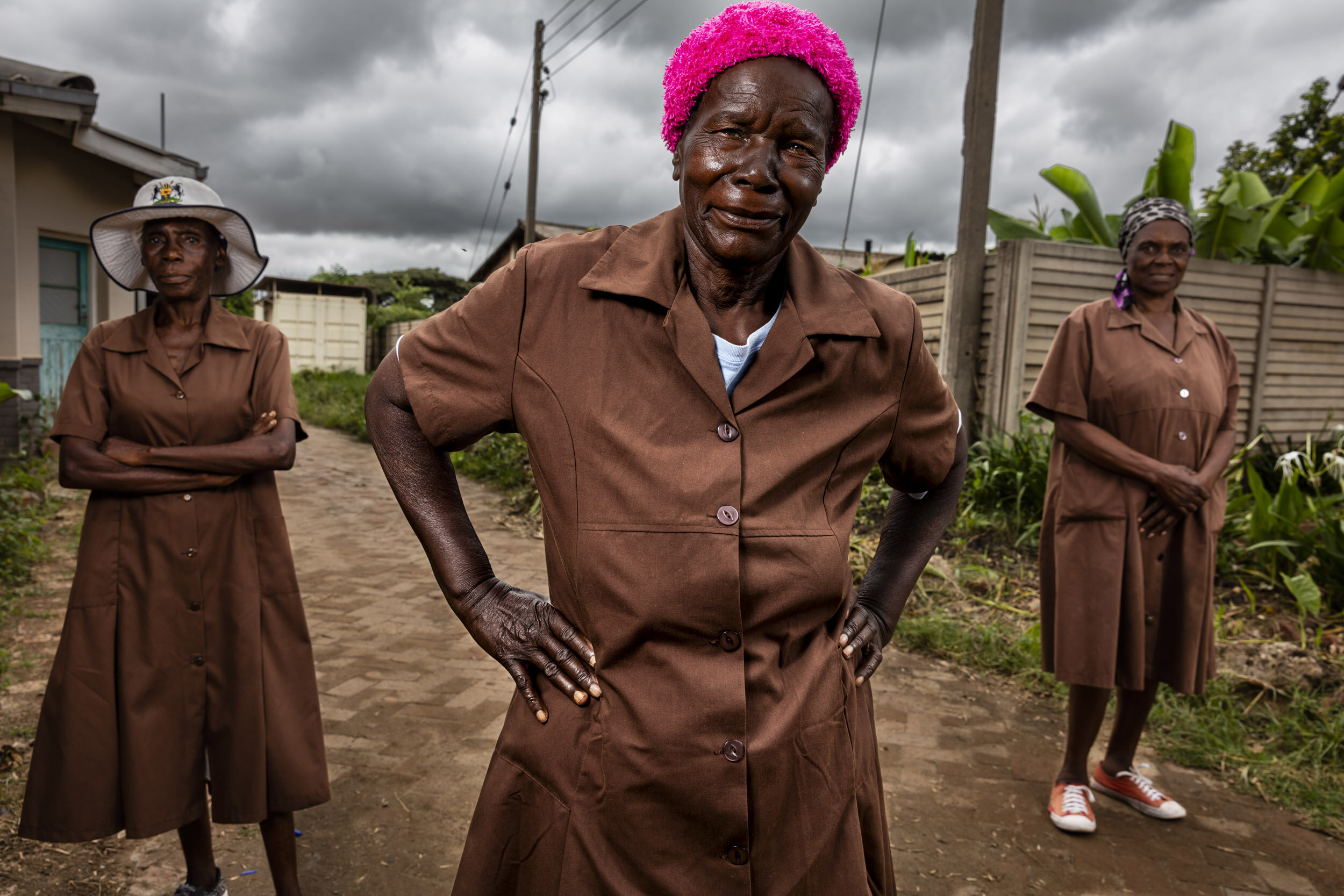
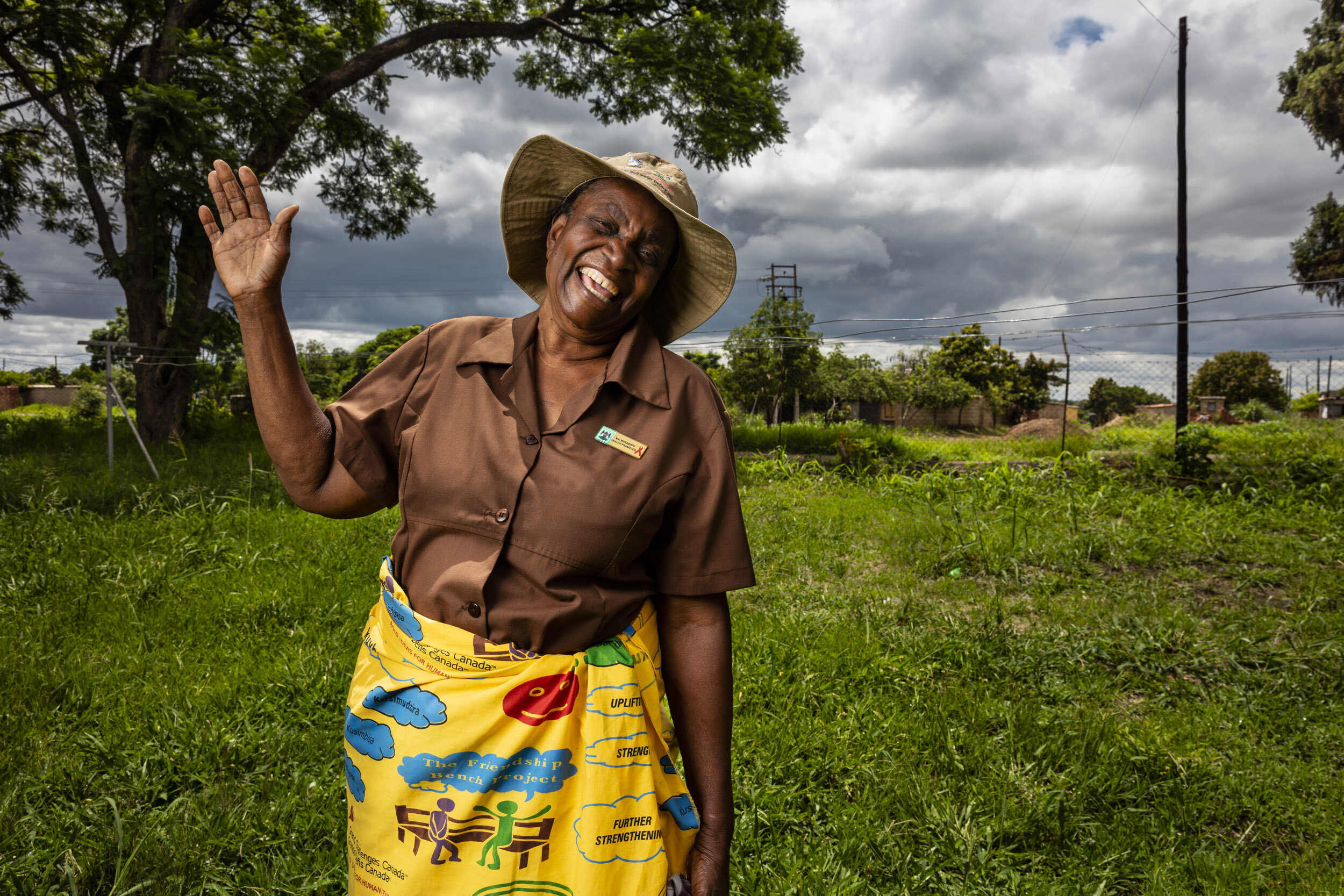
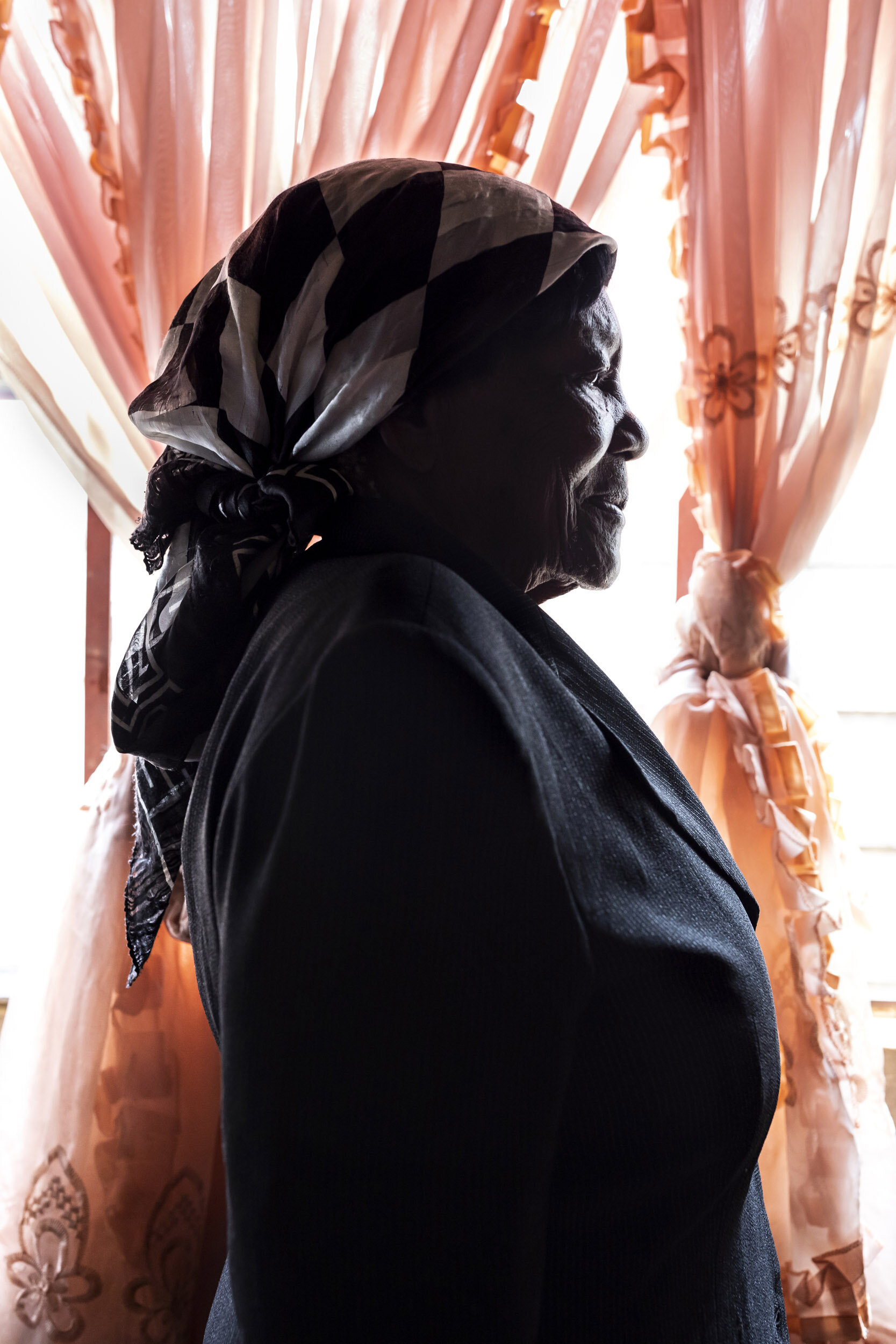
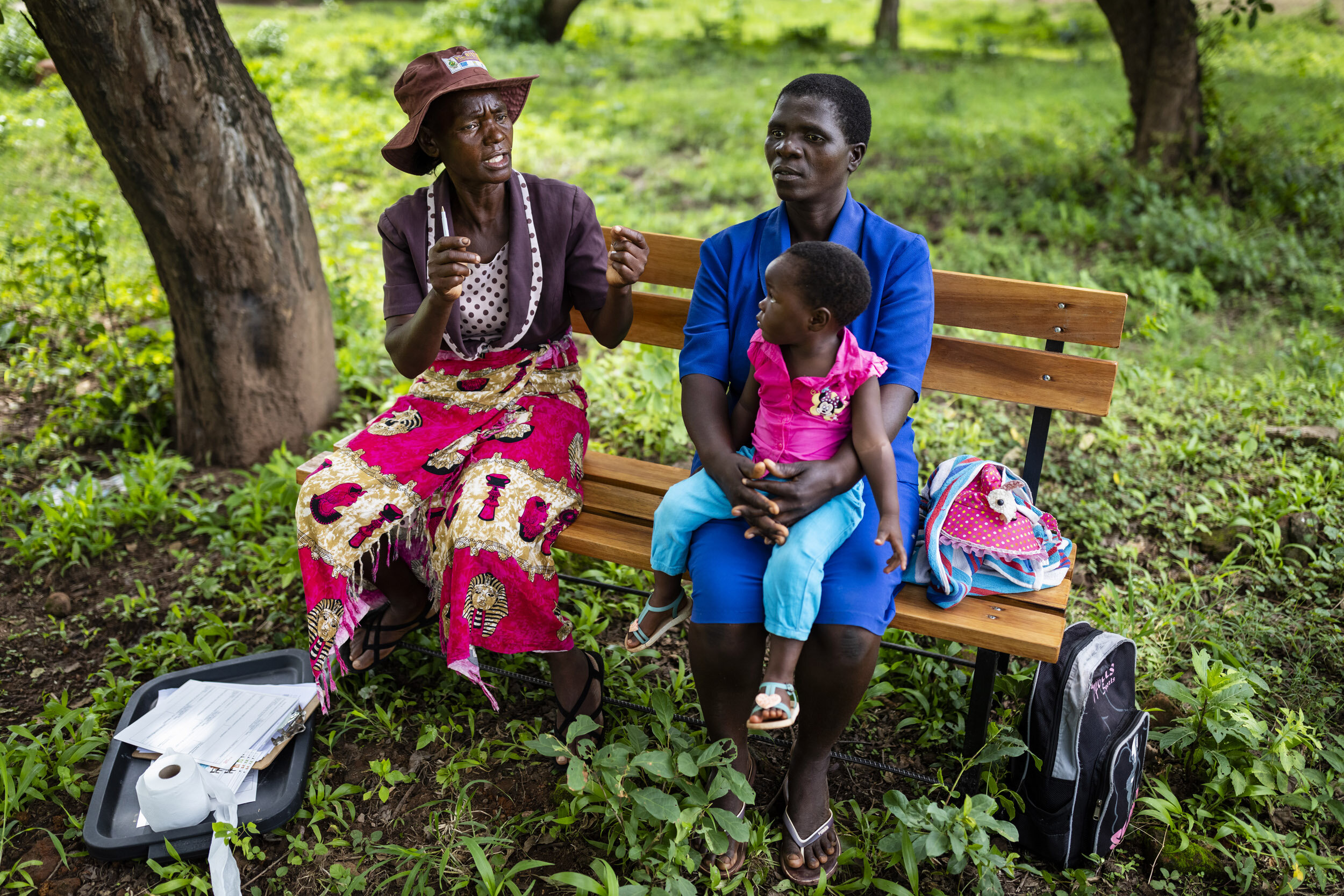
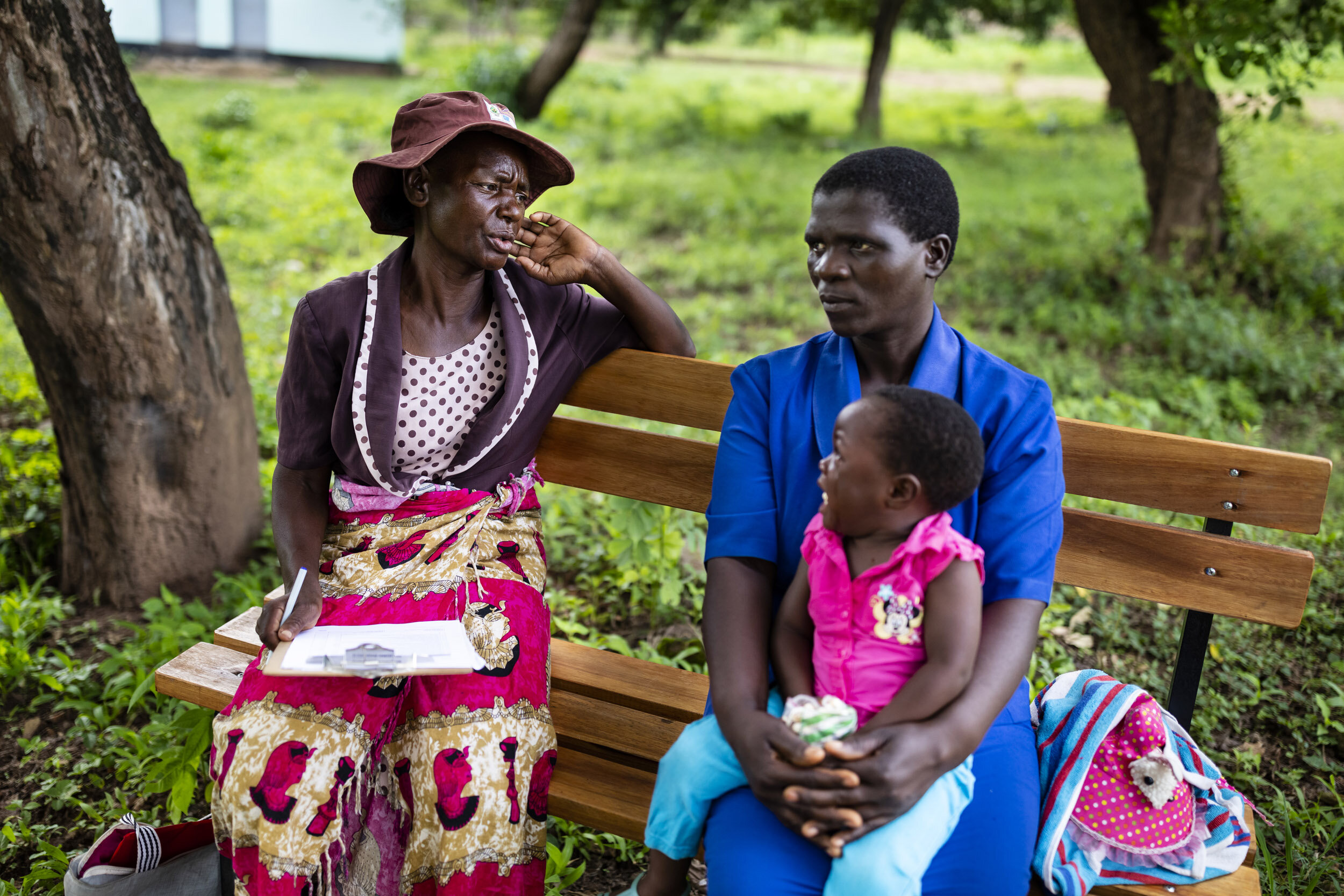
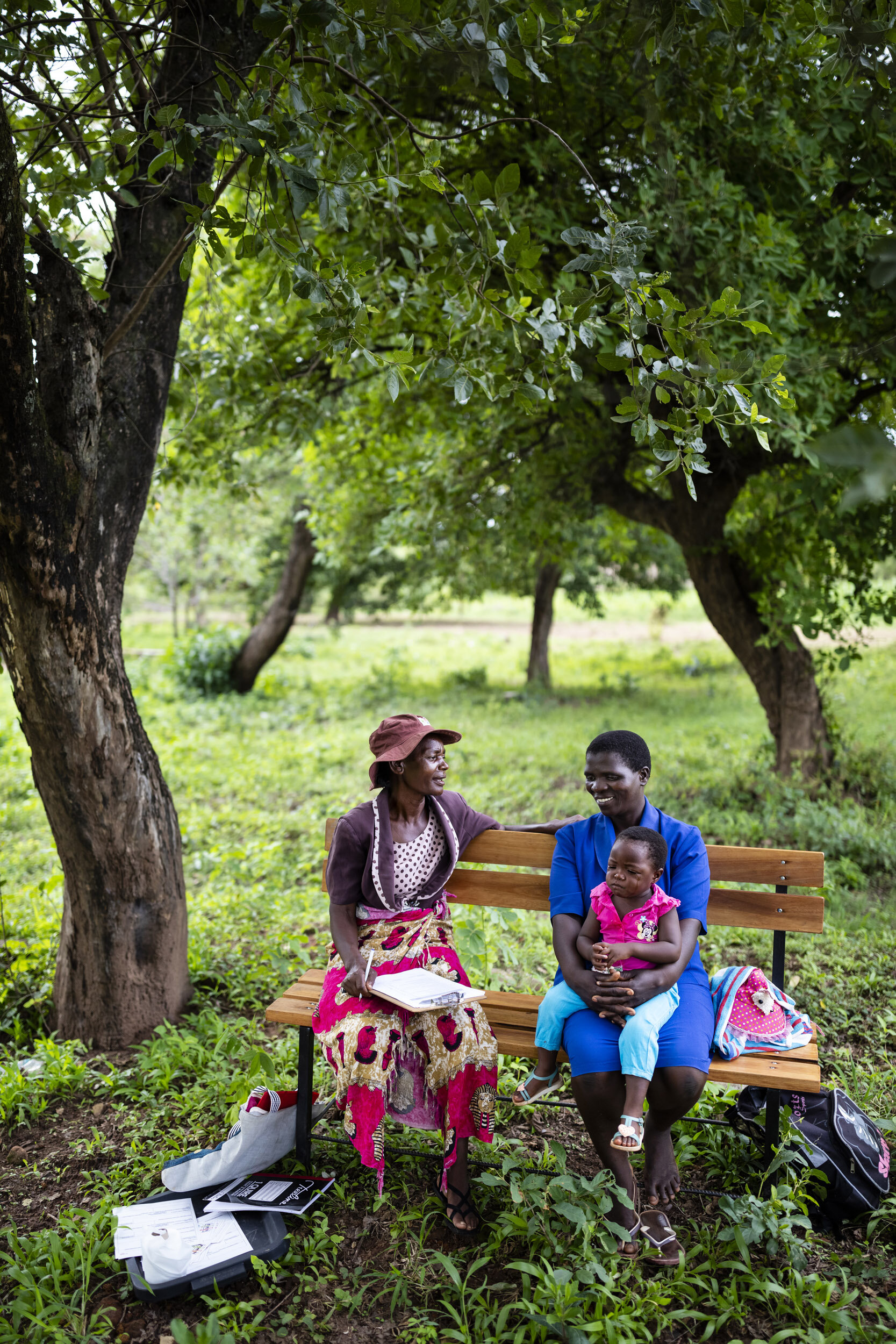
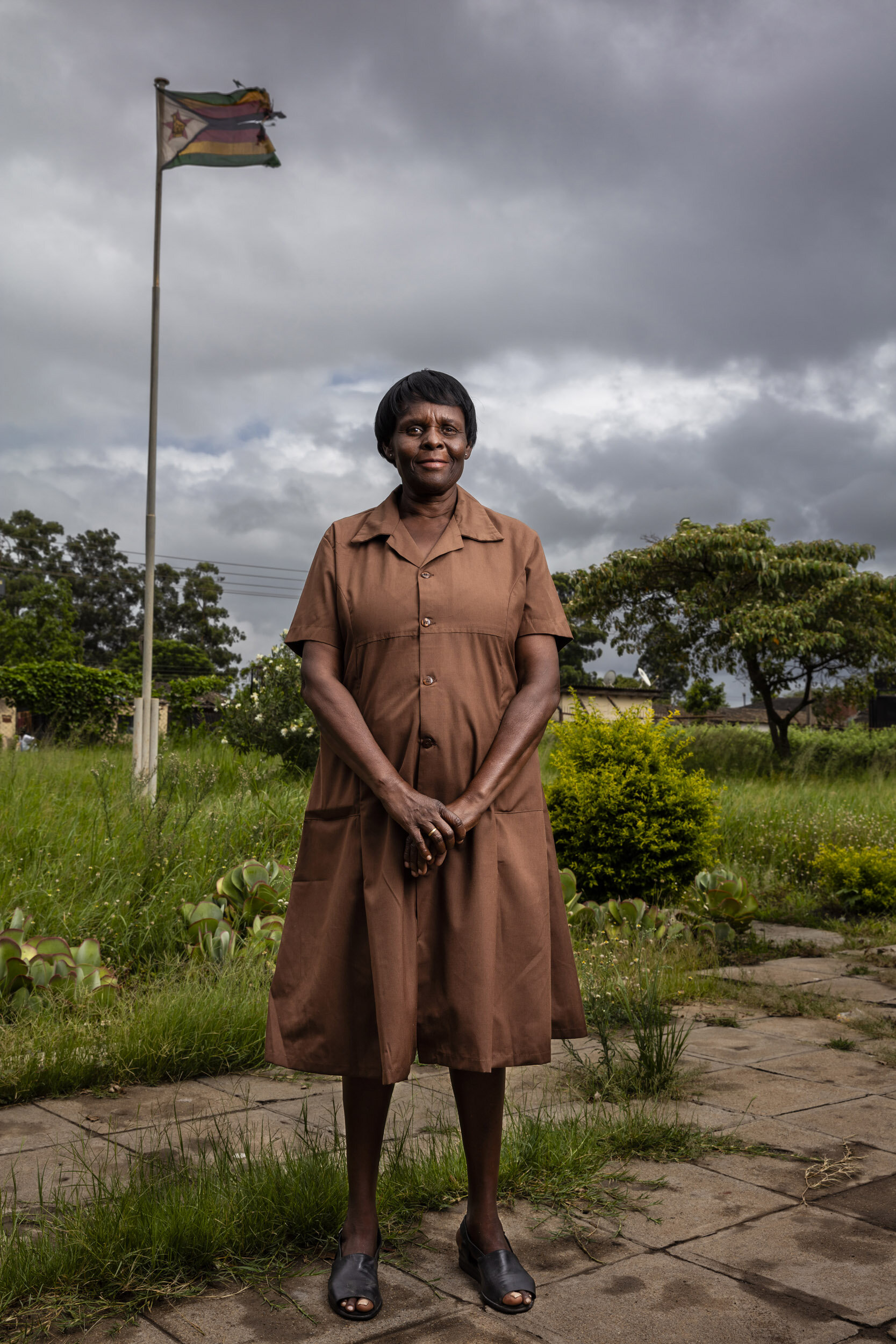
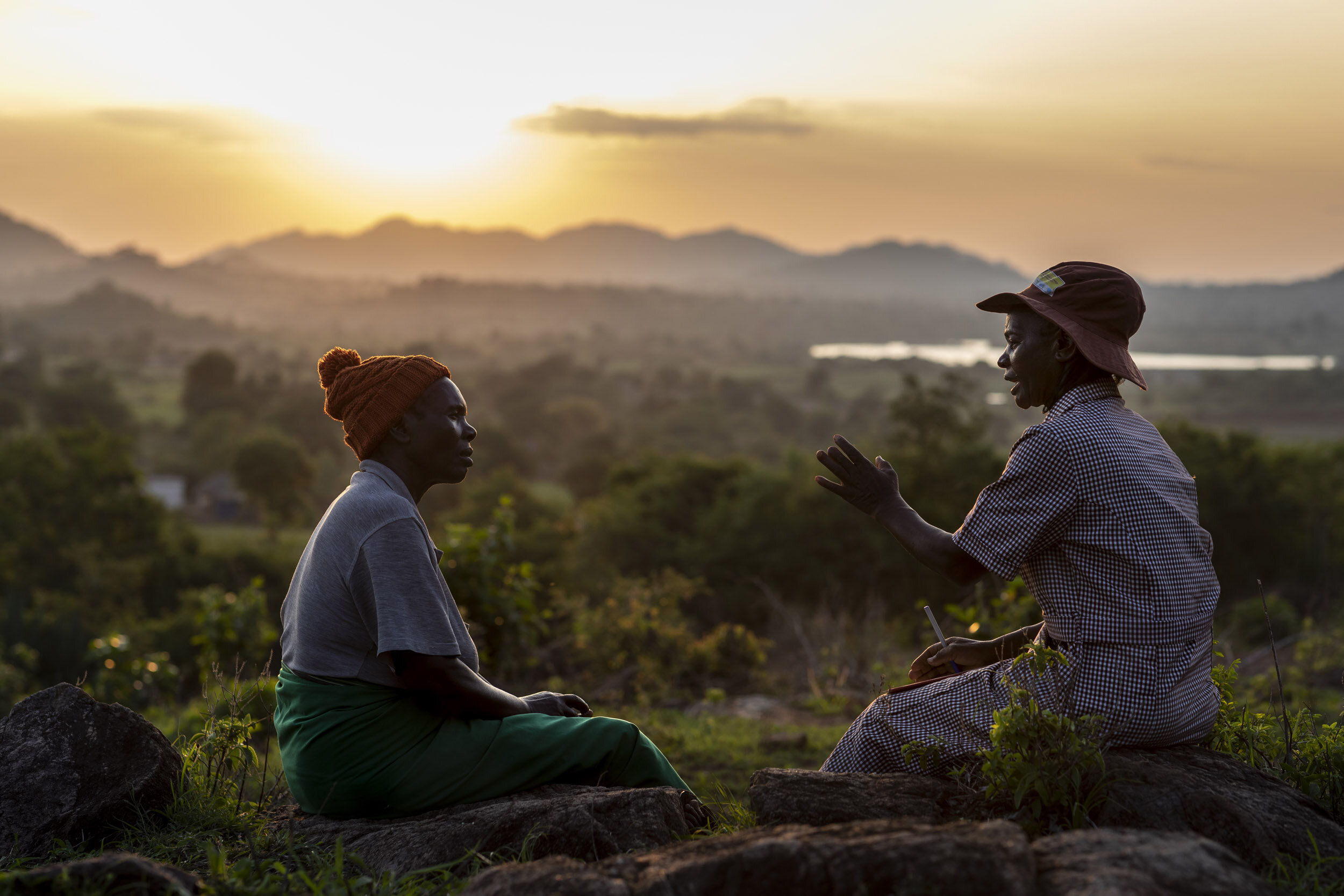
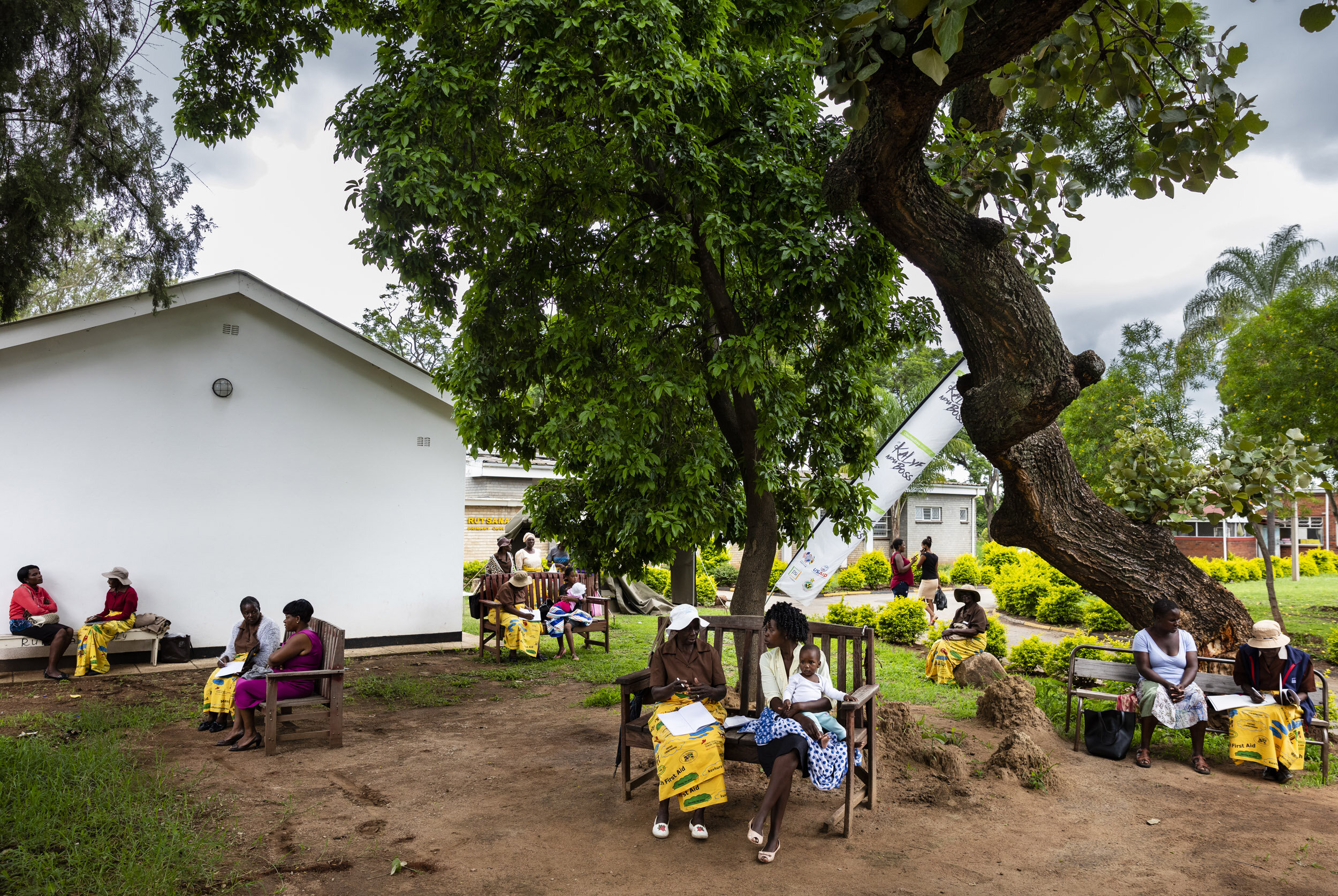
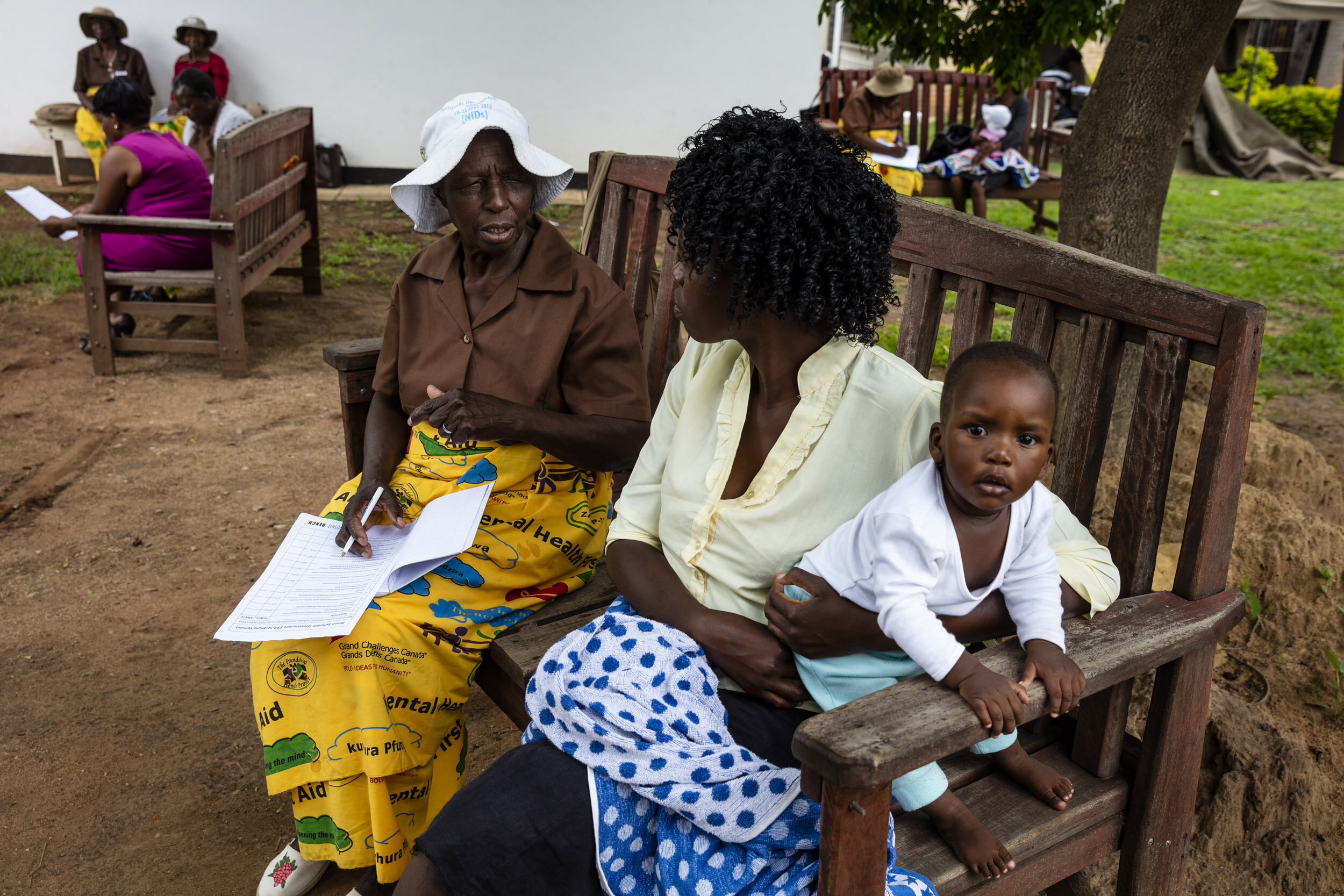
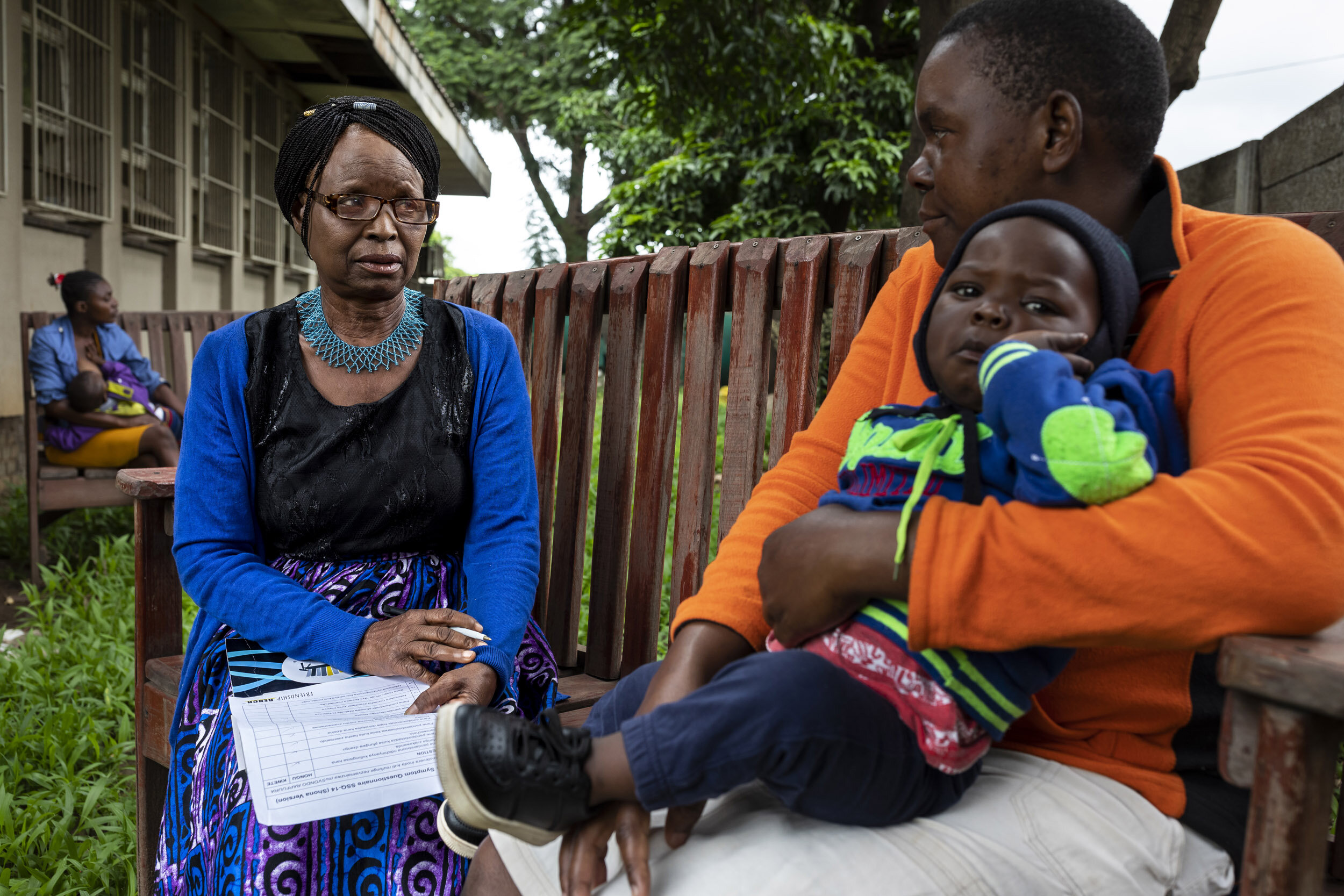
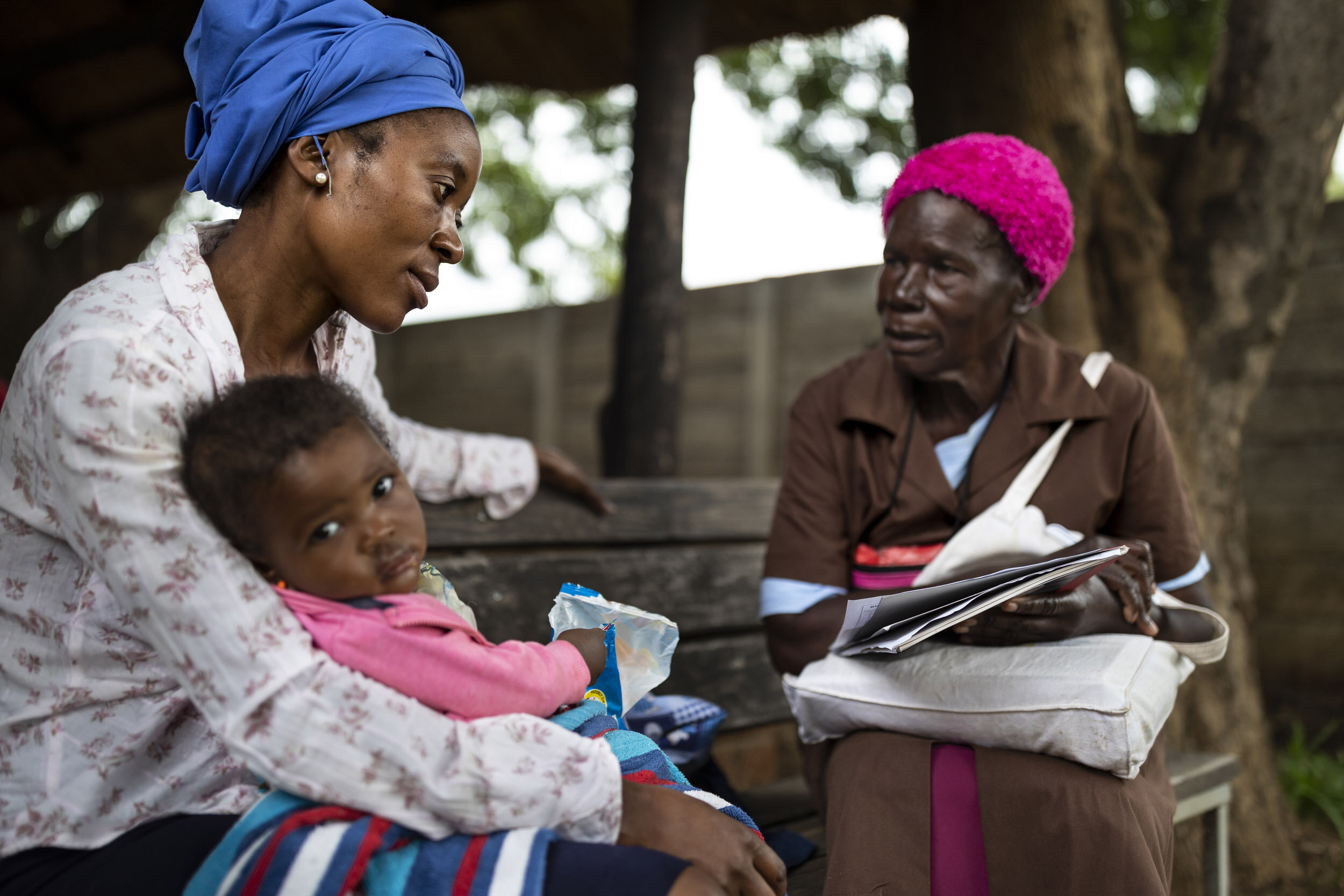
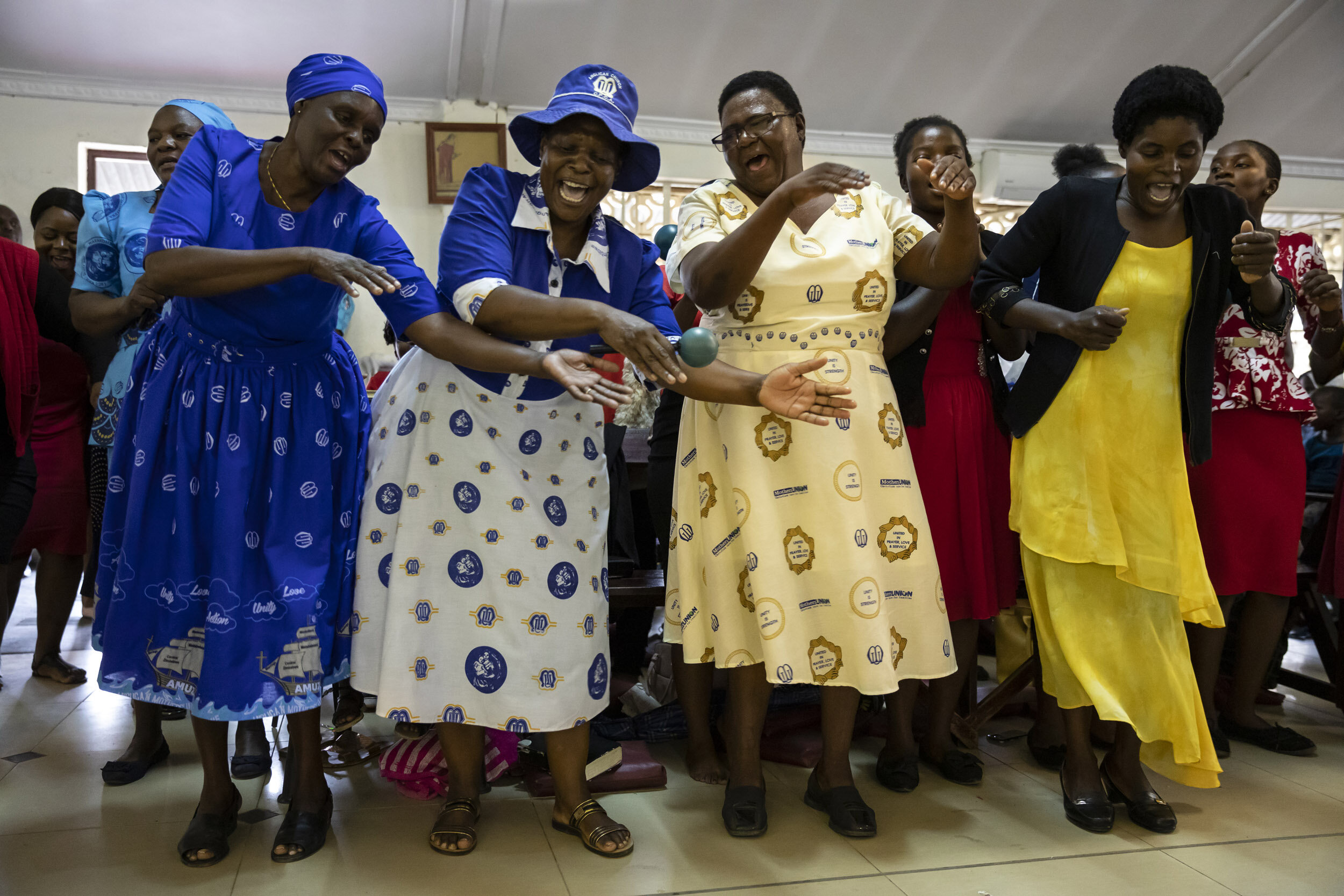
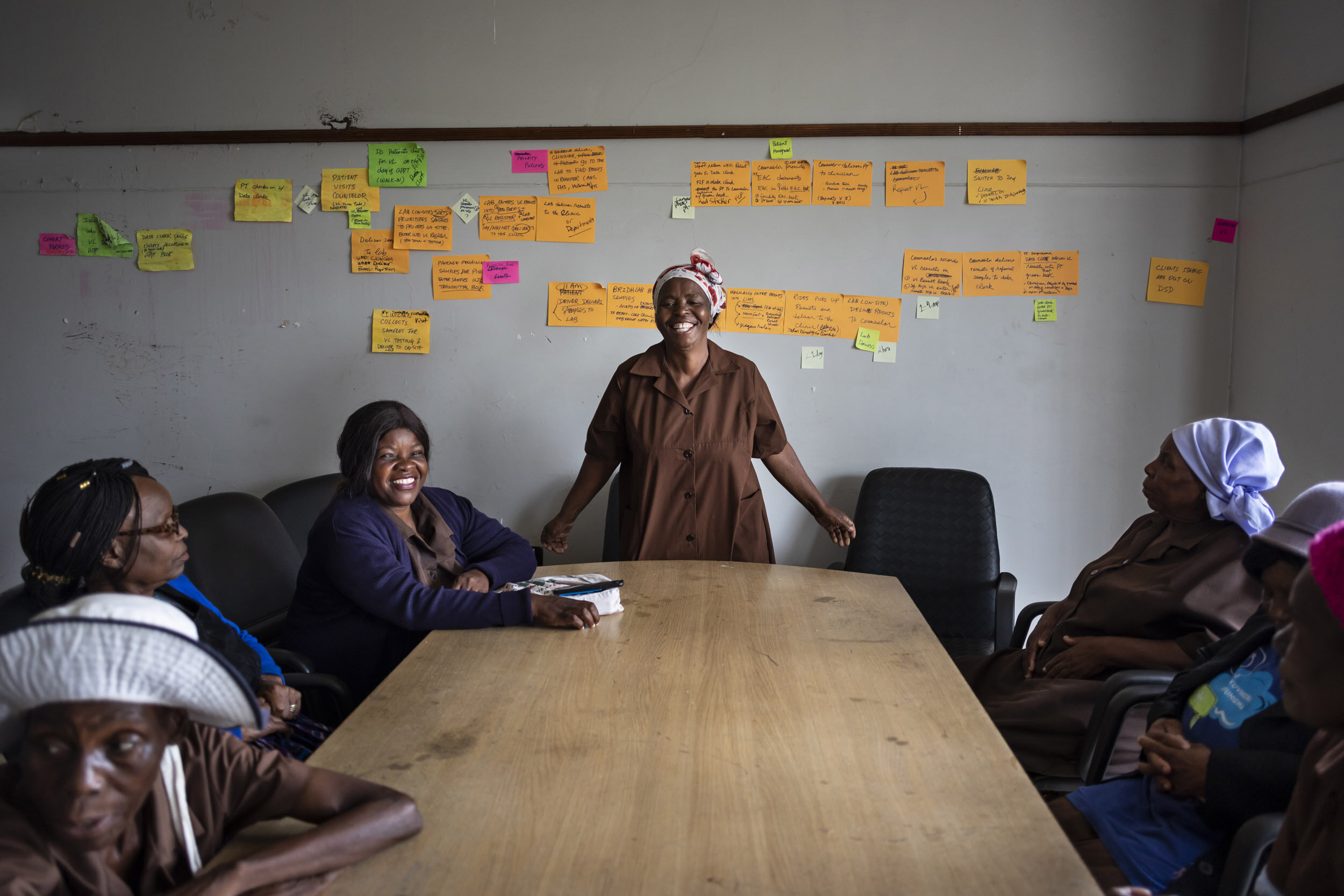
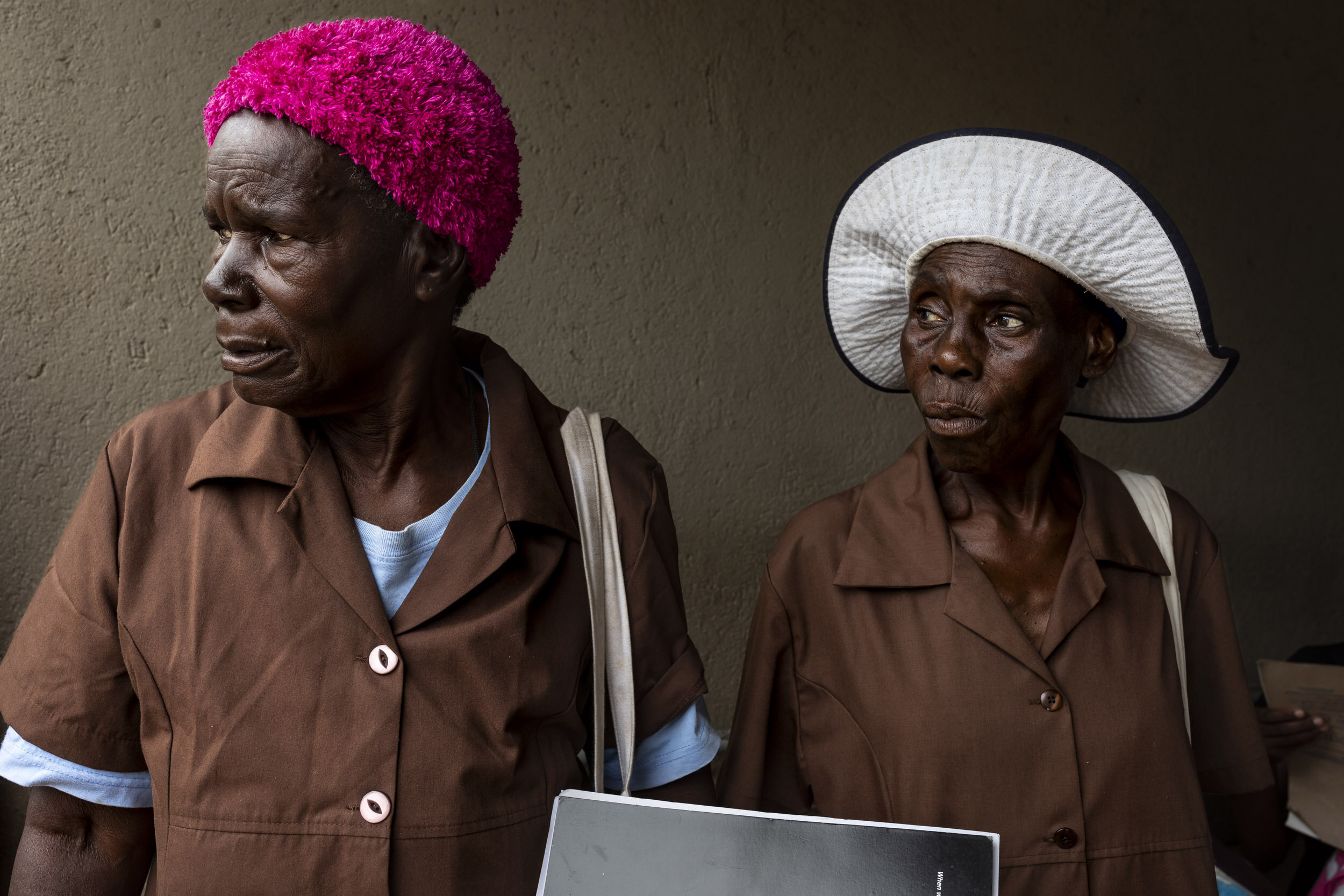
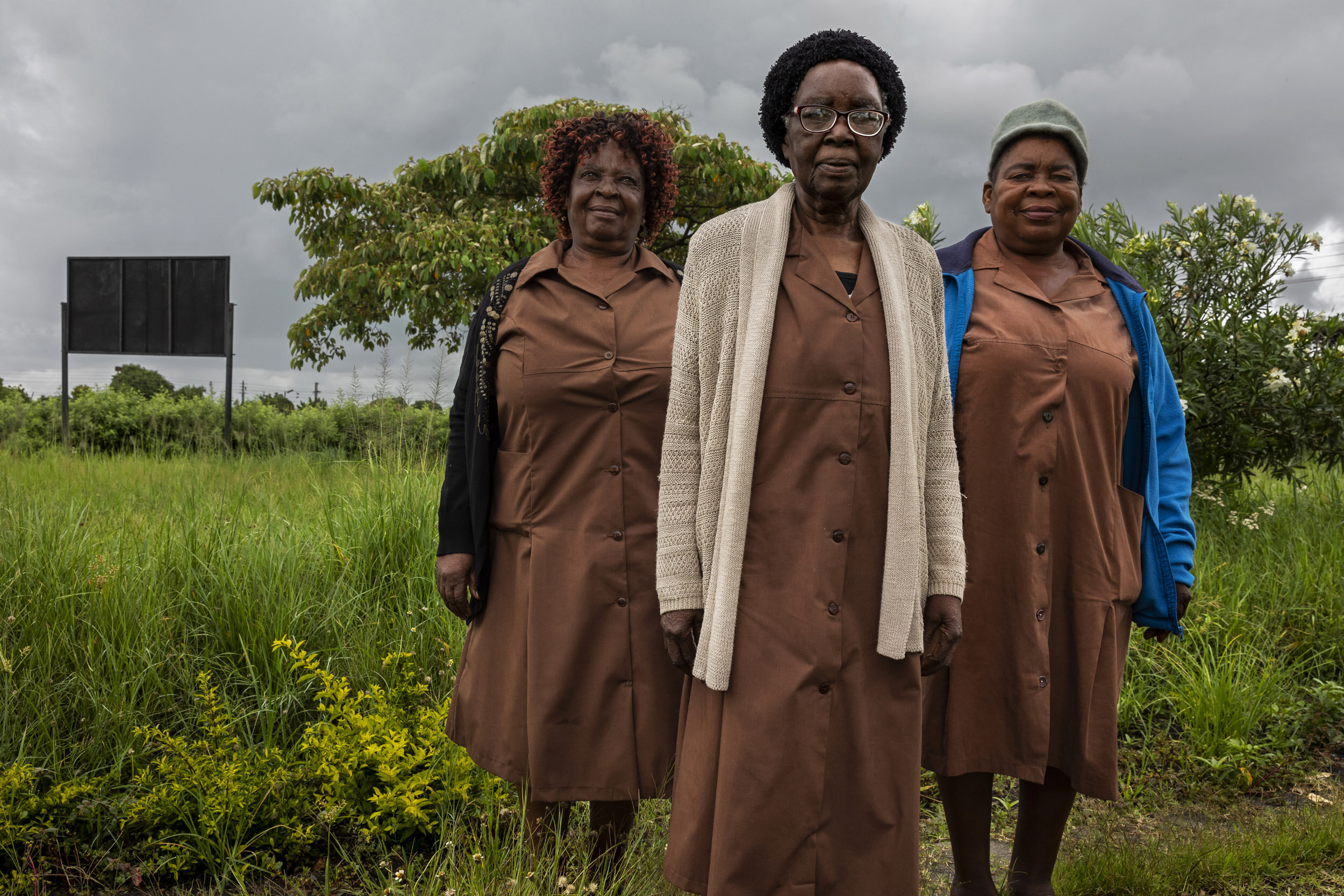
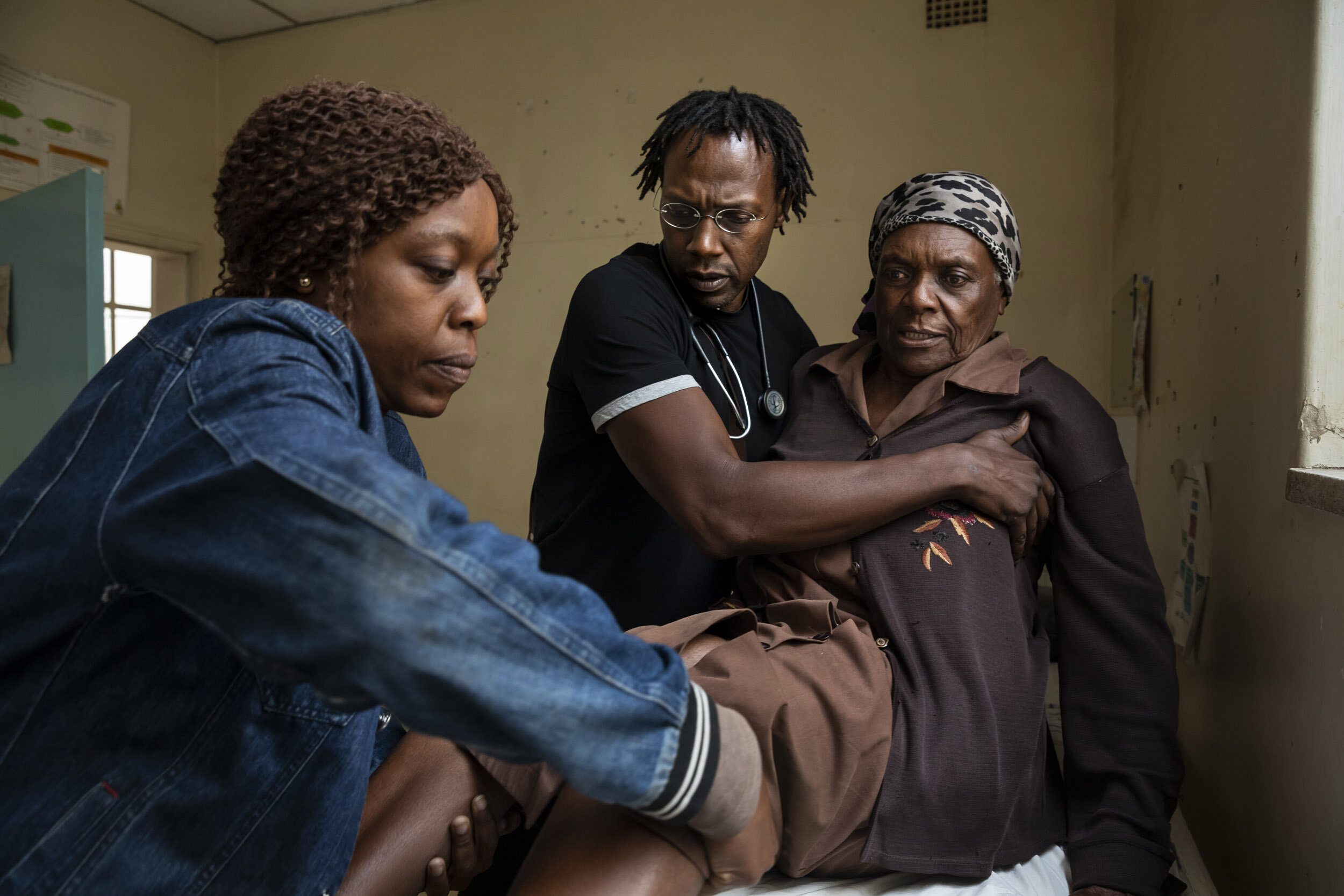
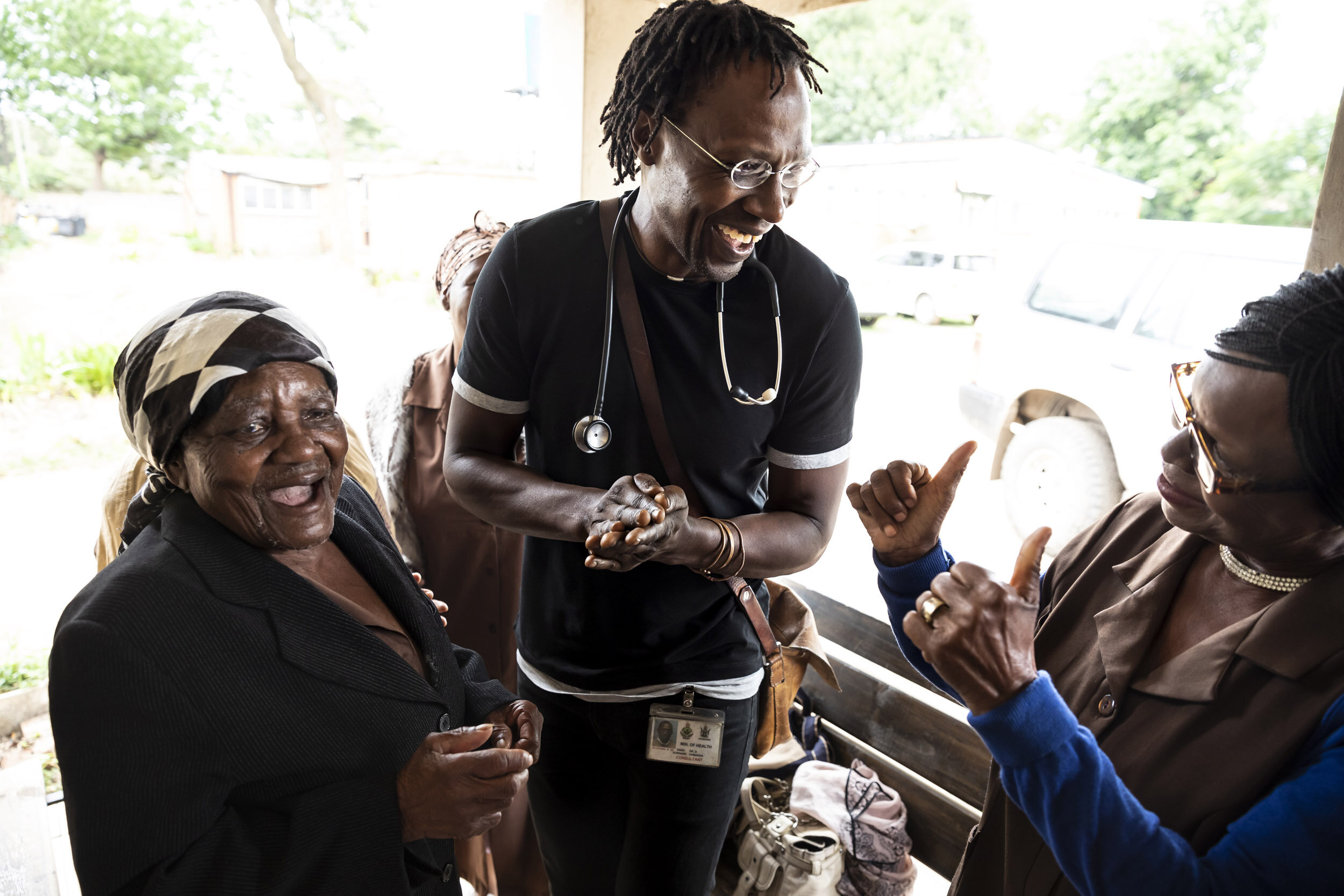
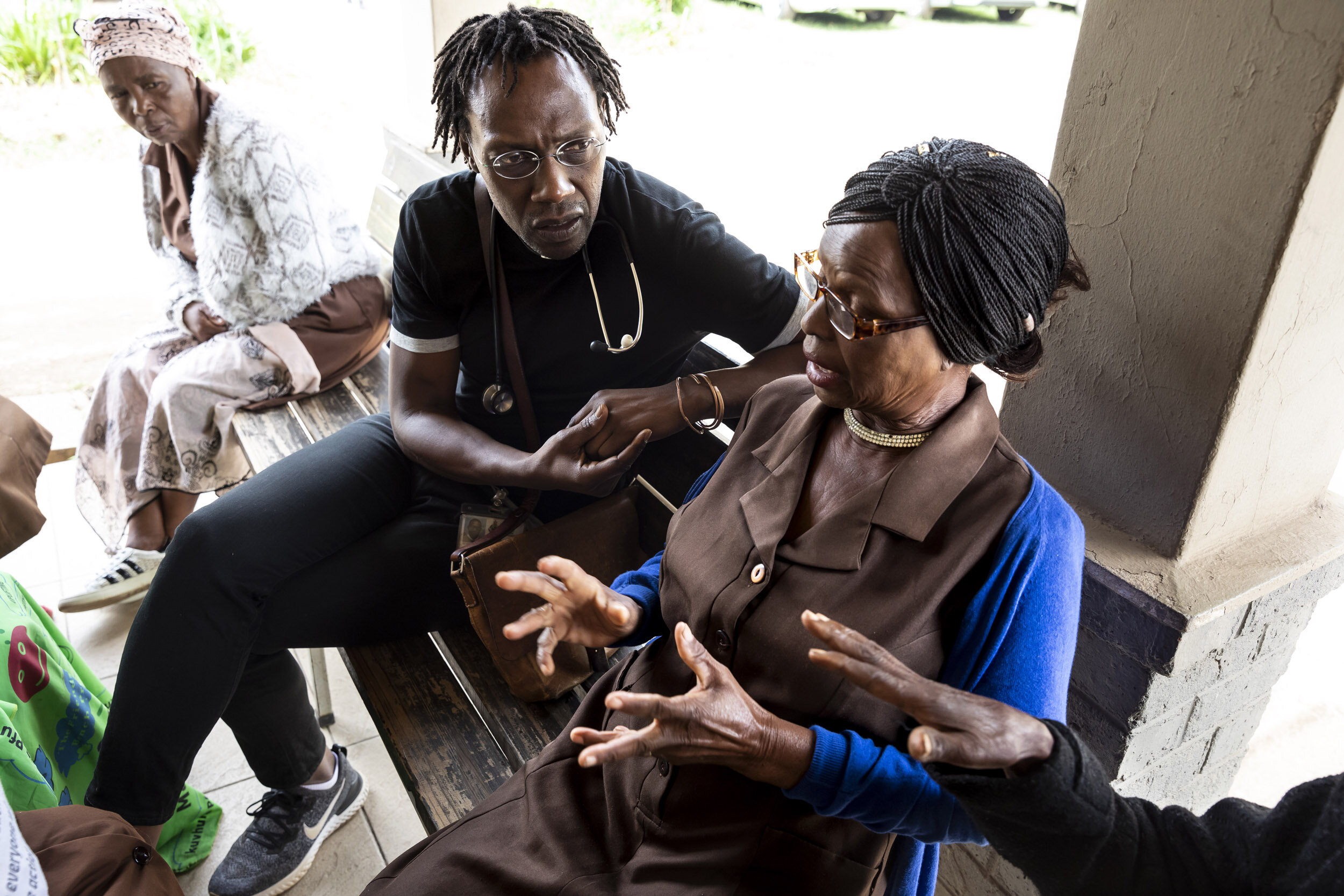
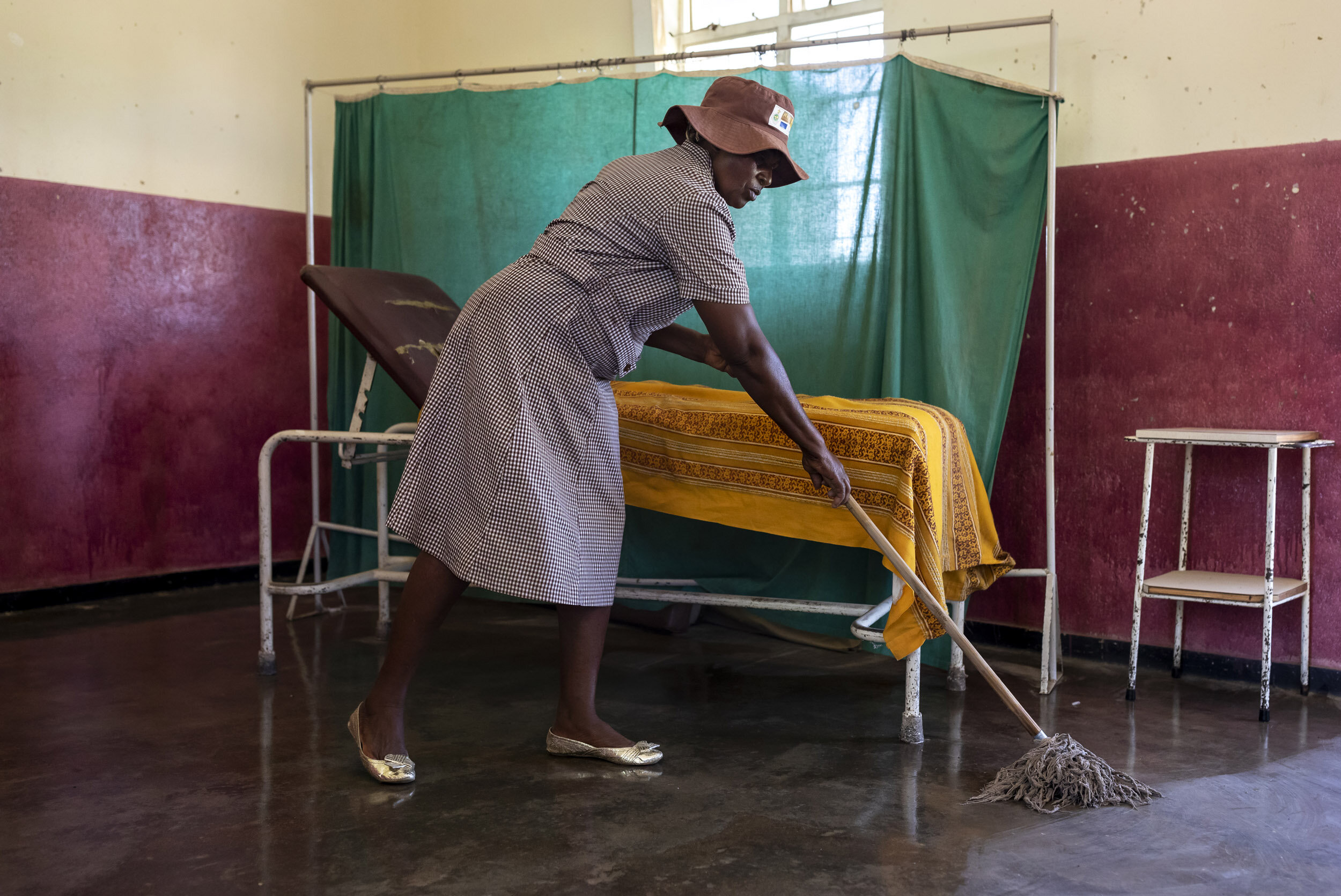
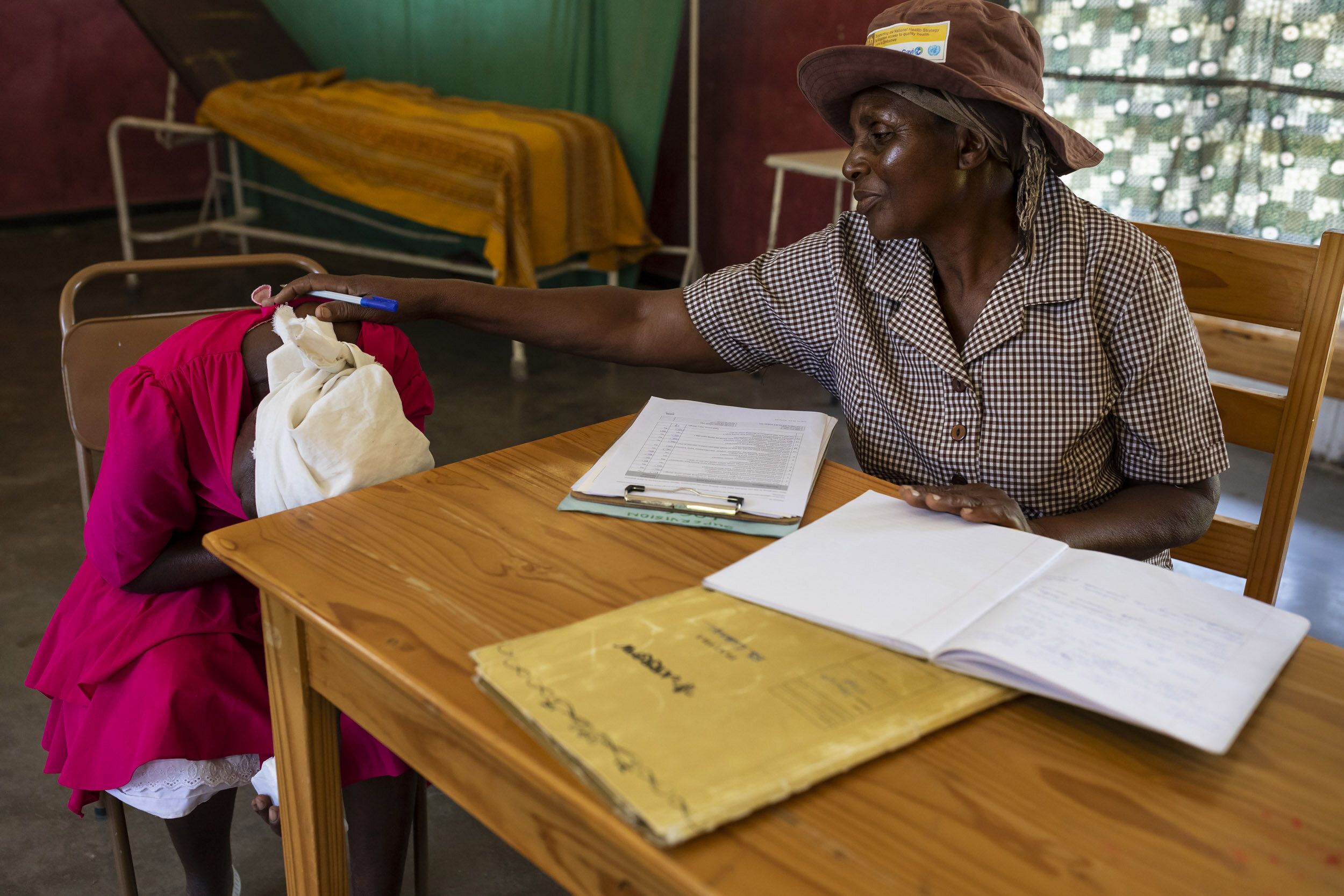
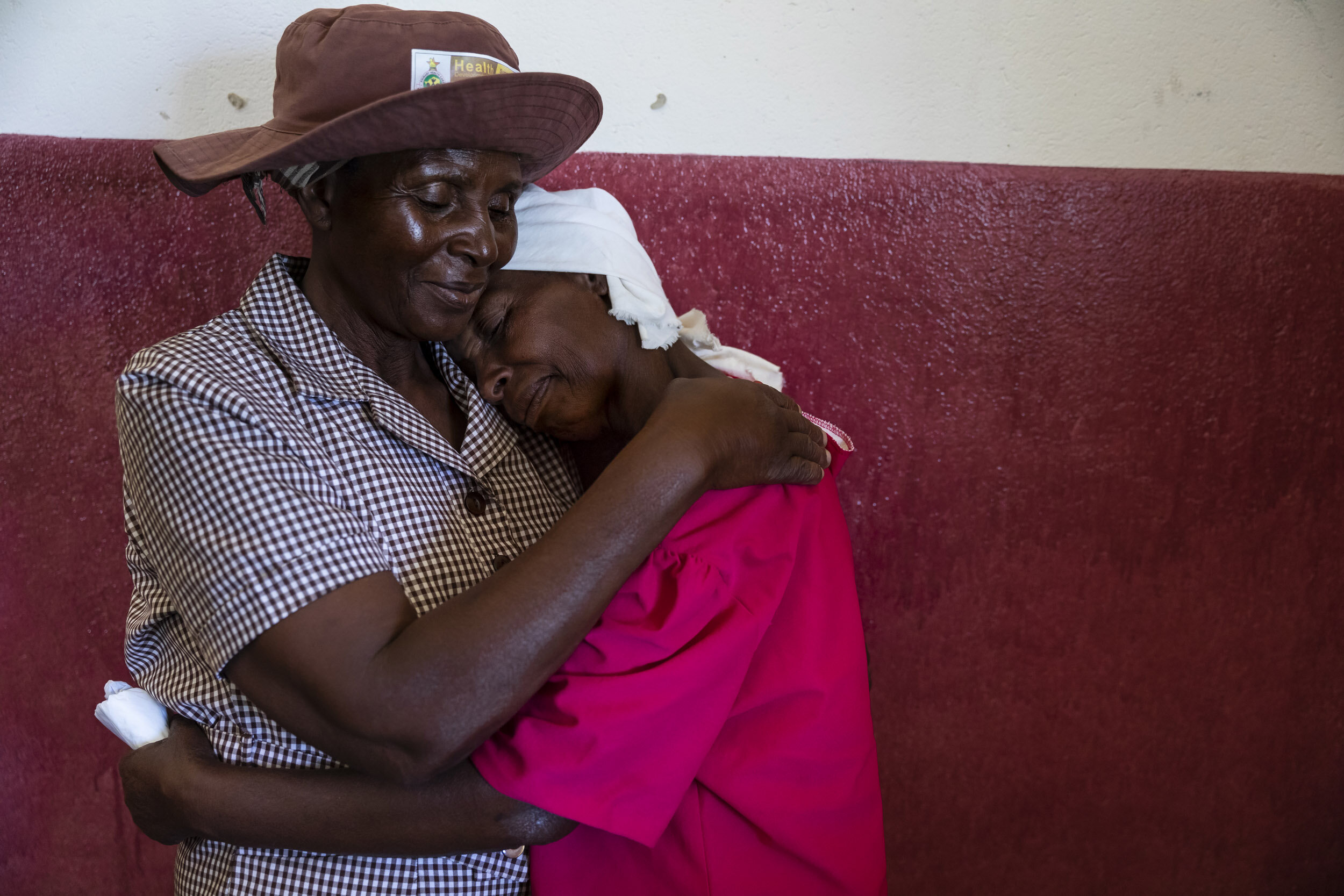
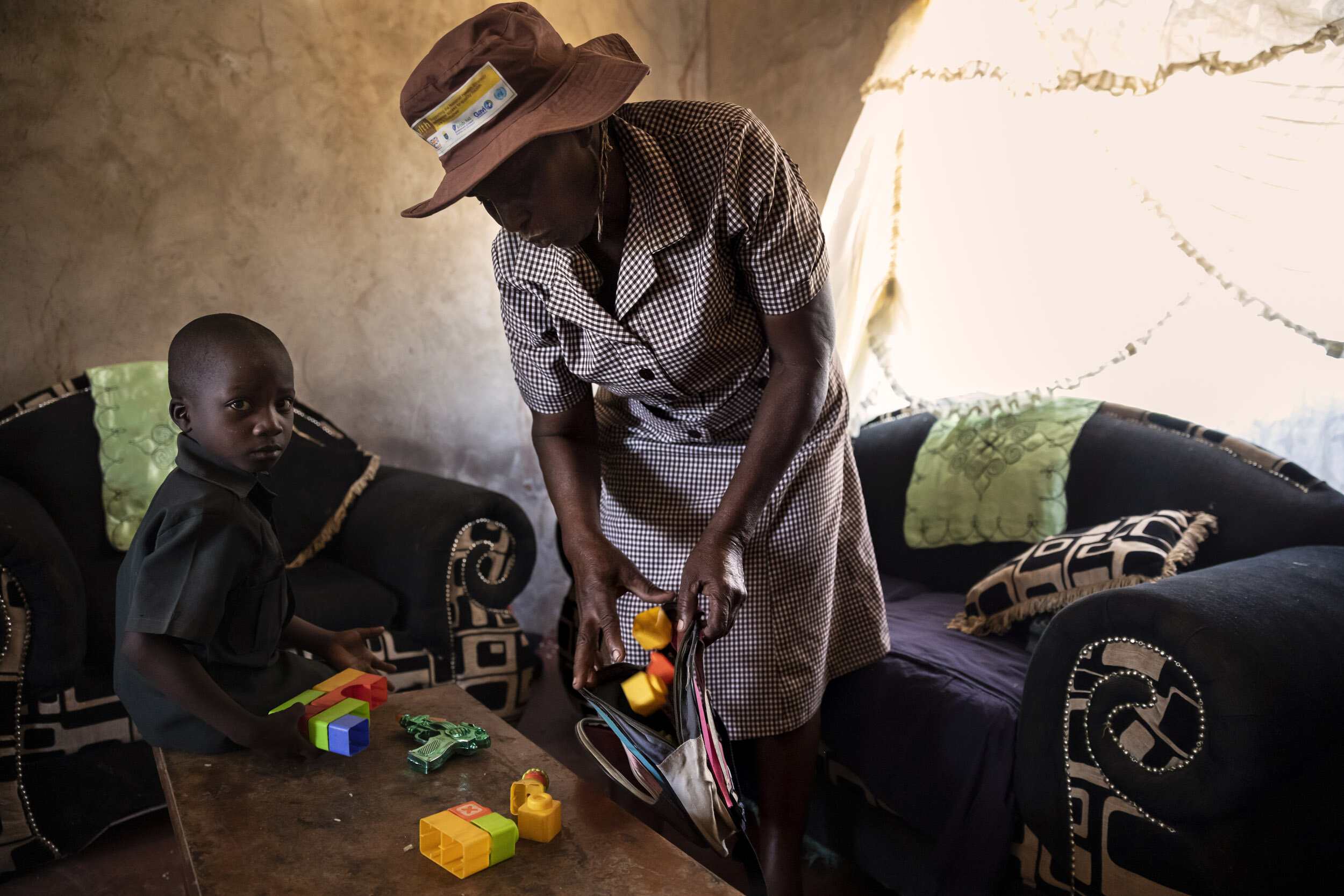
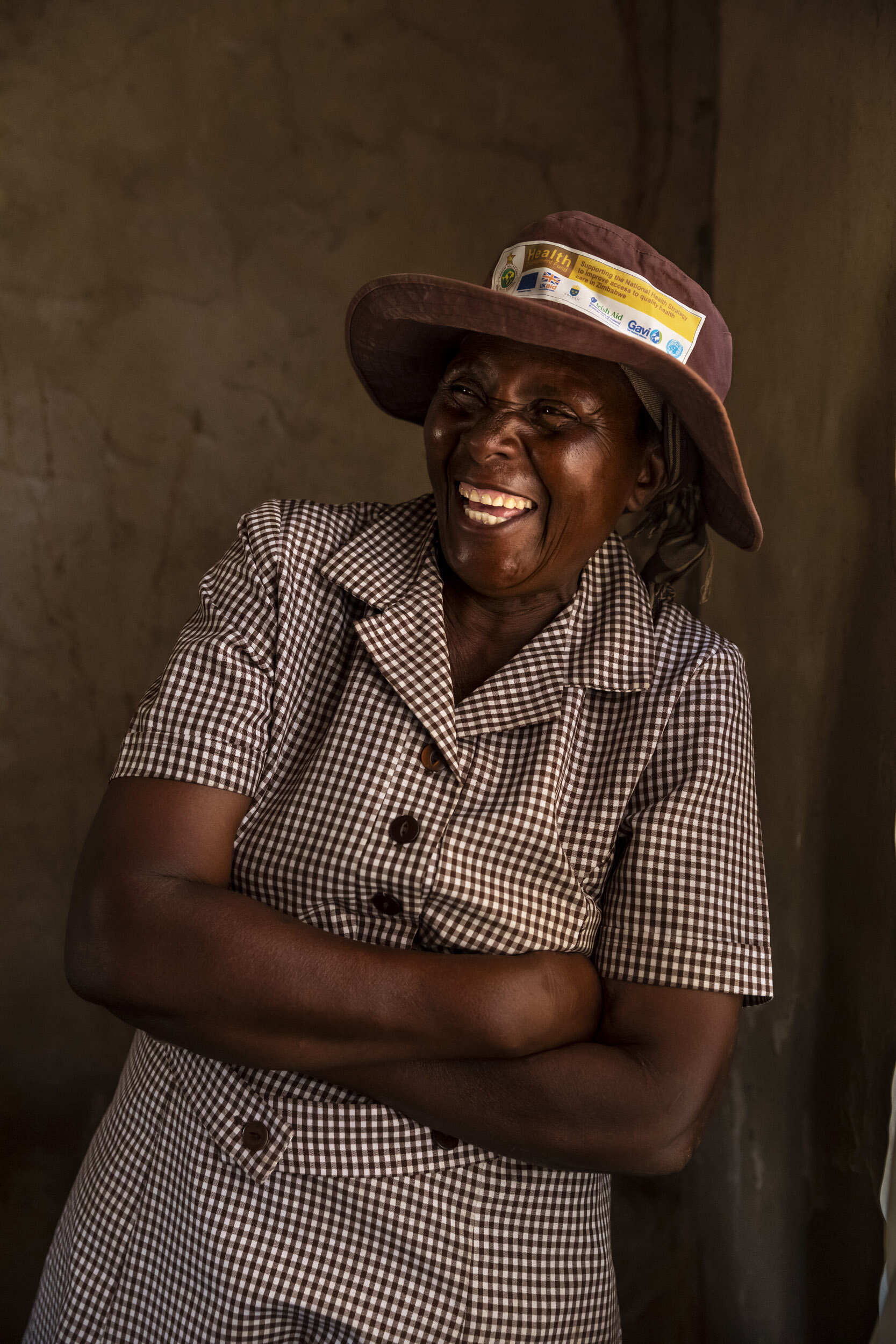
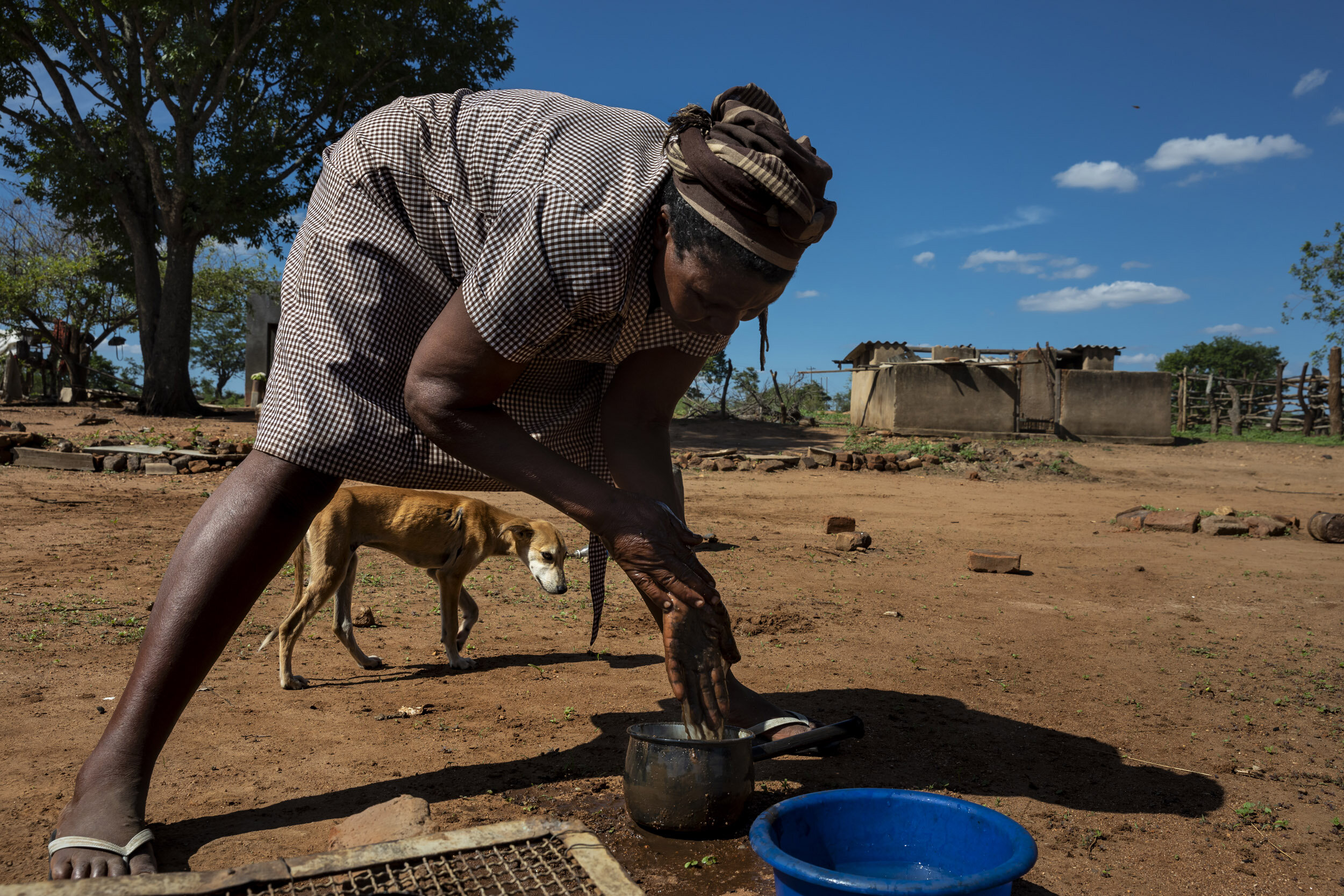
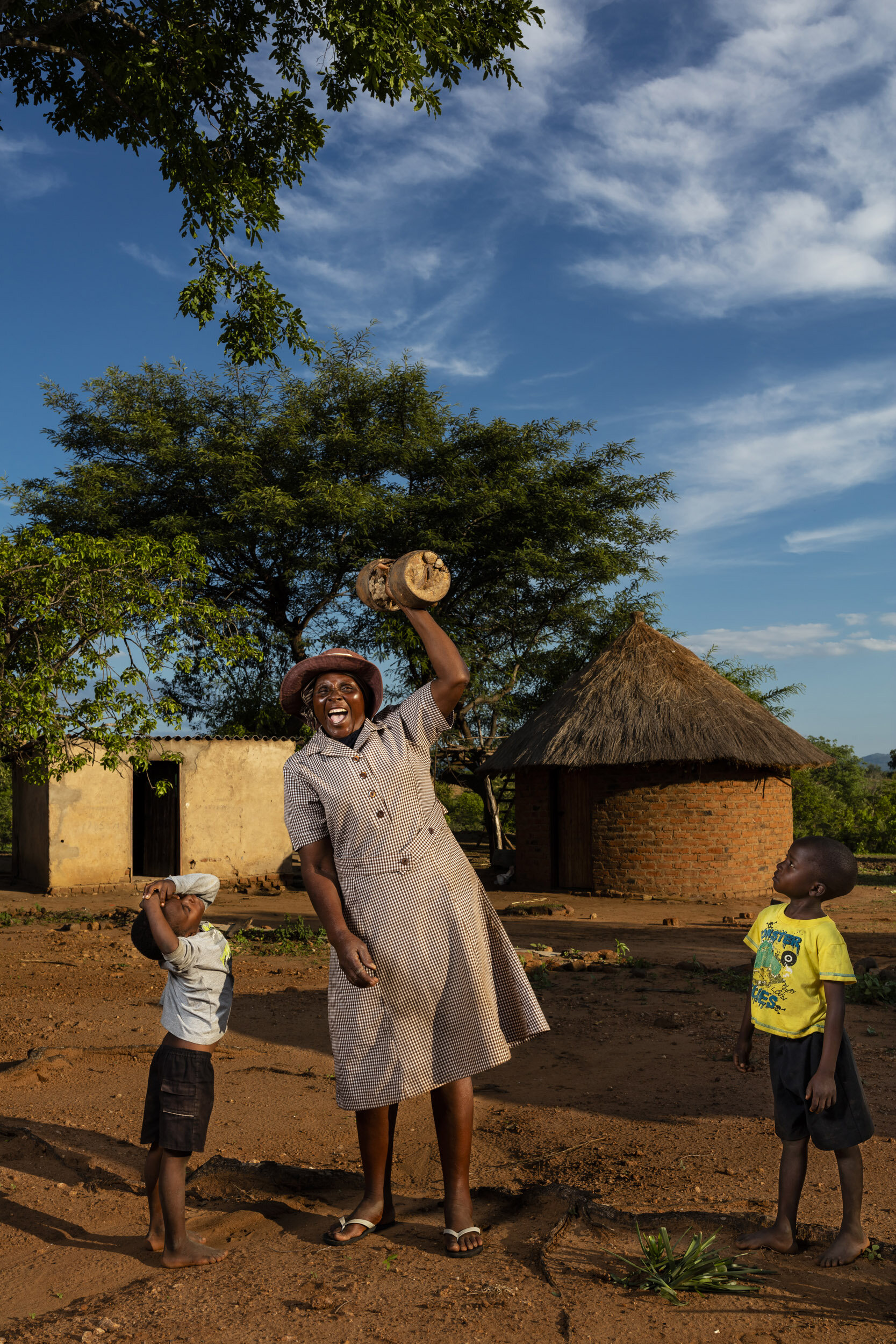
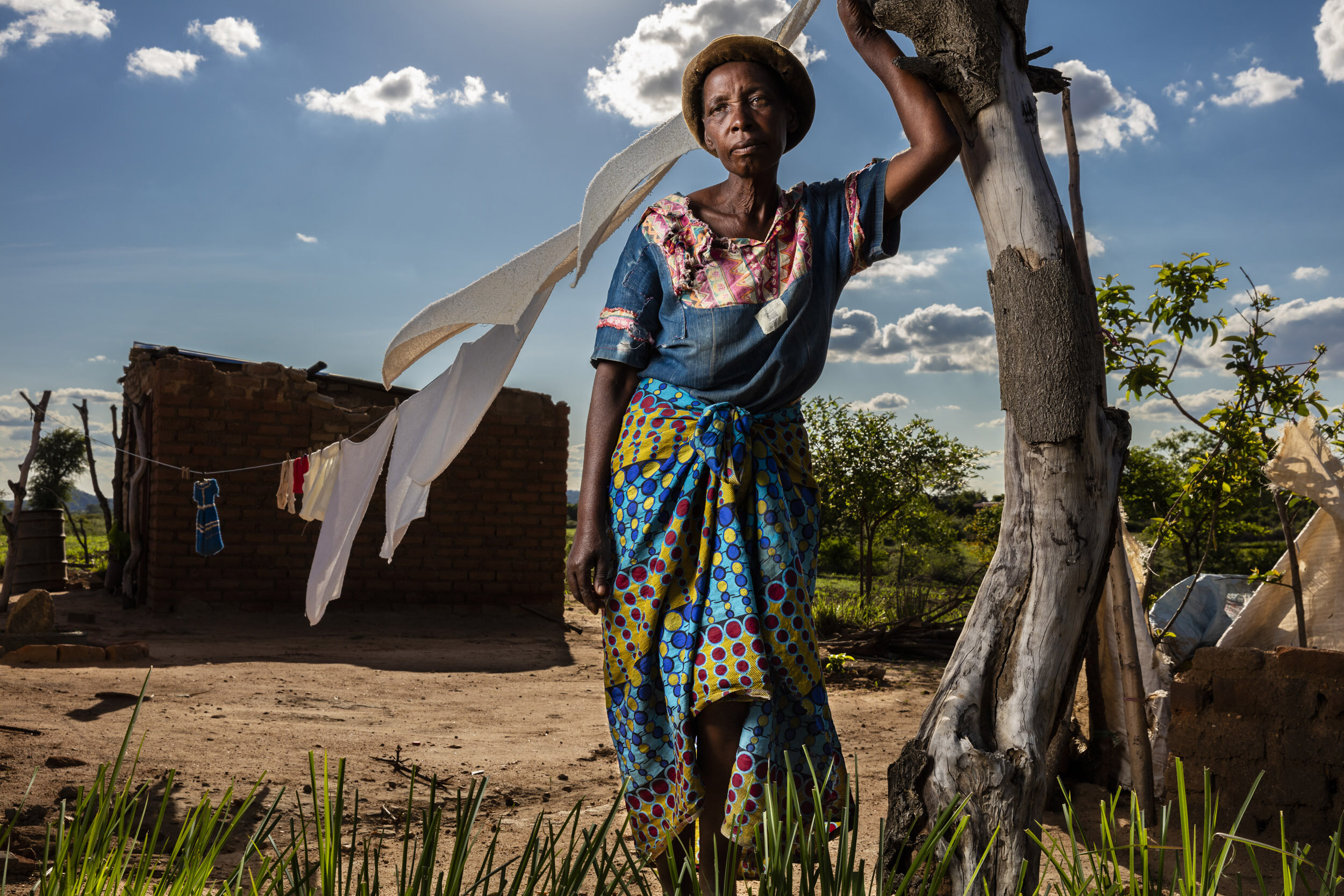
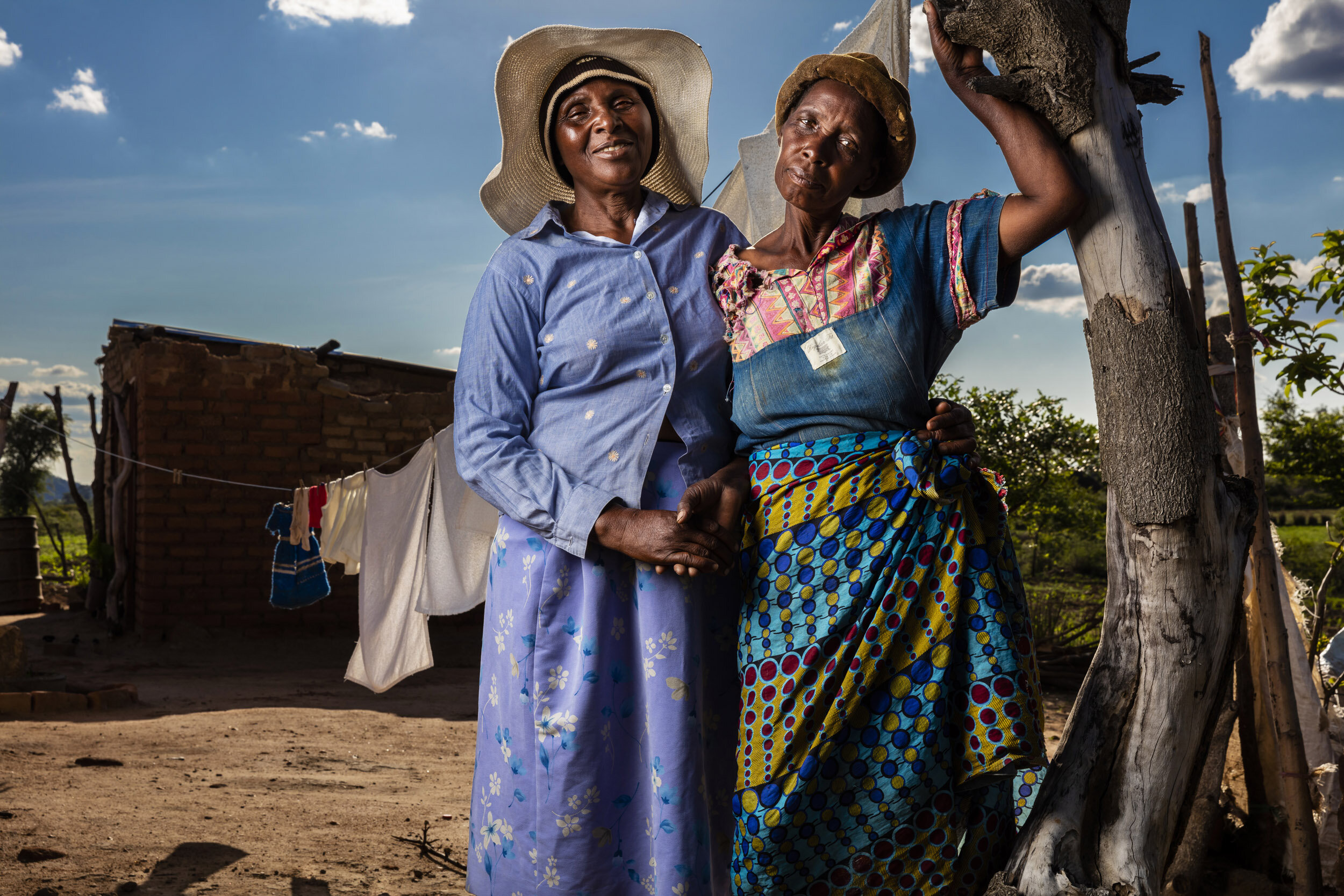
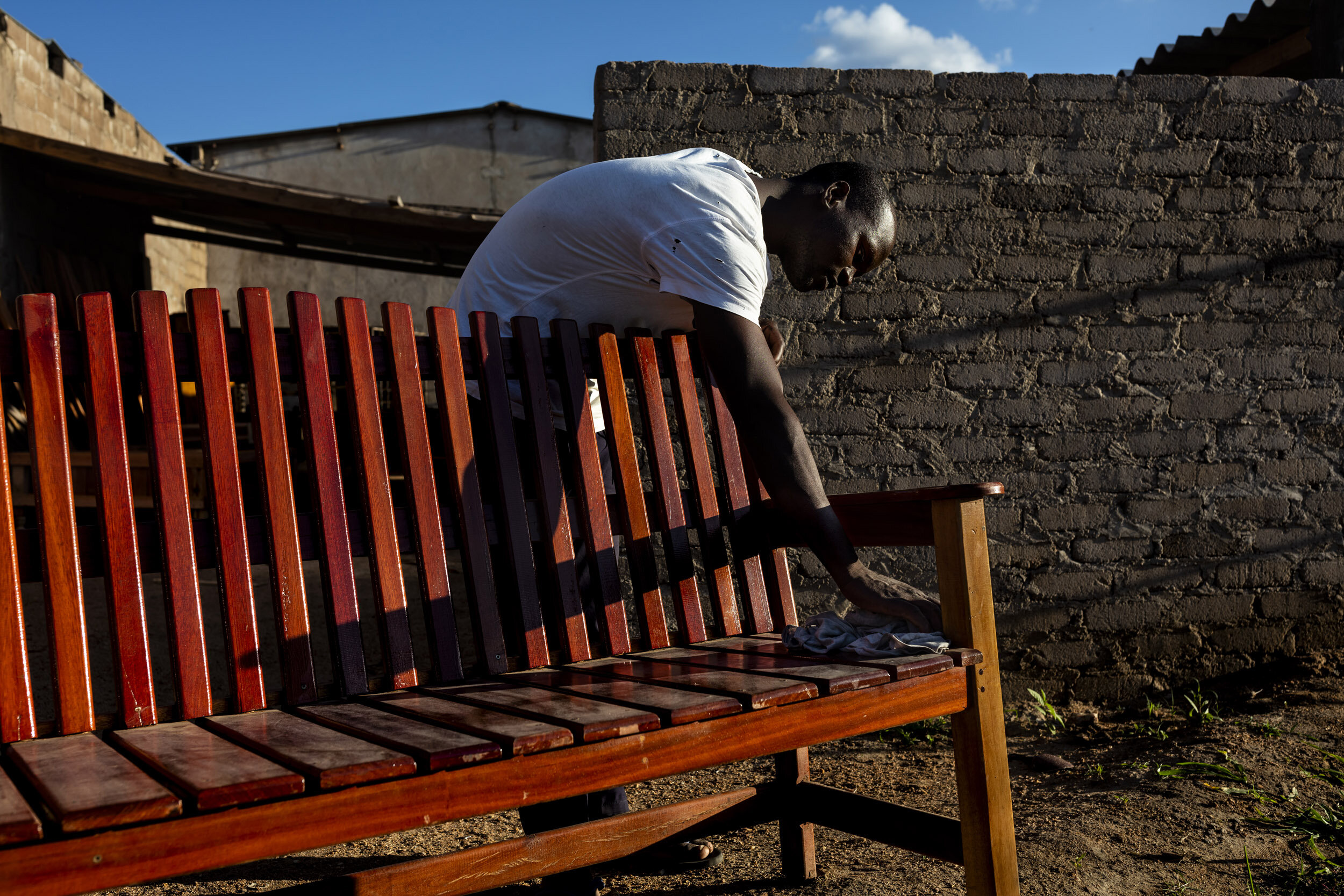
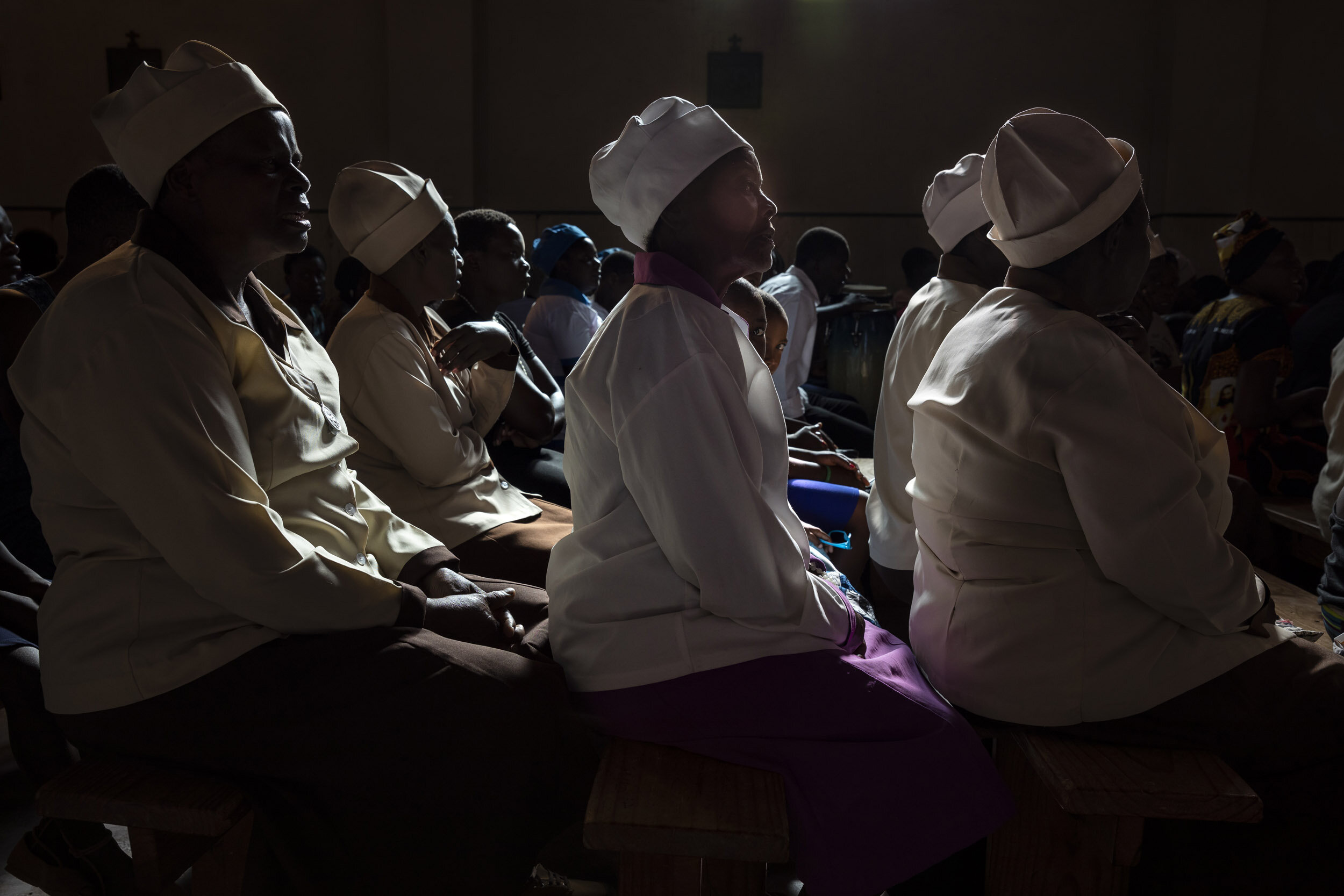
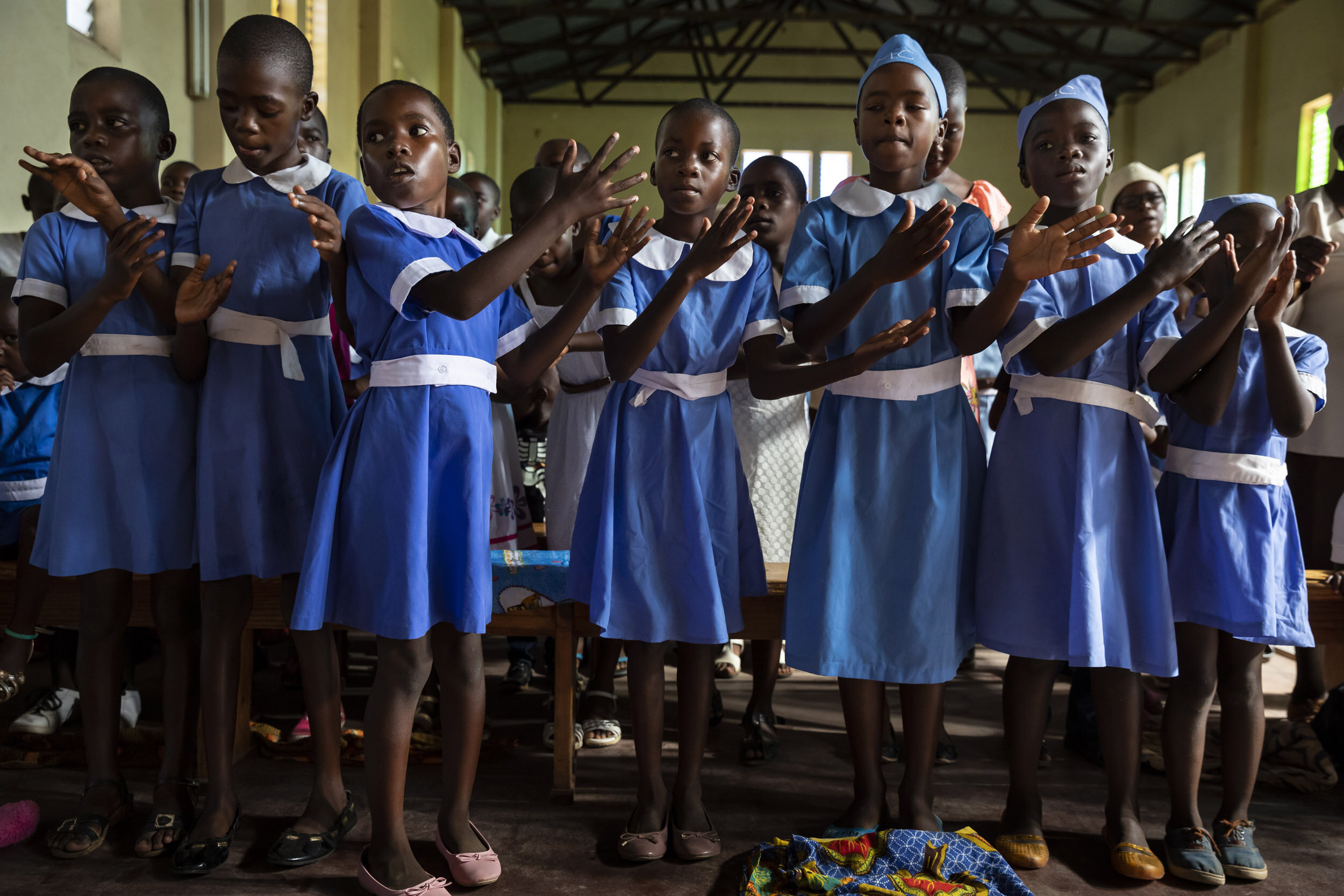
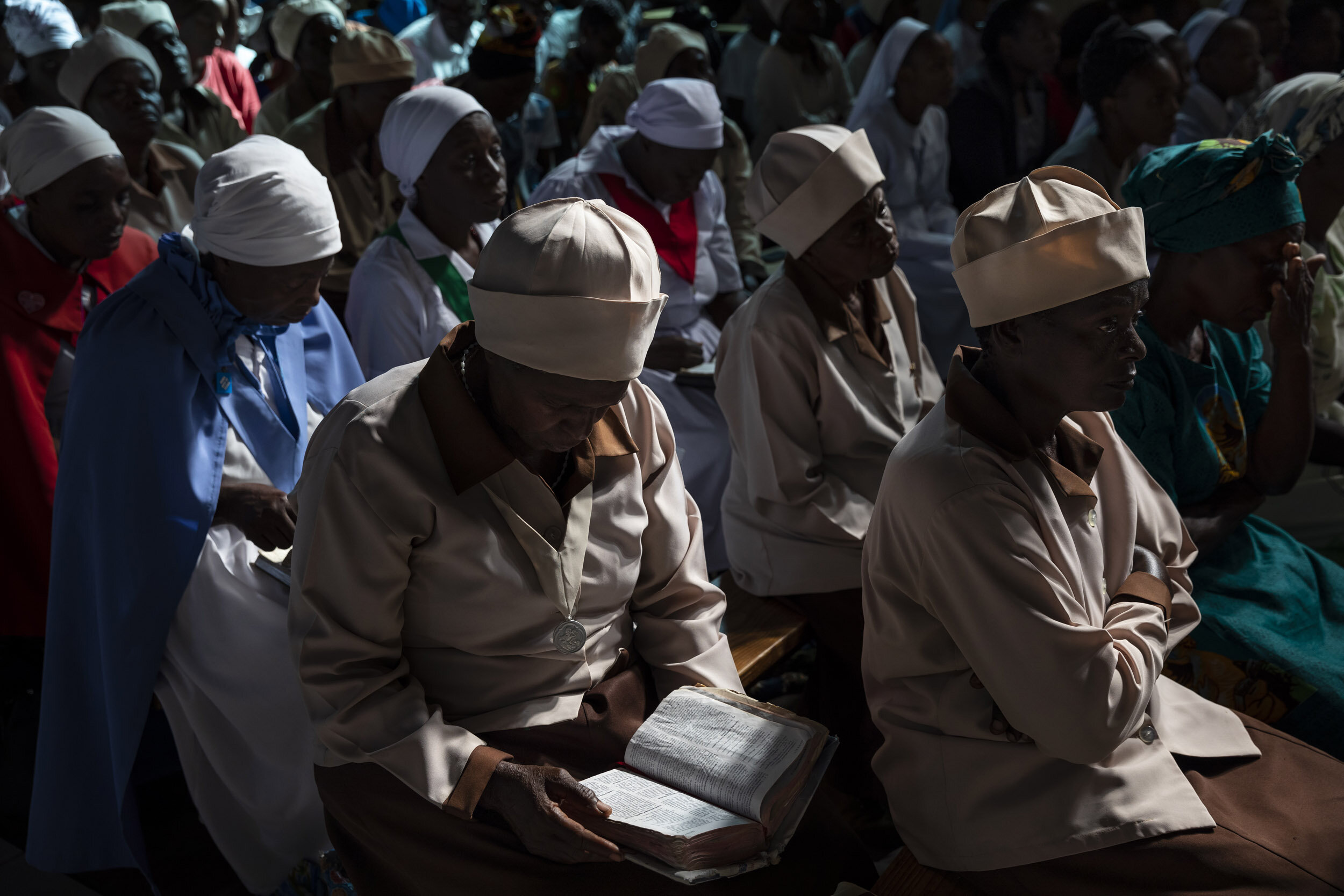
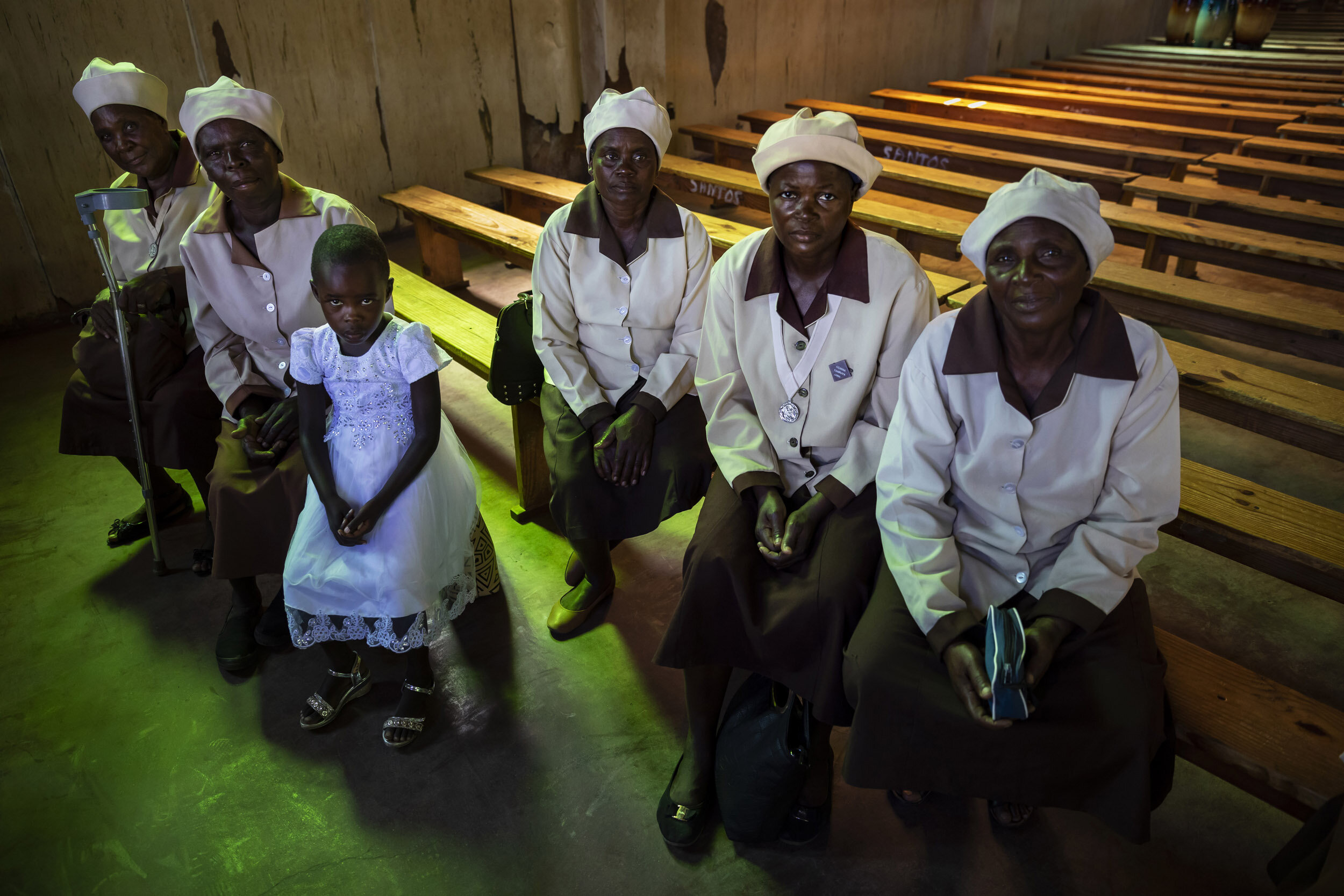
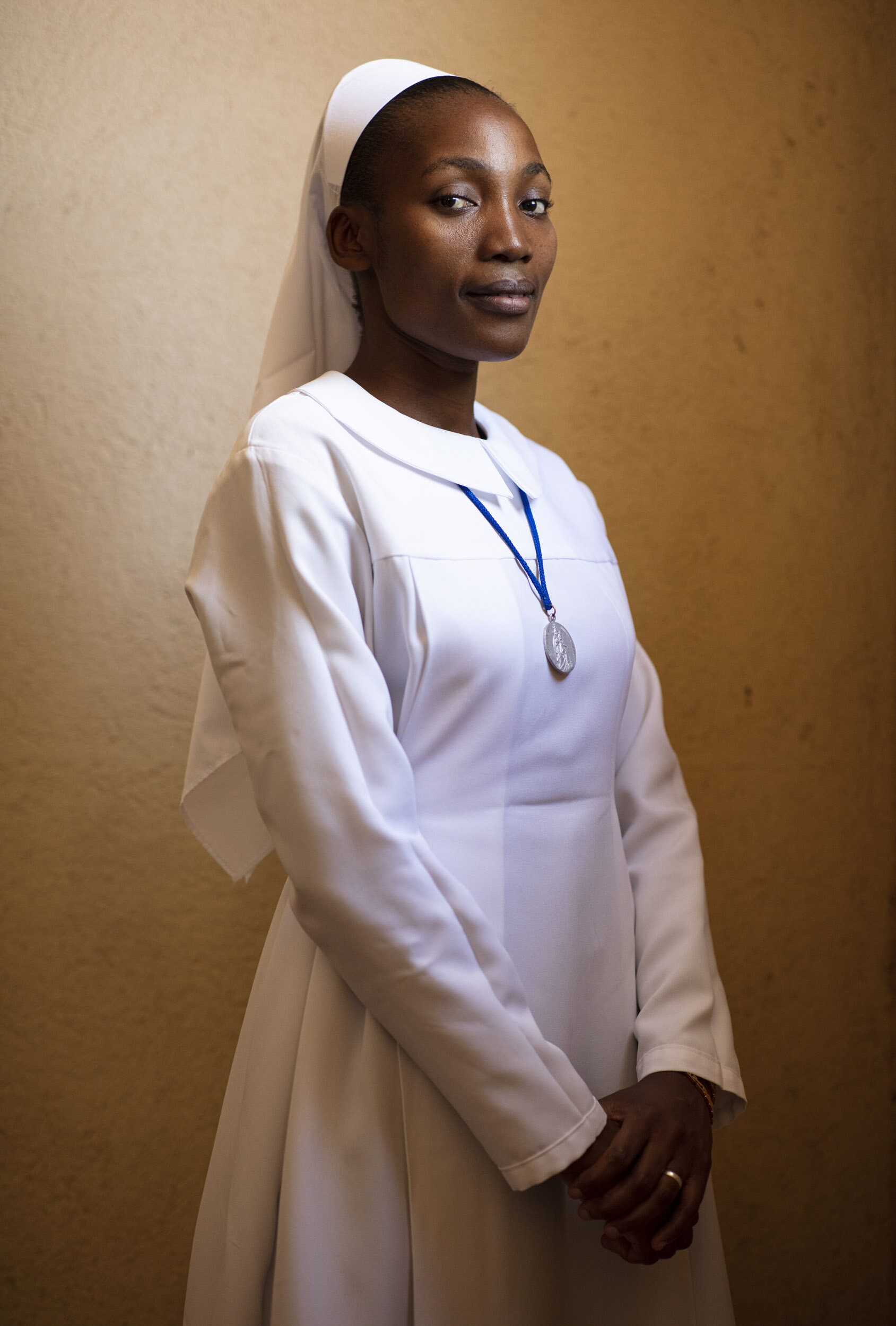
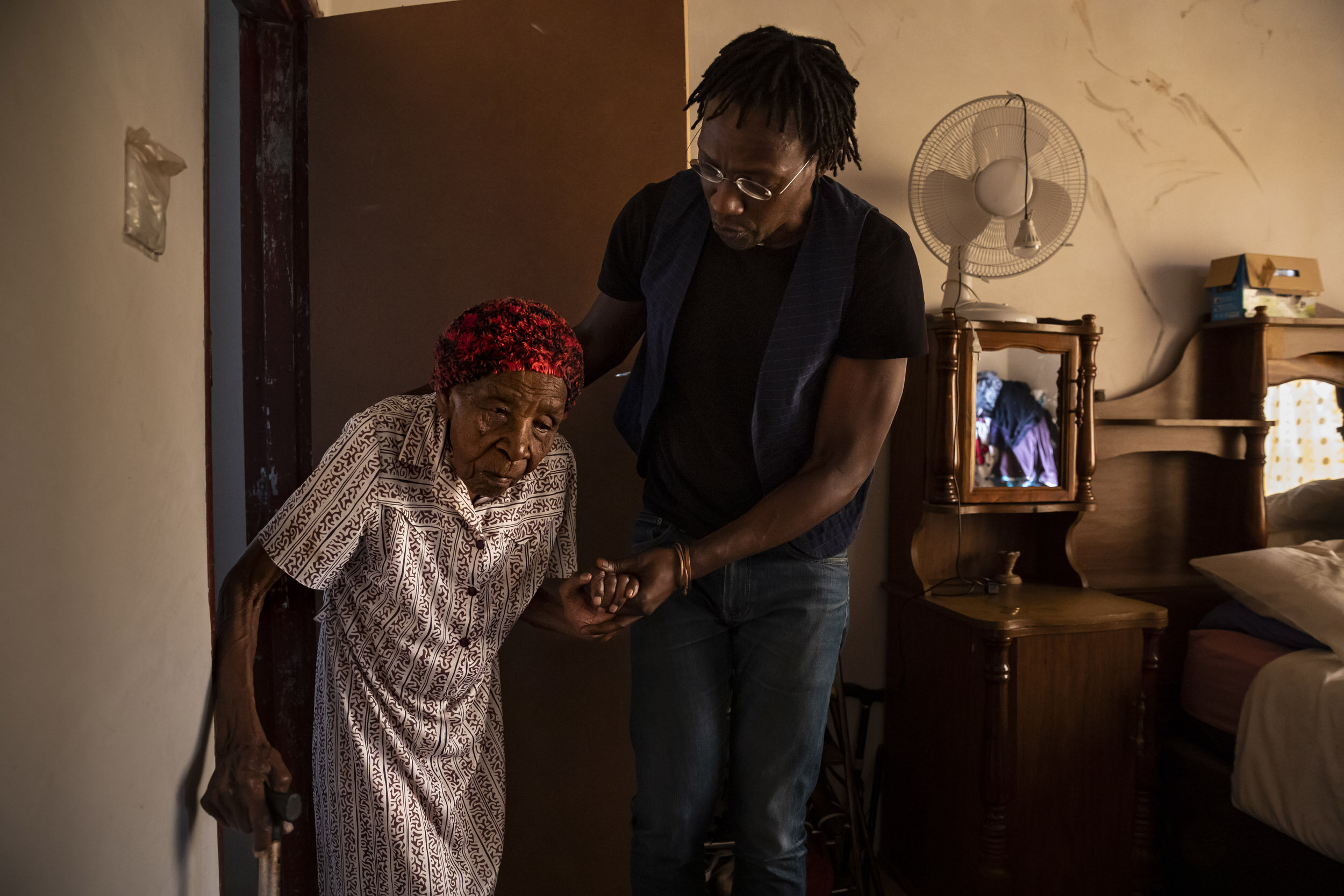
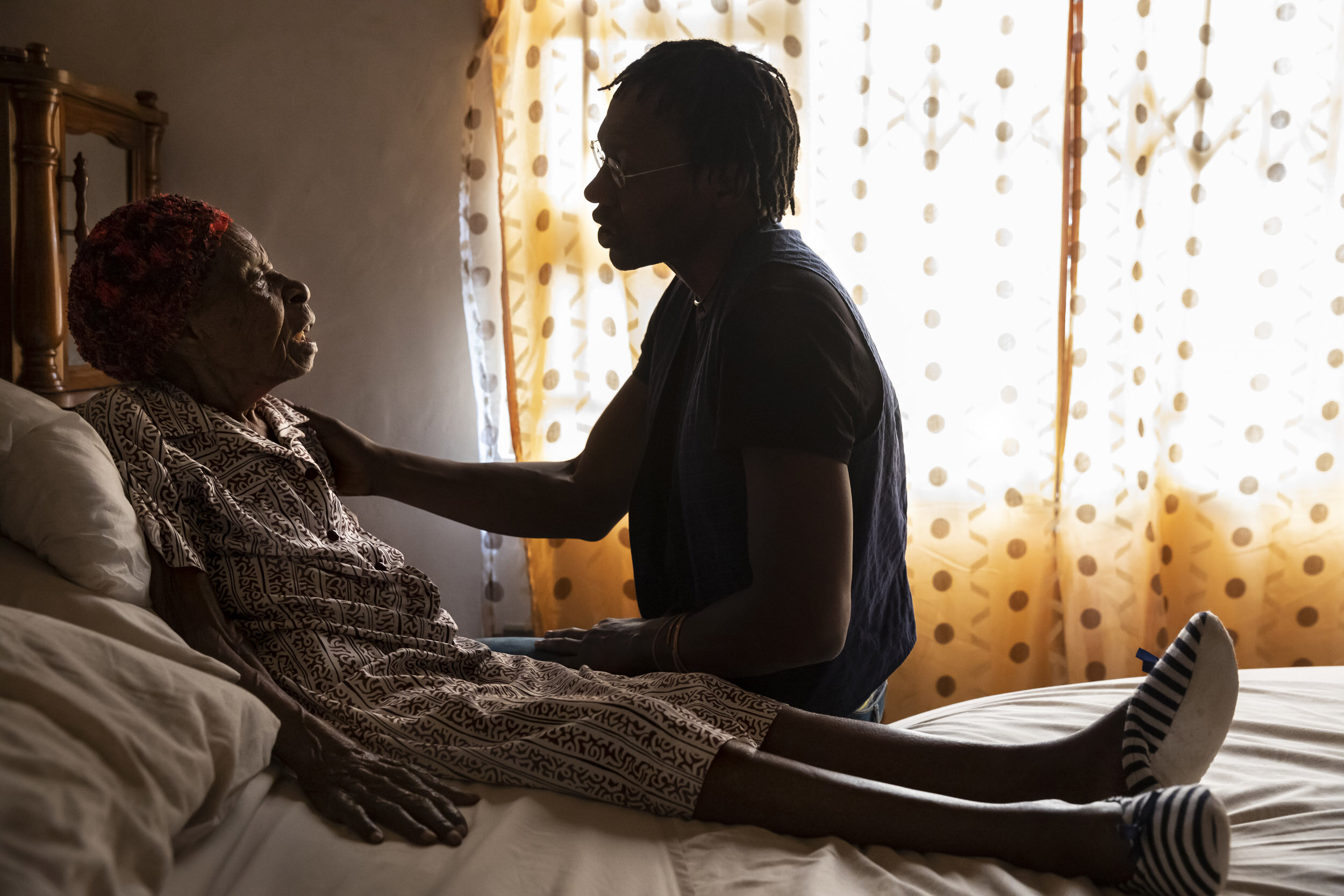
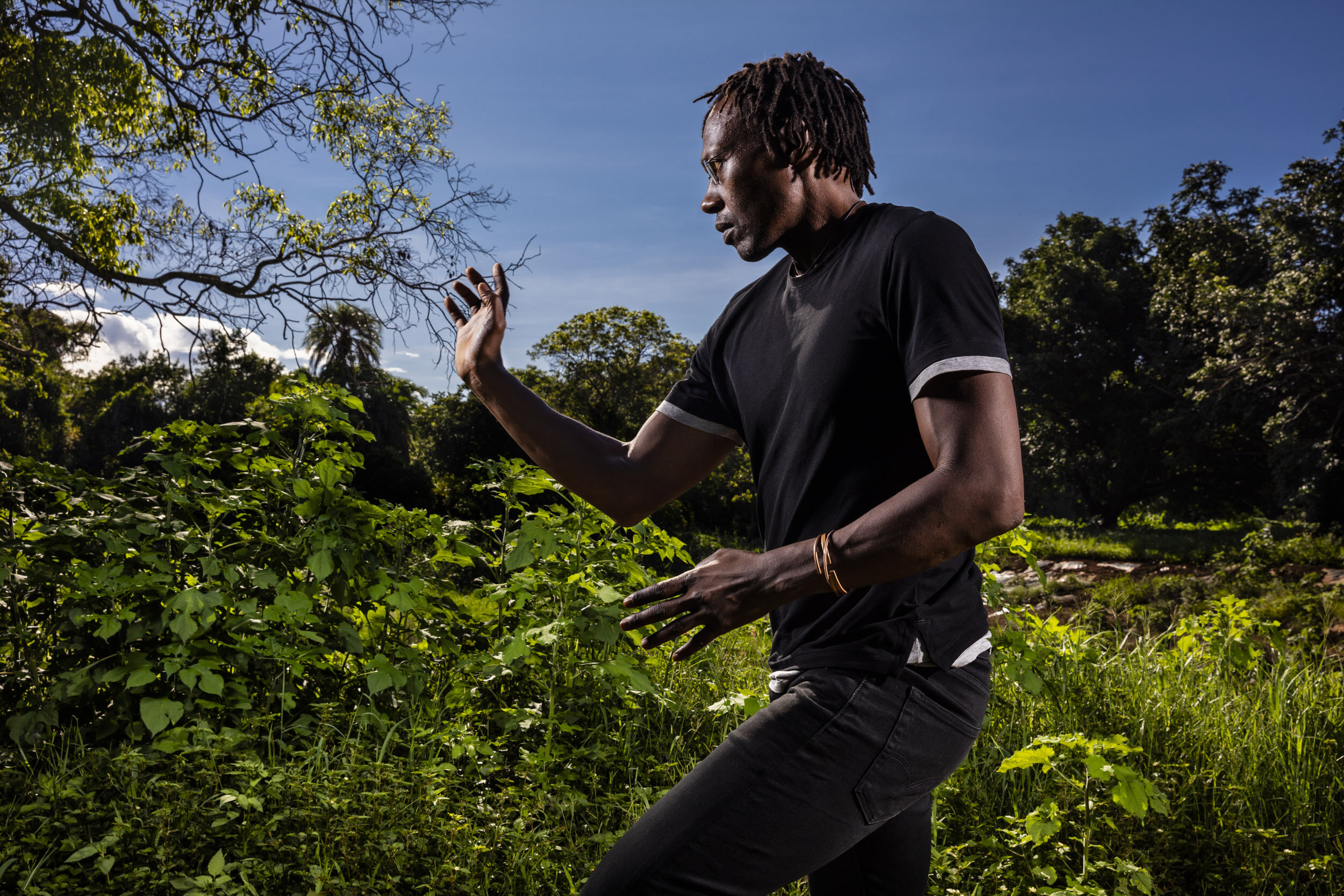
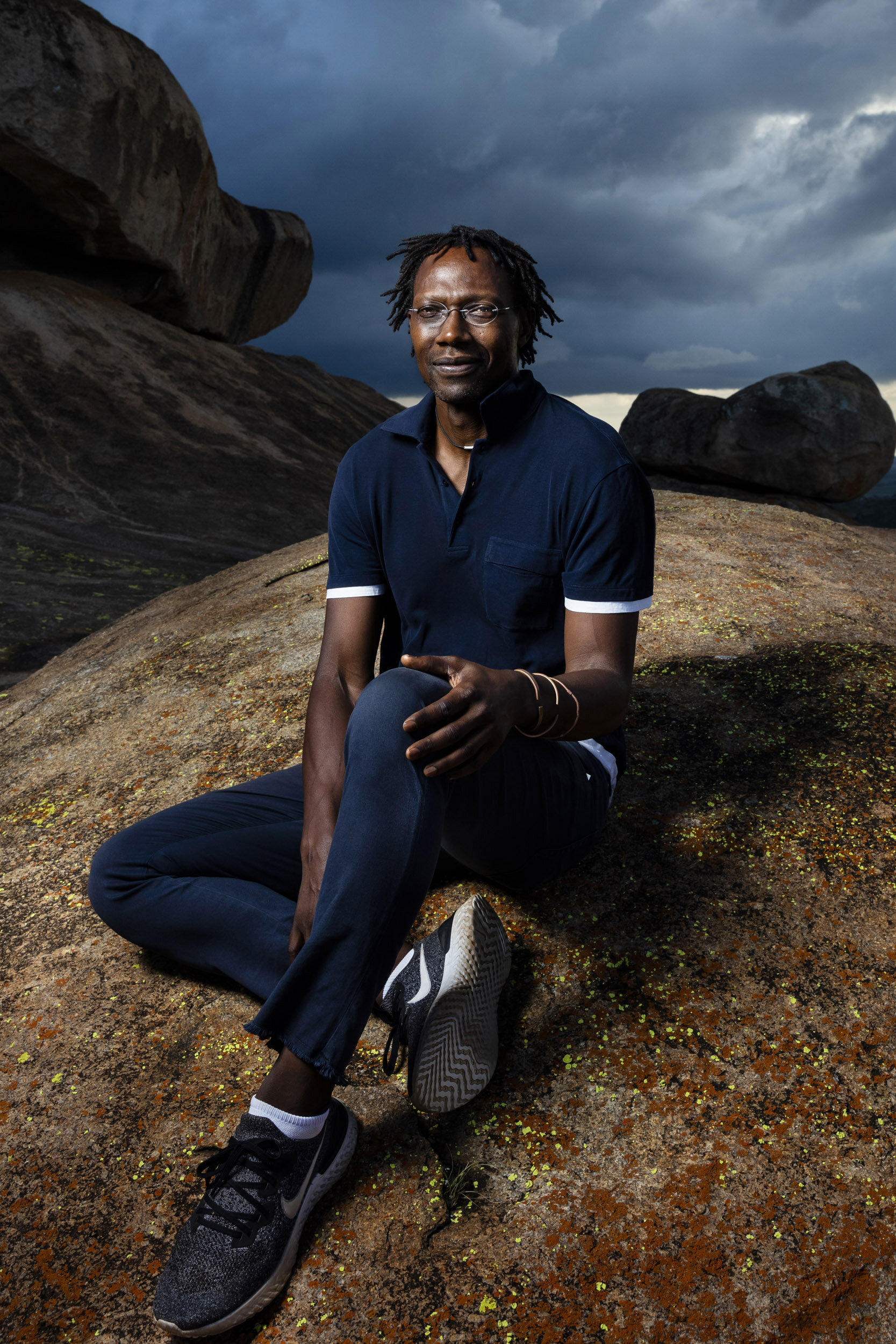
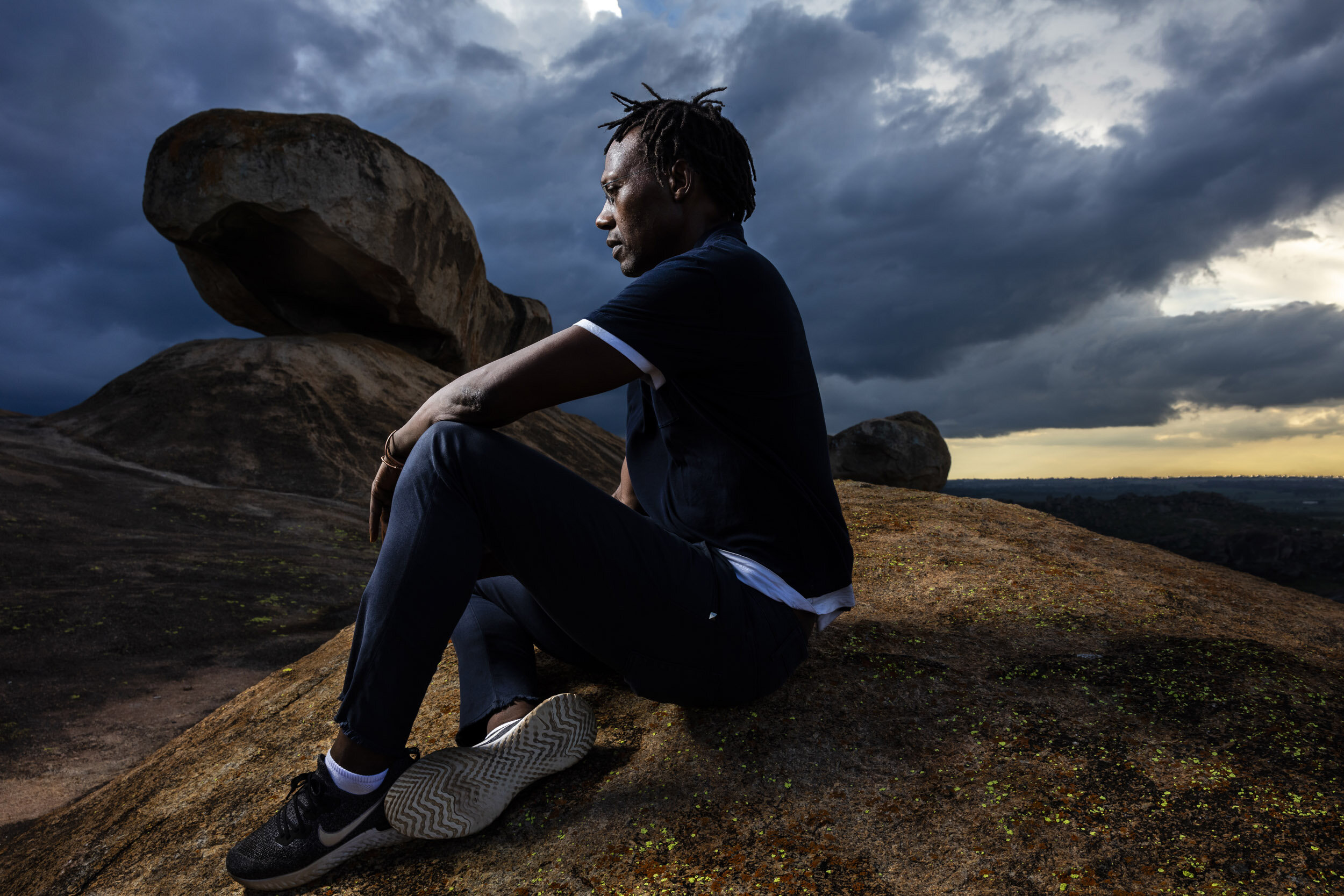
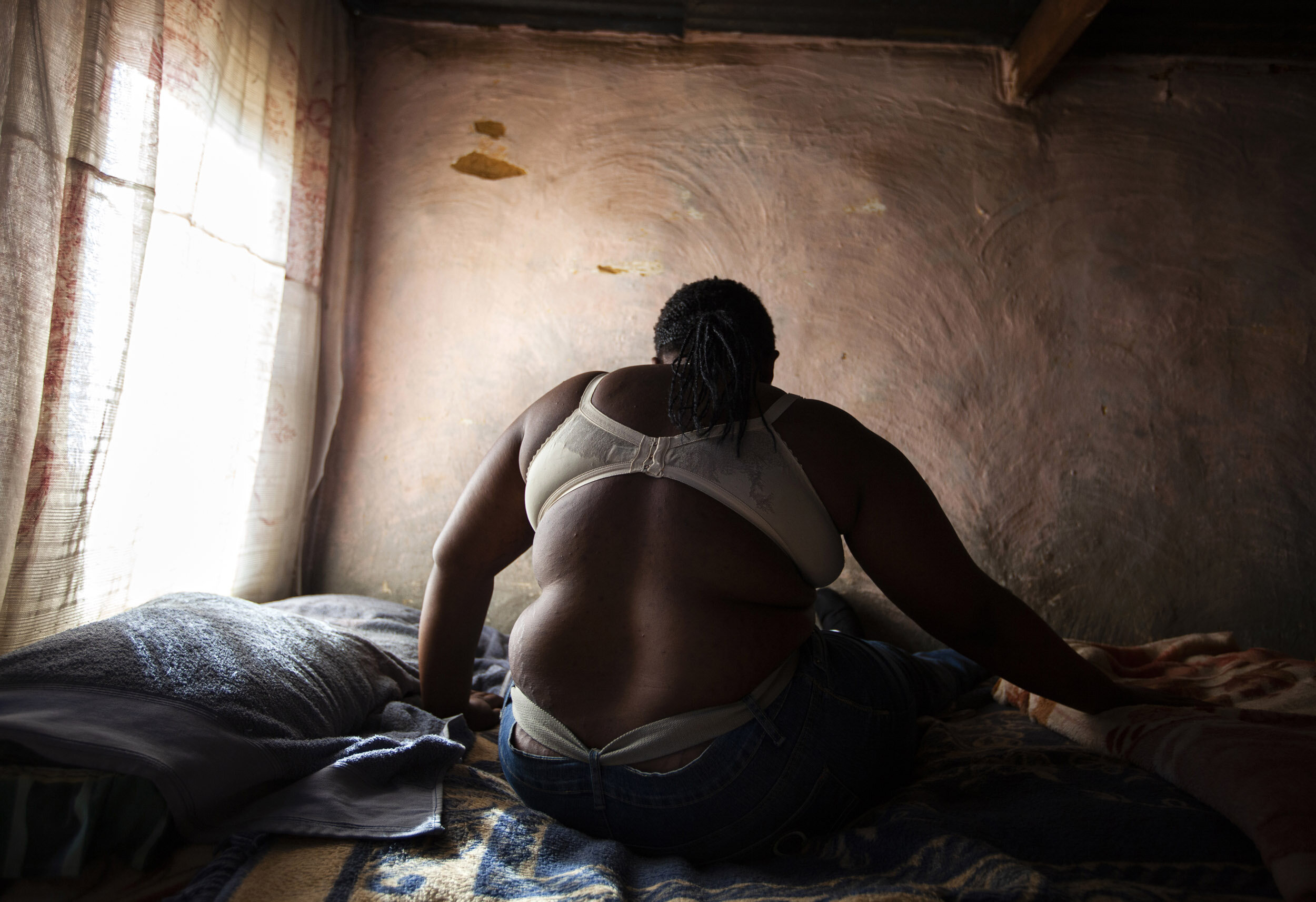
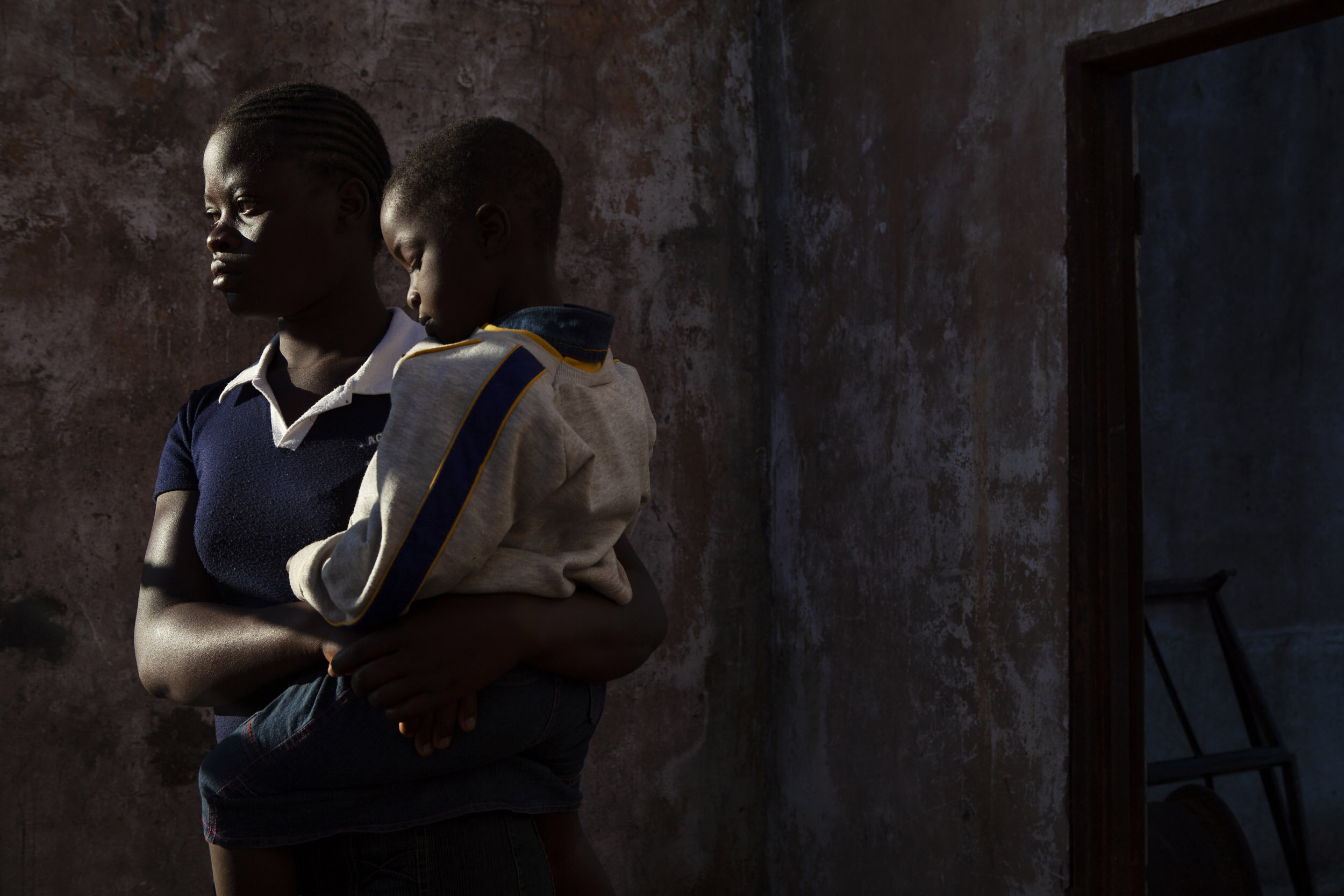
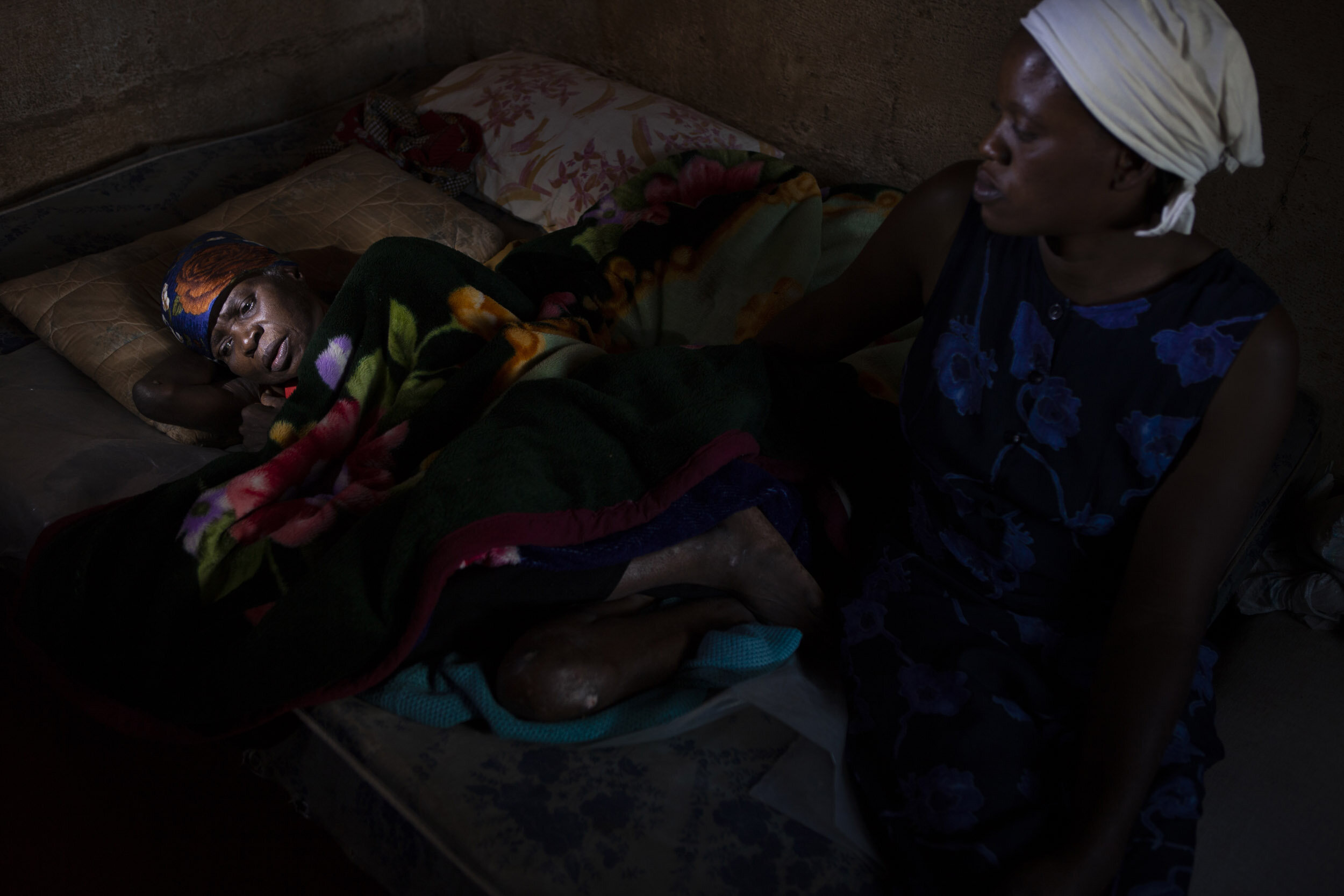
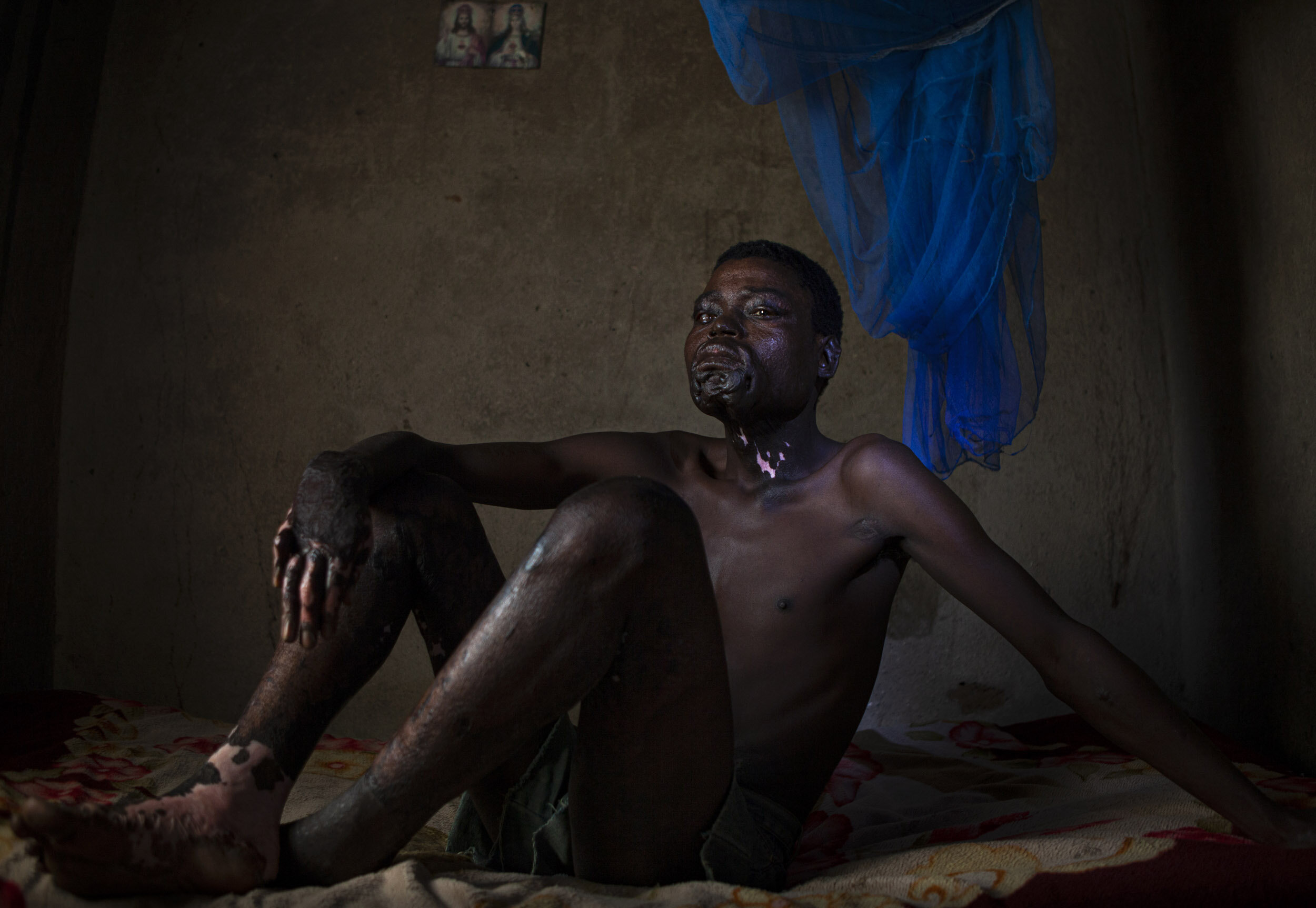
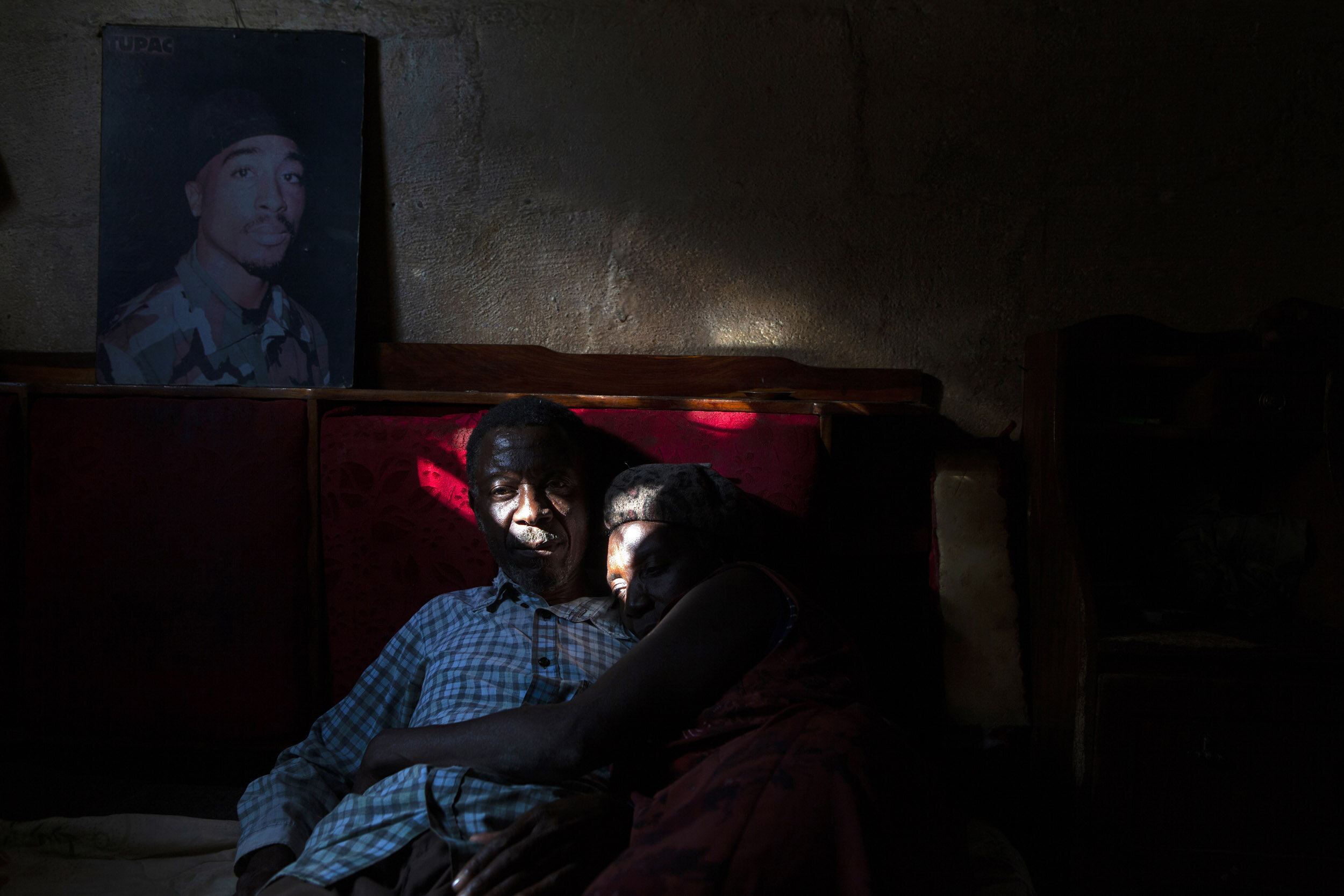
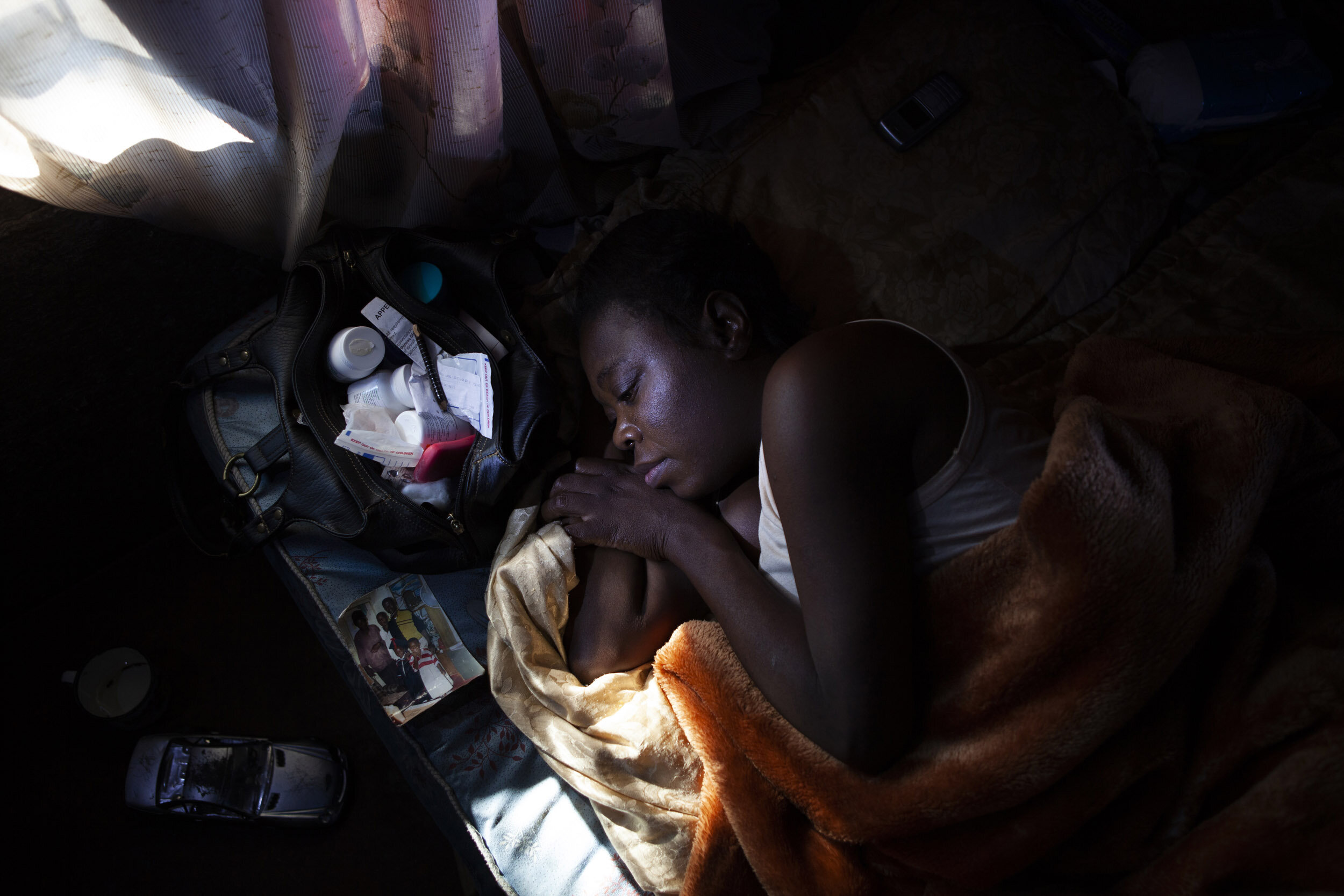
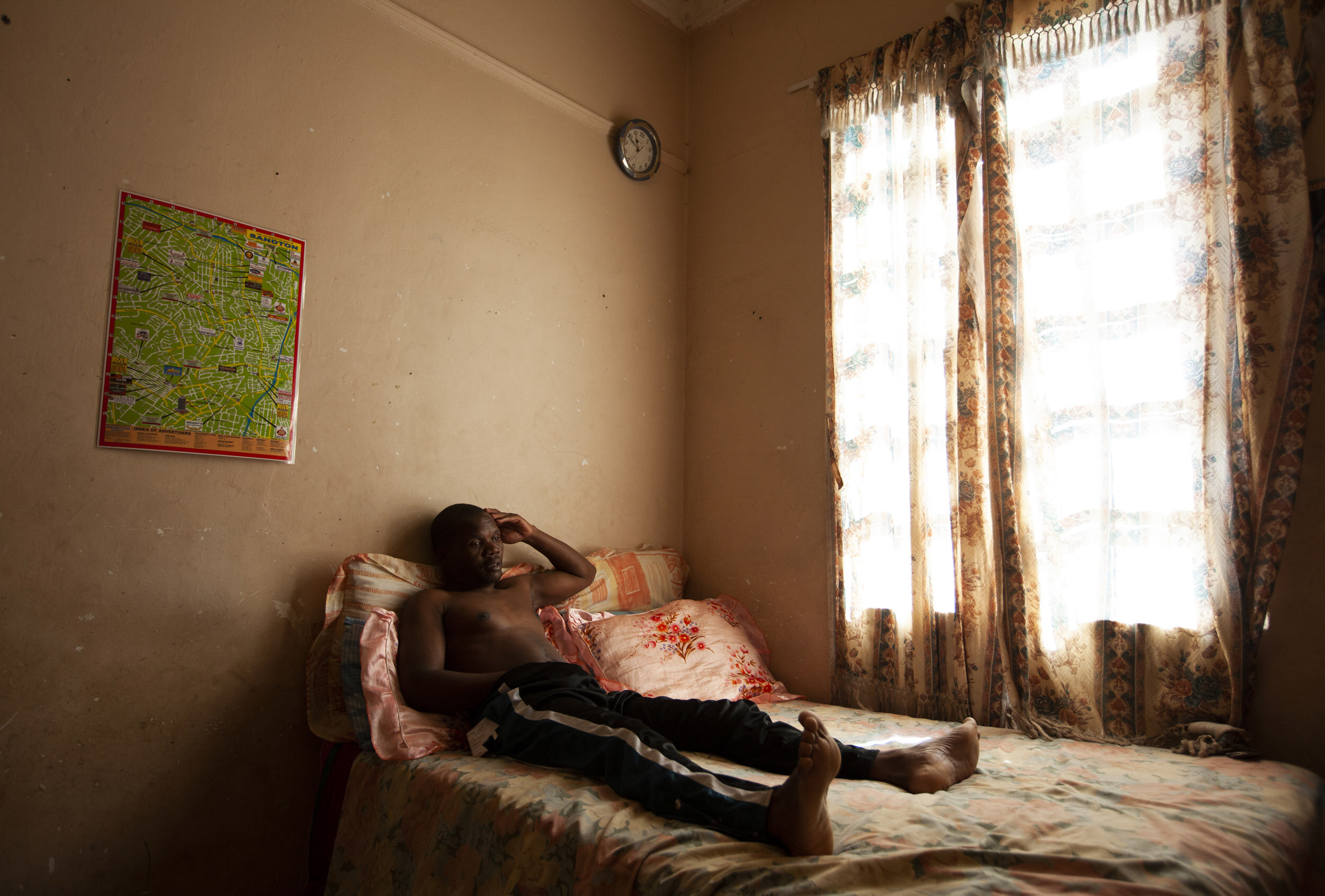
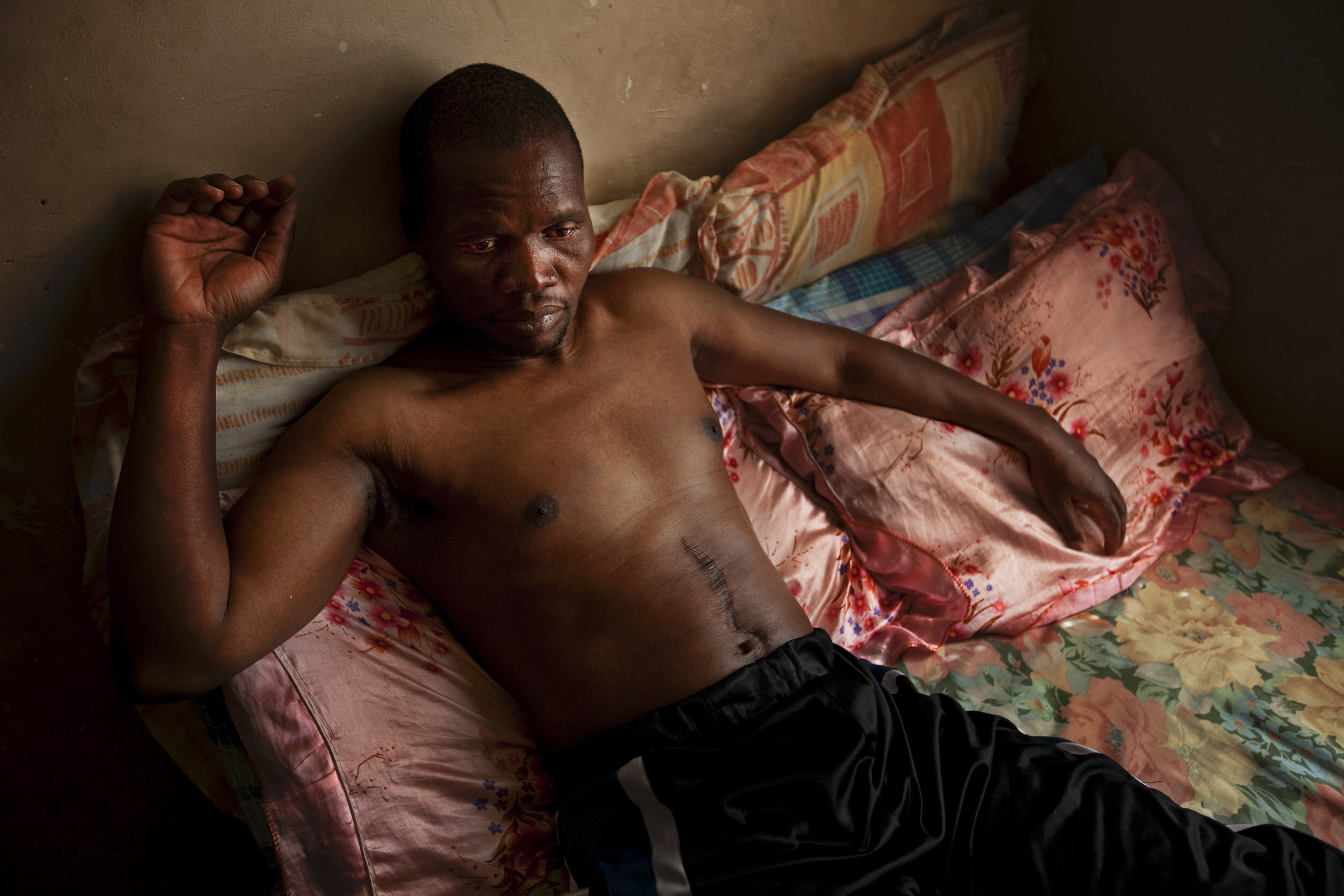
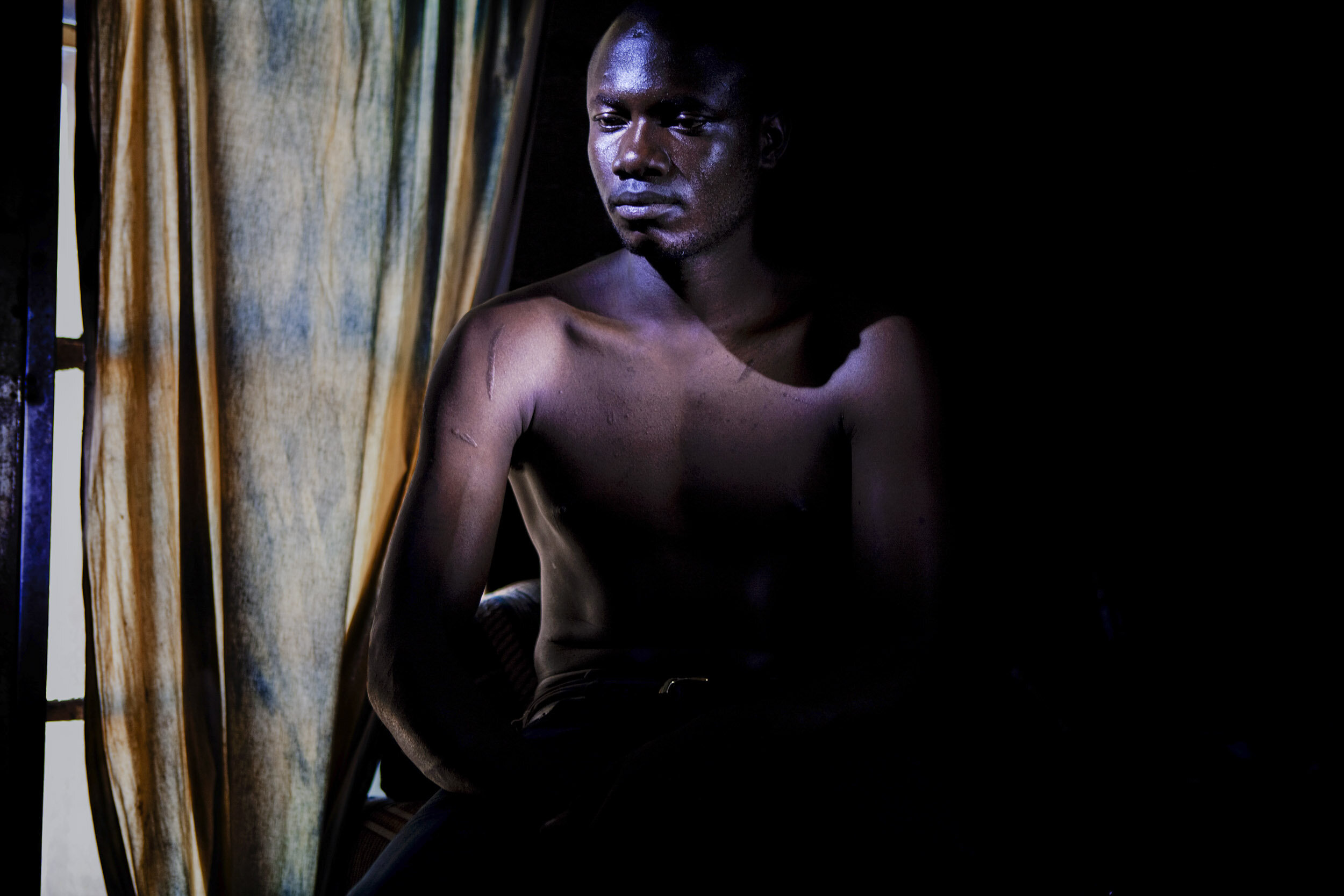
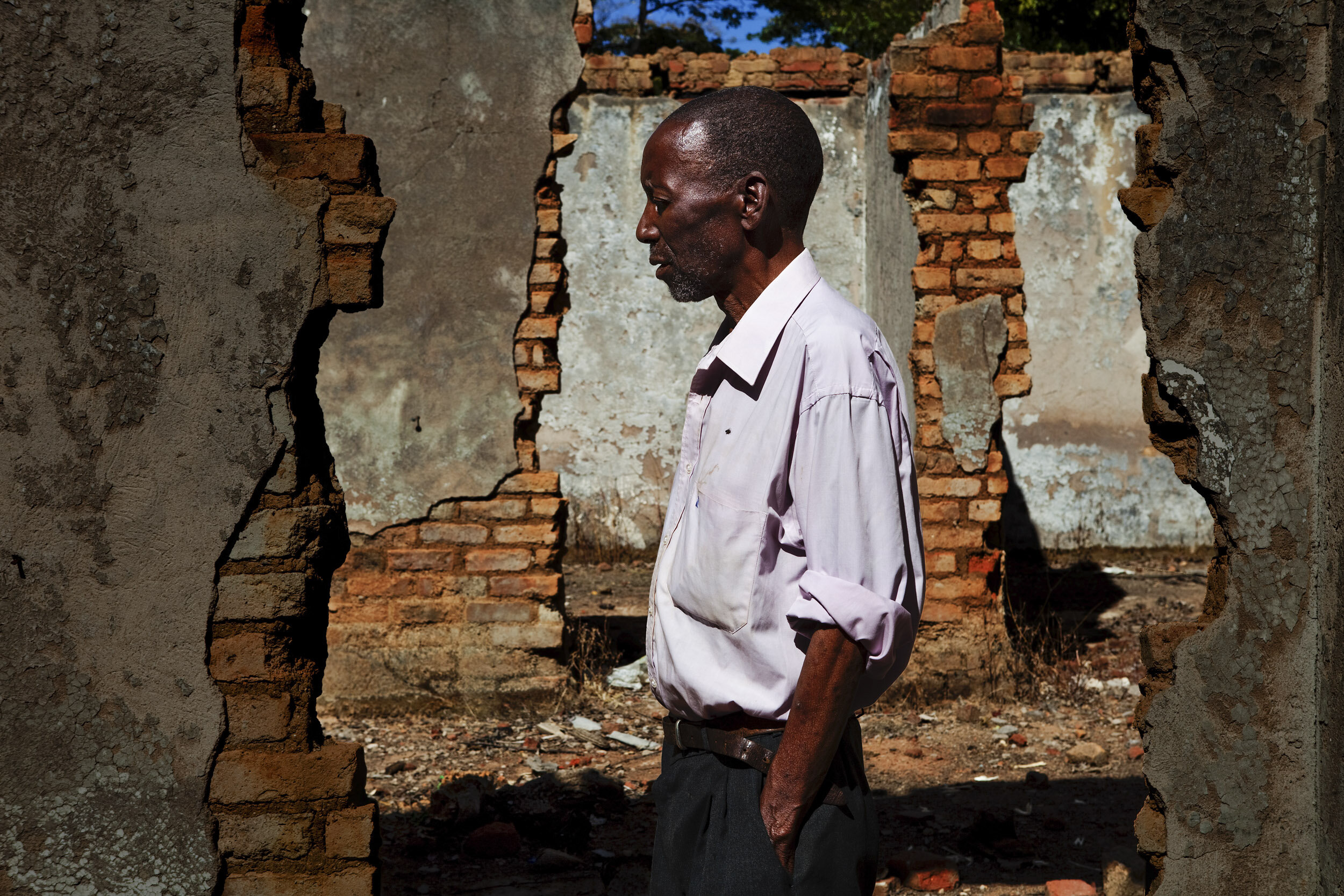
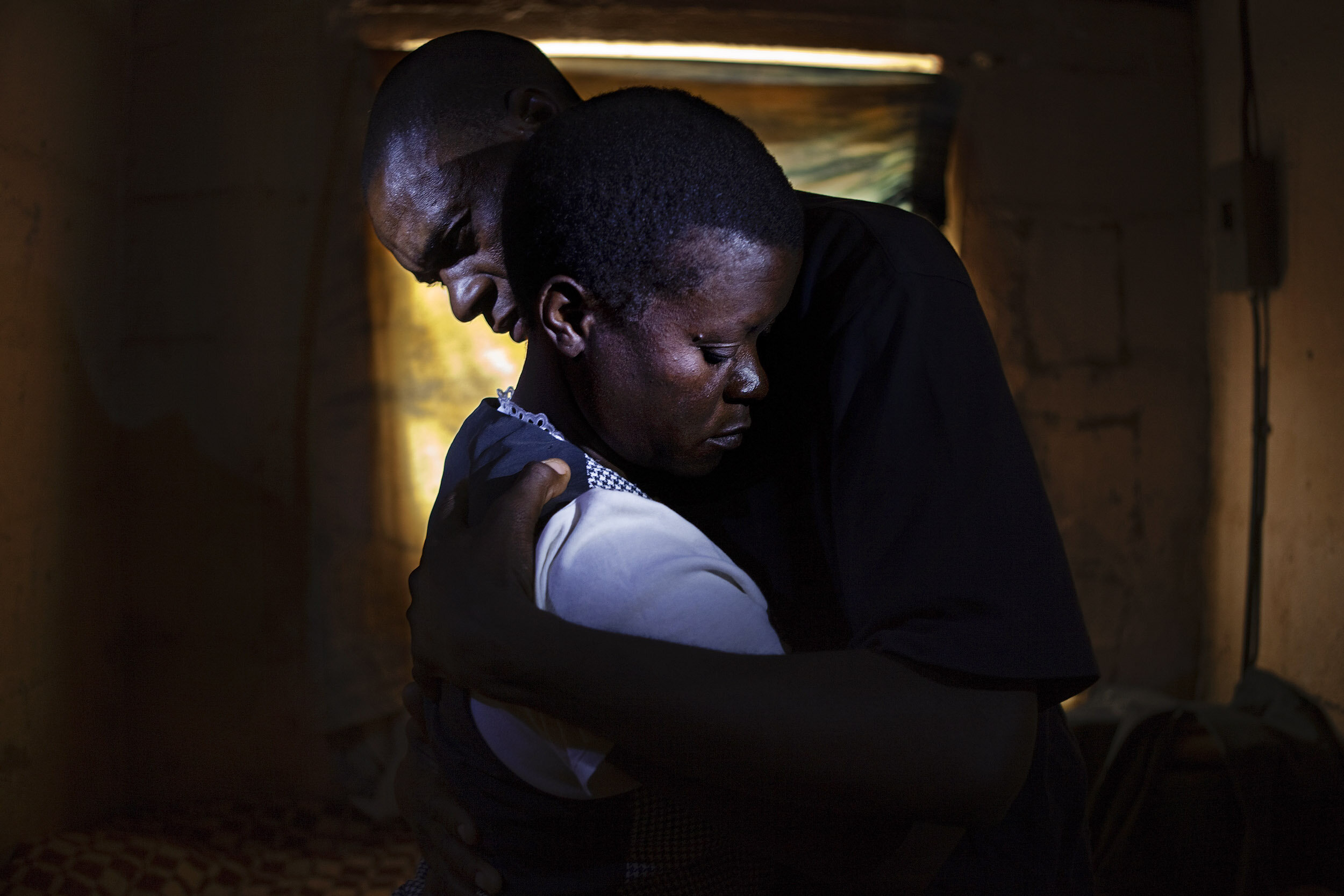
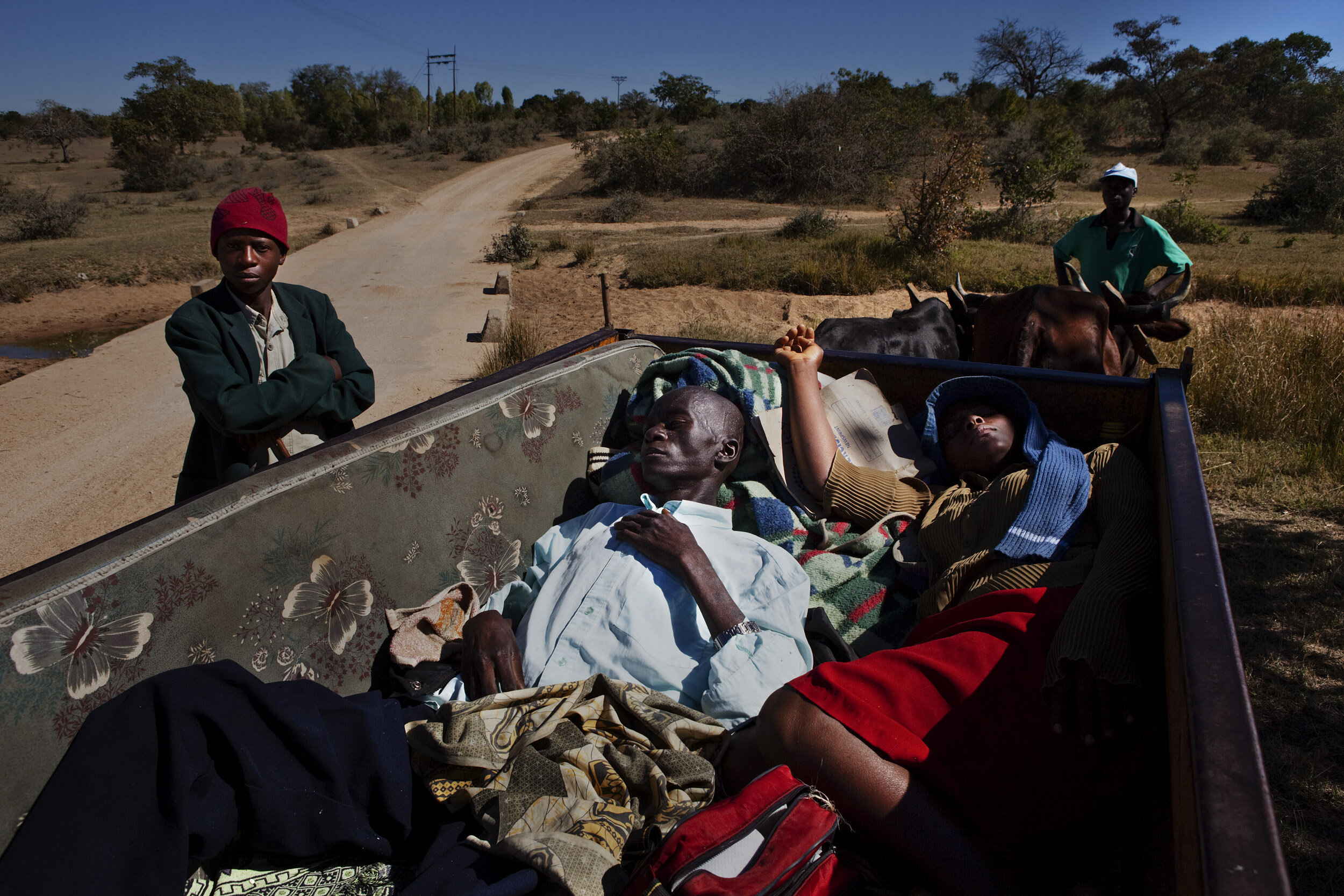
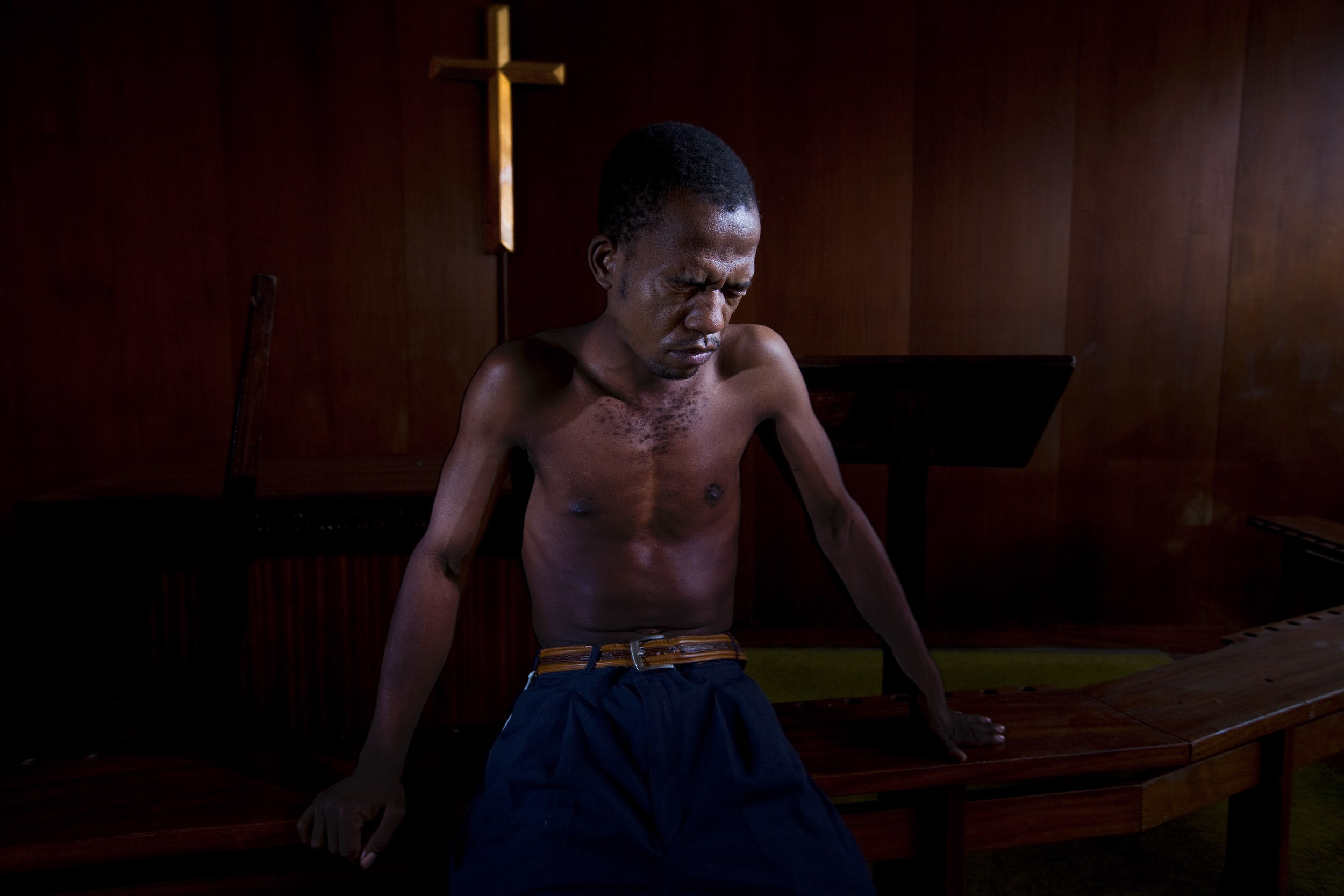
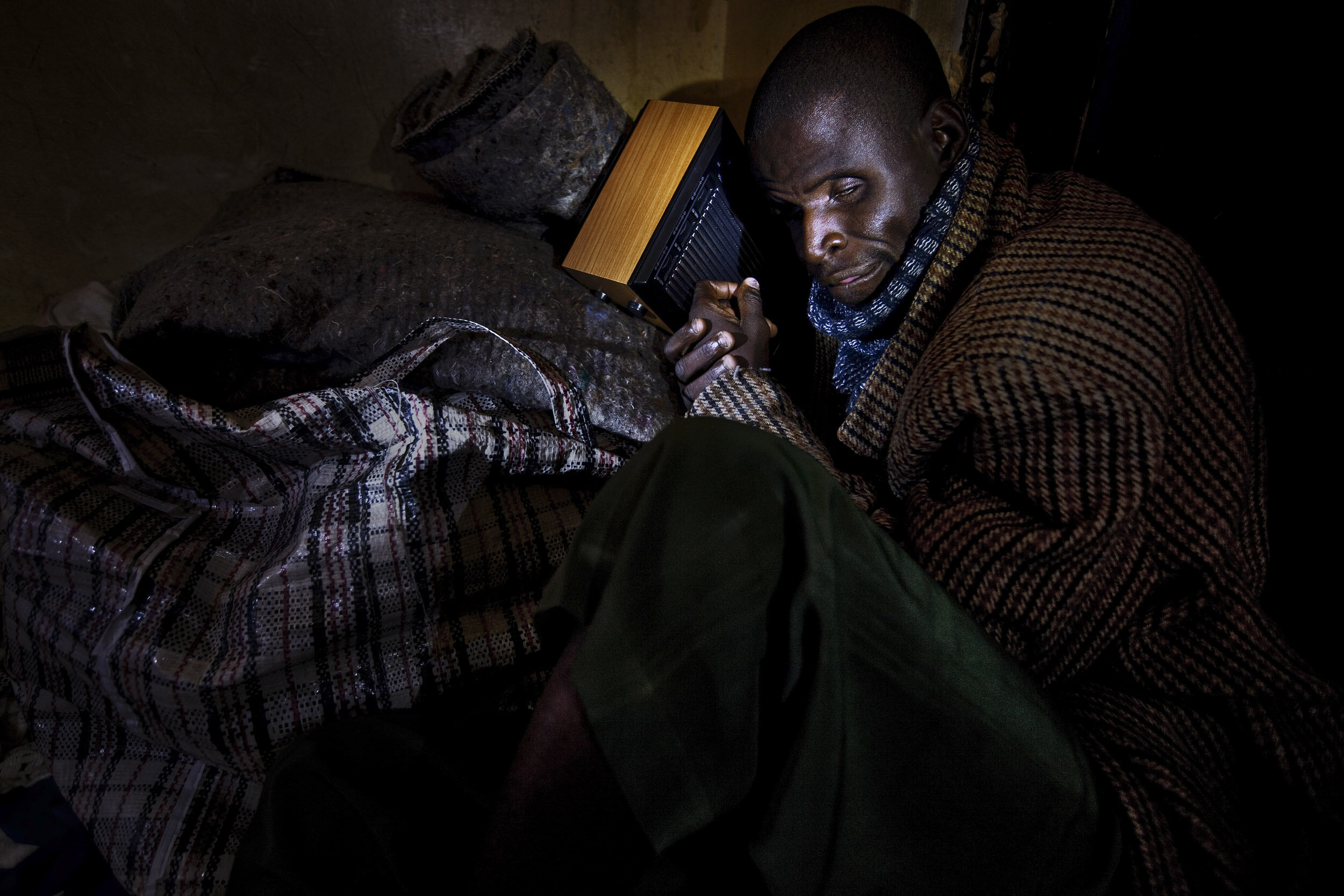
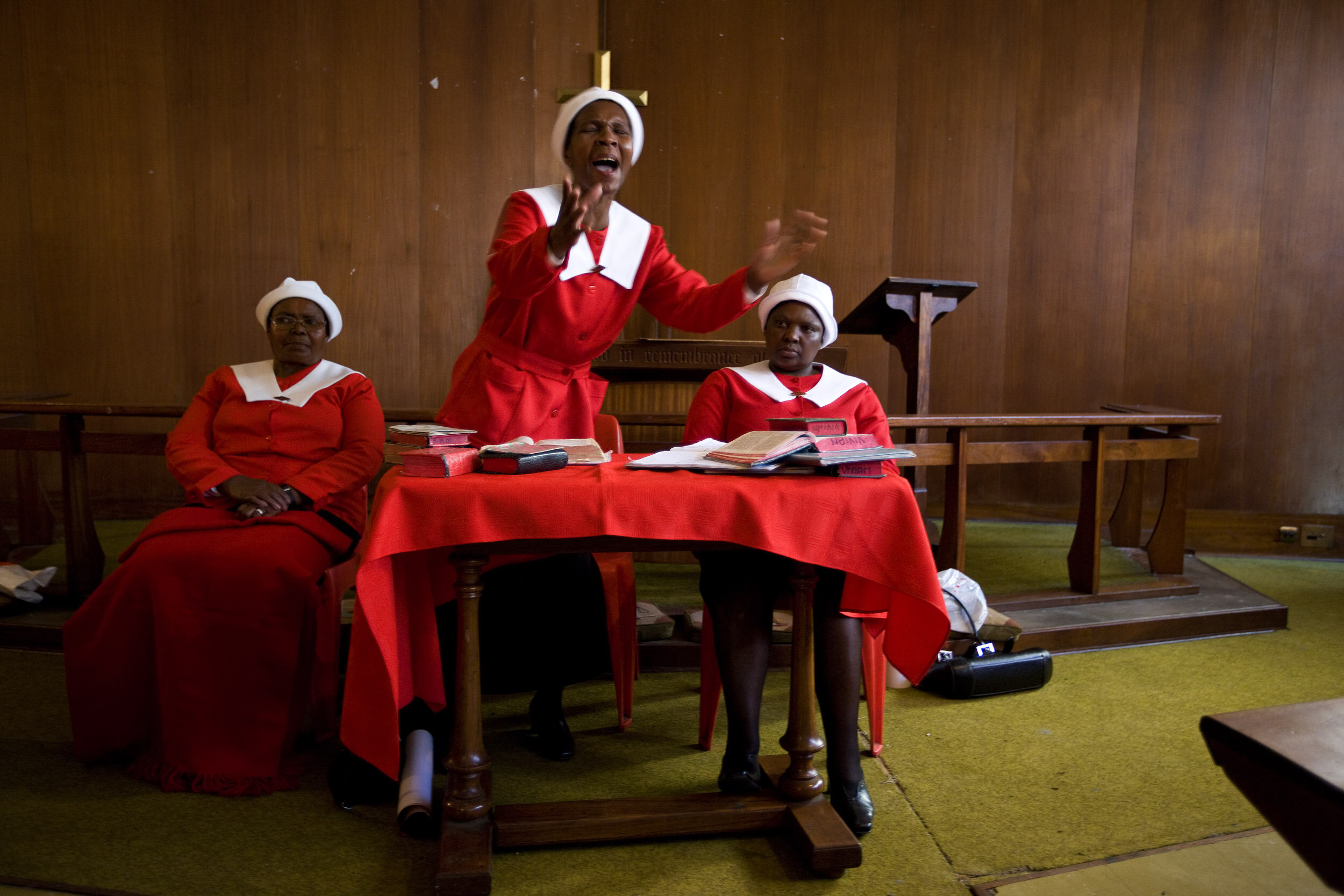
MBARE, HARARE, ZIMBABWE, 21 JANUARY 2020: Dixon Chibanda is a Zimbabwean clinical psychiatrist and the founder of the Friendship Bench program, an evidence based psychological therapy for depression delivered by over 700 trained community grandmothers on wooden park benches in over 100 communities across Zimbabwe. In a country where on average there is 1 psychiatrist for every 1.5 million people this has proven a meaningful solution for many suffering from mental health trauma. The program has now spread to 18 countries and continues to grow. I photographed the program all over Zimbabwe, a failed state with 89% unemployment, mass economic migration and a brutal regime that regulars traumatizes its citizens. Zimbabwe has one of the highest suicide rates in the world. I added previously shot images of trauma in Zimbabwe to add context to the therapy.Volunteer grandmothers for Friendship Benches are seen in at the Mbare Poly Clinic. Shelter Nhengo, 72, in the pink hat, has been working for FB since 2006, part of the original group. The grandmothers work as voluntary counsellors for those who would otherwise have no access to mental health services. The participants are taught a structured approach to identifying problems and to find workable solutions. The grandmothers follow a detailed script contained in a manual to conduct 6 sessions on a bench located in a discreet area outside the clinic. They listen and have the trust of the patients due to the cultural traditions of older woman being beacons of trust and confidentiality. The Grandmothers say that they are also benefitting, their problems gain perspective and they have a better sense of community.
RUTSANANA, HARARE, ZIMBABWE, 17TH JANUARY 2020: Mavis Mumamato, 82, has been a counsellor for Friendship Benches for 3 years. She has 48 grandchildren and had ten children herself. 4 of those died. She became a healthworker in 1986. She is seen with other grandmother’s who work with Friendship Benches gather for a workshop at Rutsanana Community Clinic outside of Harare. They are here for a workshop on malnutrition. The grandmothers also work as voluntary counselers for those who would otherwise have no access to mental health services. The participants are taught a structured approach to identifying problems and to find workable solutions. The grandmothers follow a detailed script contained in a manual to conduct 6 sessions on a bench located in a discreet area outside the clinic. They listen and have the trust of the patients due to the cultural traditions of older woman being beacons of trust and confidentiality. The Grandmothers say that they are also benefitting, their problems gain perspective and they have a better sense of community. This therapy was developed by Dixon Chibanda, Zimbabwe’s leading psychiatrist, and has spread around the world. (Photo by Brent Stirton/Getty Images
MBARE, HARARE, ZIMBABWE, 22 JANUARY 2020: Sekesayi Idah Hwiza, 86, is a former freedom fighter from Zimbabwe’s war of liberation. She was involved in a notorious incident where freedom fighters blew up a major fuel depot in Harare. She was involved in hiding the explosives and the fighters in her home and she was subsequently tortured by the authorities at the time. She was also threatened and hurt by the freedom fighters who were suspicious of what she may have told the authorities. She suffered from PTSD for many years and she claims that working with Friendship Benches helped her to get over that. The grandmothers of FB work as voluntary counselers for those who would otherwise have no access to mental health services. The participants are taught a structured approach to identifying problems and to find workable solutions. The grandmothers follow a detailed script contained in a manual to conduct 6 sessions on a bench located in a discreet area outside the clinic. They listen and have the trust of the patients due to the cultural traditions of older woman being beacons of trust and confidentiality. The Grandmothers say that they are also benefitting, their problems gain perspective and they have a better sense of community. This therapy was developed by Dixon Chibanda, Zimbabwe’s leading psychiatrist, and has spread around the world. (Photo by Brent Stirton/Getty Images for GEO magazine.)
ZAKA, MSVINGO, ZIMBABWE, 24 JANUARY 2020: Elizabeth Mapaire, 56, works as a Friendship Bench counselor in the Zaka area, servicing rural clinics in the area. She is a lay health worker who is paid by the Ministry of Health but her salary is less than 2 dollars. She is seen on the bench with patient Sophia Nyamuwngi, 34, in Sophia’s first of six sessions. Sophia was quickly red flagged in this session as she expressed a desire to kill herself due to her husband’s neglect and abandonment of her and her children. Elizabeth sent her to a more experienced nurse counselor and after that visit, Sophia returned to the bench with Elizabeth. The grandmothers work as voluntary counselors for those who would otherwise have no access to mental health services. The participants are taught a structured approach to identifying problems and to find workable solutions. The grandmothers follow a detailed script contained in a manual to conduct 6 sessions on a bench located in a discreet area outside the clinic. They listen and have the trust of the patients due to the cultural traditions of older woman being beacons of trust and confidentiality. The Grandmothers say that they are also benefitting, their problems gain perspective and they have a better sense of community. This therapy of communal empathy was developed by Dixon Chibanda, Zimbabwe’s leading psychiatrist, and has spread around the world. (Photo by Brent Stirton/Getty Images
ZAKA, MSVINGO, ZIMBABWE, 24 JANUARY 2020: Elizabeth Mapaire, 56, works as a Friendship Bench counselor in the Zaka area, servicing rural clinics in the area. She is a lay health worker who is paid by the Ministry of Health but her salary is less than 2 dollars. She is seen on the bench with patient Sophia Nyamuwngi, 34, in Sophia’s first of six sessions. Sophia was quickly red flagged in this session as she expressed a desire to kill herself due to her husband’s neglect and abandonment of her and her children. Elizabeth sent her to a more experienced nurse counselor and after that visit, Sophia returned to the bench with Elizabeth. The grandmothers work as voluntary counselors for those who would otherwise have no access to mental health services. The participants are taught a structured approach to identifying problems and to find workable solutions. The grandmothers follow a detailed script contained in a manual to conduct 6 sessions on a bench located in a discreet area outside the clinic. They listen and have the trust of the patients due to the cultural traditions of older woman being beacons of trust and confidentiality. The Grandmothers say that they are also benefitting, their problems gain perspective and they have a better sense of community. This therapy of communal empathy was developed by Dixon Chibanda, Zimbabwe’s leading psychiatrist, and has spread around the world. (Photo by Brent Stirton/Getty Images
ZAKA, MSVINGO, ZIMBABWE, 24 JANUARY 2020: Elizabeth Mapaire, 56, works as a Friendship Bench counselor in the Zaka area, servicing rural clinics in the area. She is a lay health worker who is paid by the Ministry of Health but her salary is less than 2 dollars. She is seen on the bench with patient Sophia Nyamuwngi, 34, in Sophia’s first of six sessions. Sophia was quickly red flagged in this session as she expressed a desire to kill herself due to her husband’s neglect and abandonment of her and her children. Elizabeth sent her to a more experienced nurse counselor and after that visit, Sophia returned to the bench with Elizabeth. The grandmothers work as voluntary counselors for those who would otherwise have no access to mental health services. The participants are taught a structured approach to identifying problems and to find workable solutions. The grandmothers follow a detailed script contained in a manual to conduct 6 sessions on a bench located in a discreet area outside the clinic. They listen and have the trust of the patients due to the cultural traditions of older woman being beacons of trust and confidentiality. The Grandmothers say that they are also benefitting, their problems gain perspective and they have a better sense of community. This therapy of communal empathy was developed by Dixon Chibanda, Zimbabwe’s leading psychiatrist, and has spread around the world. (Photo by Brent Stirton/Getty Images
MBARE, HARARE, ZIMBABWE, 21 JANUARY 2020: Volunteer grandmothers for Friendship Benches are seen in at the Mbare Poly Clinic. Shelter Nhengo, 72, has been working for FB since 2006, part of the original group. The grandmothers work as voluntary counselers for those who would otherwise have no access to mental health services. The participants are taught a structured approach to identifying problems and to find workable solutions. The grandmothers follow a detailed script contained in a manual to conduct 6 sessions on a bench located in a discreet area outside the clinic. They listen and have the trust of the patients due to the cultural traditions of older woman being beacons of trust and confidentiality. The Grandmothers say that they are also benefitting, their problems gain perspective and they have a better sense of community. This therapy was developed by Dixon Chibanda, Zimbabwe’s leading psychiatrist, and has spread around the world. (Photo by Brent Stirton/Getty Images
ZAKA, MSVINGO, ZIMBABWE, 24 JANUARY 2020: Elizabeth Mapaire, 56, works as a Friendship Bench counselor in the Zaka area, servicing rural clinics in the area. She is seen in her community with a long term patient of hers, this patient is HIV +. She has lost two children to Aids as well as her husband, she thinks her other two children may be HIV+ too. Last years cyclone devastated her home and crops and she is reliant on charity. She was refered to Elizabeth a year ago and has had 4 sessions with her. They discussed her immediate problems, the children, food issues and focused on solutions like a chicken breeding project. She says that Elizabeth has offered her empathy, confidentiality and friendship, that has helped her a great deal. The grandmothers work as voluntary counselors for those who would otherwise have no access to mental health services. The participants are taught a structured approach to identifying problems and to find workable solutions. The grandmothers follow a detailed script contained in a manual to conduct 6 sessions on a bench located in a discreet area outside the clinic. They listen and have the trust of the patients due to the cultural traditions of older woman being beacons of trust and confidentiality. The Grandmothers say that they are also benefitting, their problems gain perspective and they have a better sense of community. This therapy of communal empathy was developed by Dixon Chibanda, Zimbabwe’s leading psychiatrist, and has spread around the world. (Photo by Brent Stirton/Getty Images
RUTSANANA, HARARE, ZIMBABWE, 17TH JANUARY 2020: Grandmother’s who work with Friendship Benches gather for a workshop at Rutsanana Community Clinic outside of Harare. They are here for a workshop on malnutrition. The grandmothers also work as voluntary counselers for those who would otherwise have no access to mental health services. The participants are taught a structured approach to identifying problems and to find workable solutions. The grandmothers follow a detailed script contained in a manual to conduct 6 sessions on a bench located in a discreet area outside the clinic. They listen and have the trust of the patients due to the cultural traditions of older woman being beacons of trust and confidentiality. The Grandmothers say that they are also benefitting, their problems gain perspective and they have a better sense of community. This therapy was developed by Prof. Dixon Chibanda, Zimbabwe’s leading psychiatrist, and has spread to many other countries as a means by which people without means can gain access to mental health couselling. (Photo by Brent Stirton/Getty Images
RUTSANANA, HARARE, ZIMBABWE, 17TH JANUARY 2020: Grandmother’s who work with Friendship Benches gather for a workshop at Rutsanana Community Clinic outside of Harare. They are here for a workshop on malnutrition. The grandmothers also work as voluntary counselers for those who would otherwise have no access to mental health services. The participants are taught a structured approach to identifying problems and to find workable solutions. The grandmothers follow a detailed script contained in a manual to conduct 6 sessions on a bench located in a discreet area outside the clinic. They listen and have the trust of the patients due to the cultural traditions of older woman being beacons of trust and confidentiality. The Grandmothers say that they are also benefitting, their problems gain perspective and they have a better sense of community. This therapy was developed by Prof. Dixon Chibanda, Zimbabwe’s leading psychiatrist, and has spread to many other countries as a means by which people without means can gain access to mental health couselling. (Photo by Brent Stirton/Getty Images
MBARE, HARARE, ZIMBABWE, 21 JANUARY 2020: Juliet Kusikwenyu, 66, works as a mental health counsellor for Friendship Benches, are seen in a counselling session on the benches at Mbare Poly Clinic. The patient in this case is someone who is dealing with her second husband’s rejection of her child, a difficult situation. Her husband is also HIV +, something he did not share with her before they were married. Juliet says that working for Friendship Benches has made her own life more managable. She feels that there are now less suicides and that the benches are part of that. “Mr Chipanda brought us a solution, now we know where to go.” The grandmothers work as voluntary counselers for those who would otherwise have no access to mental health services. The participants are taught a structured approach to identifying problems and to find workable solutions. The grandmothers follow a detailed script contained in a manual to conduct 6 sessions on a bench located in a discreet area outside the clinic. They listen and have the trust of the patients due to the cultural traditions of older woman being beacons of trust and confidentiality. The Grandmothers say that they are also benefitting, their problems gain perspective and they have a better sense of community. This therapy was developed by Dixon Chibanda, Zimbabwe’s leading psychiatrist, and has spread around the world. (Photo by Brent Stirton/Getty Images
MBARE, HARARE, ZIMBABWE, 21 JANUARY 2020: A grandmother working for Friendship Benches is seen counselling a yong mother at the Mbare Poly Clinic. The young women is talking about the difficulties of finance in a country with 90% unemployment. The grandmothers work as voluntary counselers for those who would otherwise have no access to mental health services. The participants are taught a structured approach to identifying problems and to find workable solutions. The grandmothers follow a detailed script contained in a manual to conduct 6 sessions on a bench located in a discreet area outside the clinic. They listen and have the trust of the patients due to the cultural traditions of older woman being beacons of trust and confidentiality. The Grandmothers say that they are also benefitting, their problems gain perspective and they have a better sense of community. This therapy was developed by Dixon Chibanda, Zimbabwe’s leading psychiatrist, and has spread around the world. (Photo by Brent Stirton/Getty Images
HIGHLANDS, HARARE, ZIMBABWE, 19 JANUARY 2020: Sunday morning church scenes at St Paul’s Anglican Church. Friendship Bench grandmother/Counsellor Shebbah Komayi, 65, was present at the service and is a member of the mother’s union of the Church. She is seen receiving communion, giving donations and dancing with her sister and other ladies from the Church. Shebbah lives an impoverished life and cares for a number of orphans in her small house as well as 5 of her own grandchildren. She says though that Friendship Benches has given her great support and a sense of community that has made her life better through this initiative. Friendship Benches is a concept that brings mental health care and counselling to the masses via a group of grandmothers who work as health care workers in their communities. They are trained as counsellors to administer a psychological evaluation to patients who come for 6 visits that is aimed at practical solutions and a compassionate therapeutic experience. (Photo by Brent Stirton/Getty Images
MBARE, HARARE, ZIMBABWE, 21 JANUARY 2020: A group of grandmothers who work for Friendship Benches are seen in a conference room at the Mbare Poly Clinic. The grandmothers work as voluntary counselers for those who would otherwise have no access to mental health services. The participants are taught a structured approach to identifying problems and to find workable solutions. The grandmothers follow a detailed script contained in a manual to conduct 6 sessions on a bench located in a discreet area outside the clinic. They listen and have the trust of the patients due to the cultural traditions of older woman being beacons of trust and confidentiality. The Grandmothers say that they are also benefitting, their problems gain perspective and they have a better sense of community. This therapy was developed by Dixon Chibanda, Zimbabwe’s leading psychiatrist, and has spread around the world. (Photo by Brent Stirton/Getty Images
MBARE, HARARE, ZIMBABWE, 21 JANUARY 2020: Volunteer grandmother for Friendship Benches, Shelter Nhengo, 72, is seen in at the Mbare Poly Clinic. The grandmothers work as voluntary counselers for those who would otherwise have no access to mental health services. The participants are taught a structured approach to identifying problems and to find workable solutions. The grandmothers follow a detailed script contained in a manual to conduct 6 sessions on a bench located in a discreet area outside the clinic. They listen and have the trust of the patients due to the cultural traditions of older woman being beacons of trust and confidentiality. The Grandmothers say that they are also benefitting, their problems gain perspective and they have a better sense of community. This therapy was developed by Dixon Chibanda, Zimbabwe’s leading psychiatrist, and has spread around the world. (Photo by Brent Stirton/Getty Images
MBARE, HARARE, ZIMBABWE, 21 JANUARY 2020: Volunteer grandmothers for Friendship Benches are seen in at the Mbare Poly Clinic. Shelter Nhengo, 72, has been working for FB since 2006, part of the original group. The grandmothers work as voluntary counselers for those who would otherwise have no access to mental health services. The participants are taught a structured approach to identifying problems and to find workable solutions. The grandmothers follow a detailed script contained in a manual to conduct 6 sessions on a bench located in a discreet area outside the clinic. They listen and have the trust of the patients due to the cultural traditions of older woman being beacons of trust and confidentiality. The Grandmothers say that they are also benefitting, their problems gain perspective and they have a better sense of community. This therapy was developed by Dixon Chibanda, Zimbabwe’s leading psychiatrist, and has spread around the world. (Photo by Brent Stirton/Getty Images
MBARE, HARARE, ZIMBABWE, 21 JANUARY 2020: Dixon Chipanda, psychiatrist and founder of Friendship Benches, attends to one of the grandmothers who works as a Friendship Bench counsellor. She was suffering from a suspected stroke but later recovered. (Photo by Brent Stirton/Getty Images
MBARE, HARARE, ZIMBABWE, 22 JANUARY 2020: Dixon Chipanda, psychiatrist and founder of mental health NGO Friendship Benches, meets with the group of grandmothers who work for Friendship Benches at Mbare Poly Clinic. The grandmothers work as voluntary counselers for those who would otherwise have no access to mental health services. The participants are taught a structured approach to identifying problems and to find workable solutions. The grandmothers follow a detailed script contained in a manual to conduct 6 sessions on a bench located in a discreet area outside the clinic. They listen and have the trust of the patients due to the cultural traditions of older woman being beacons of trust and confidentiality. The Grandmothers say that they are also benefitting, their problems gain perspective and they have a better sense of community. This therapy was developed by Dixon Chibanda, Zimbabwe’s leading psychiatrist, and has spread around the world. (Photo by Brent Stirton/Getty Images for GEO magazine.)
MBARE, HARARE, ZIMBABWE, 22 JANUARY 2020: Dixon Chipanda, psychiatrist and founder of mental health NGO Friendship Benches, meets with the group of grandmothers who work for Friendship Benches at Mbare Poly Clinic. The grandmothers work as voluntary counselers for those who would otherwise have no access to mental health services. The participants are taught a structured approach to identifying problems and to find workable solutions. The grandmothers follow a detailed script contained in a manual to conduct 6 sessions on a bench located in a discreet area outside the clinic. They listen and have the trust of the patients due to the cultural traditions of older woman being beacons of trust and confidentiality. The Grandmothers say that they are also benefitting, their problems gain perspective and they have a better sense of community. This therapy was developed by Dixon Chibanda, Zimbabwe’s leading psychiatrist, and has spread around the world. (Photo by Brent Stirton/Getty Images for GEO magazine.)
ZAKA, MSVINGO, ZIMBABWE, 23 JANUARY 2020: Grandmother and Friendship Bench counsellor Aleta Gukwa, 60, mops the floor while waiting for a patient for her counselling services. Friendship Benches is an NGO that offers free mental health counselling through trained grandmothers who work as lay health workers in clinics in Msvingo and Harare areas of Zimbabwe. (Photo by Brent Stirton/Getty Images for GEO magazine.)
ZAKA, MSVINGO, ZIMBABWE, 23 JANUARY 2020: Grandmother and Friendship Bench counsellor Aleta Gukwa, 60, is seen with a new patient Apolonia Mekadha, 58. Friendship Benches is an NGO that offers free mental health counselling through trained grandmothers who work as lay health workers in clinics in Msvingo and Harare areas of Zimbabwe. Aleta initially identified patient Apolonia Mekadha, 58, as being a red flag case. This means a high risk of suicide. She took Apolonia to a more qualified nurse counsellor who calmed her and she returned to speak to Aleta. They live in the same village and Apolonia now has someone she can rely on for empathetic advice and a sympathetic ear. Apolonia is HIV+, unemployed and without support. She lost her home to a violent cyclone last year and her temporary shelter was destroyed by yet more rain. She is now homeless and living with her daugher and her daughter on the street. Aleta says she hears this kind of story regularly, she is paid only 44 Zimbabwe dollars every 3 months by the ministry of health. That is the equivalent of 2 US dollars. She continues her work with Friendship Benches however because she feels it makes a real difference in people’s lives. “Friendship Benches gives you as a counsellor and patient specific instructions, it can be immediately helpful with suicidal people and you can see the person getting better in your sessions with them. When my husband passed in 1990, I was depressed for a long time. Friendship Benches helped me to deal with that. I have the skills I need now. “(Photo by Brent Stirton/Getty Images for GEO magazine.)
ZAKA, MSVINGO, ZIMBABWE, 23 JANUARY 2020: Grandmother and Friendship Bench counsellor Aleta Gukwa, 60, is seen with a new patient Apolonia Mekadha, 58. Friendship Benches is an NGO that offers free mental health counselling through trained grandmothers who work as lay health workers in clinics in Msvingo and Harare areas of Zimbabwe. Aleta initially identified patient Apolonia Mekadha, 58, as being a red flag case. This means a high risk of suicide. She took Apolonia to a more qualified nurse counsellor who calmed her and she returned to speak to Aleta. They live in the same village and Apolonia now has someone she can rely on for empathetic advice and a sympathetic ear. Apolonia is HIV+, unemployed and without support. She lost her home to a violent cyclone last year and her temporary shelter was destroyed by yet more rain. She is now homeless and living with her daugher and her daughter on the street. Aleta says she hears this kind of story regularly, she is paid only 44 Zimbabwe dollars every 3 months by the ministry of health. That is the equivalent of 2 US dollars. She continues her work with Friendship Benches however because she feels it makes a real difference in people’s lives. “Friendship Benches gives you as a counsellor and patient specific instructions, it can be immediately helpful with suicidal people and you can see the person getting better in your sessions with them. When my husband passed in 1990, I was depressed for a long time. Friendship Benches helped me to deal with that. I have the skills I need now. “(Photo by Brent Stirton/Getty Images for GEO magazine.)
ZAKA, MSVINGO, ZIMBABWE, 23 JANUARY 2020: Grandmother and Friendship Bench counsellor Aleta Gukwa, 60, mops the floor and tidies up after her grandchildren at home. Friendship Benches is an NGO that offers free mental health counselling through trained grandmothers who work as lay health workers in clinics in Msvingo and Harare areas of Zimbabwe. Aleta says she hears tragic stories regularly in her counselling sessions. She is paid only 44 Zimbabwe dollars every 3 months by the ministry of health. That is the equivalent of 2 US dollars. She continues her work with Friendship Benches however because she feels it makes a real difference in people’s lives. “Friendship Benches gives you as a counsellor and patient specific instructions, it can be immediately helpful with suicidal people and you can see the person getting better in your sessions with them. When my husband passed in 1990, I was depressed for a long time. Friendship Benches helped me to deal with that. I have the skills I need now “ (Photo by Brent Stirton/Getty Images
ZAKA, MSVINGO, ZIMBABWE, 23 JANUARY 2020: Grandmother and Friendship Bench counsellor Aleta Gukwa, 60, mops the floor and tidies up after her grandchildren at home. Friendship Benches is an NGO that offers free mental health counselling through trained grandmothers who work as lay health workers in clinics in Msvingo and Harare areas of Zimbabwe. Aleta says she hears tragic stories regularly in her counselling sessions. She is paid only 44 Zimbabwe dollars every 3 months by the ministry of health. That is the equivalent of 2 US dollars. She continues her work with Friendship Benches however because she feels it makes a real difference in people’s lives. “Friendship Benches gives you as a counsellor and patient specific instructions, it can be immediately helpful with suicidal people and you can see the person getting better in your sessions with them. When my husband passed in 1990, I was depressed for a long time. Friendship Benches helped me to deal with that. I have the skills I need now “ (Photo by Brent Stirton/Getty Images
ZAKA, MSVINGO, ZIMBABWE, 23 JANUARY 2020: Grandmother and Friendship Bench counsellor Aleta Gukwa, 60, mops the floor and tidies up after her grandchildren at home. Friendship Benches is an NGO that offers free mental health counselling through trained grandmothers who work as lay health workers in clinics in Msvingo and Harare areas of Zimbabwe. Aleta says she hears tragic stories regularly in her counselling sessions. She is paid only 44 Zimbabwe dollars every 3 months by the ministry of health. That is the equivalent of 2 US dollars. She continues her work with Friendship Benches however because she feels it makes a real difference in people’s lives. “Friendship Benches gives you as a counsellor and patient specific instructions, it can be immediately helpful with suicidal people and you can see the person getting better in your sessions with them. When my husband passed in 1990, I was depressed for a long time. Friendship Benches helped me to deal with that. I have the skills I need now “ (Photo by Brent Stirton/Getty Images
ZAKA, MSVINGO, ZIMBABWE, 23 JANUARY 2020: Grandmother and Friendship Bench counsellor Aleta Gukwa, 60, fools around with her grandchildren at the home she built herself. She cares for her grandkids while her children are in South Africa trying to work and send money home. Friendship Benches is an NGO that offers free mental health counselling through trained grandmothers who work as lay health workers in clinics in Msvingo and Harare areas of Zimbabwe. Aleta says she hears tragic stories regularly in her counselling sessions. She is paid only 44 Zimbabwe dollars every 3 months by the ministry of health. That is the equivalent of 2 US dollars. She continues her work with Friendship Benches however because she feels it makes a real difference in people’s lives. “Friendship Benches gives you as a counsellor and patient specific instructions, it can be immediately helpful with suicidal people and you can see the person getting better in your sessions with them. When my husband passed in 1990, I was depressed for a long time. Friendship Benches helped me to deal with that. I have the skills I need now “ (Photo by Brent Stirton/Getty Images for GEO magazine.)
ZAKA, MSVINGO, ZIMBABWE, 23 JANUARY 2020: Friendship Bench patient Apolonia Mekadha, 58, is seen at her cyclone damaged house. That is only one of many challenges she faces for her and her childrens survival in rural Zimbabwe. Friendship Benches is an NGO that offers free mental health counselling through trained grandmothers who work as lay health workers in clinics in Msvingo and Harare areas of Zimbabwe. Aleta Gukwa, 60, is helping patient Apolonia who she initially identified as being a red flag case. She took Apolonia to a more qualified nurse counsellor who calmed her and she returned to speak to Aleta. They live in the same village and Apolonia now has someone she can rely on for empathetic advice and a sympathetic ear. Apolonia is HIV+, unemployed and without support. She lost her home to a violent cyclone last year and her temporary shelter was destroyed by yet more rain. She is now homeless and living with her daugher and her daughter on the street. Aleta says she hears this kind of story regularly, she is paid only 44 Zimbabwe dollars every 3 months by the ministry of health. That is the equivalent of 2 US dollars. She continues her work with Friendship Benches however because she feels it makes a real difference in people’s lives. “Friendship Benches gives you as a counsellor and patient specific instructions, it can be immediately helpful with suicidal people and you can see the person getting better in your sessions with them. When my husband passed in 1990, I was depressed for a long time. Friendship Benches helped me to deal with that. I have the skills I need now. “(Photo by Brent Stirton/Getty Images
ZAKA, MSVINGO, ZIMBABWE, 23 JANUARY 2020: Grandmother and Friendship Bench counsellor Aleta Gukwa, 60, is seen with her patient Apolonia Mekadha, 58. They are at Apolonia’s house that was badly damaged by a recent cyclone, together they are trying to work out how to help fix the home. Friendship Benches is an NGO that offers free mental health counselling through trained grandmothers who work as lay health workers in clinics in Msvingo and Harare areas of Zimbabwe. Aleta is seen with patient Apolonia Mekadha, 58, who she initially identified as being a red flag case. She took Apolonia to a more qualified nurse counsellor who calmed her and she returned to speak to Aleta. They live in the same village and Apolonia now has someone she can rely on for empathetic advice and a sympathetic ear. Apolonia is HIV+, unemployed and without support. She lost her home to a violent cyclone last year and her temporary shelter was destroyed by yet more rain. She is now homeless and living with her daugher and her daughter on the street. Aleta says she hears this kind of story regularly, she is paid only 44 Zimbabwe dollars every 3 months by the ministry of health. That is the equivalent of 2 US dollars. She continues her work with Friendship Benches however because she feels it makes a real difference in people’s lives. “Friendship Benches gives you as a counsellor and patient specific instructions, it can be immediately helpful with suicidal people and you can see the person getting better in your sessions with them. When my husband passed in 1990, I was depressed for a long time. Friendship Benches helped me to deal with that. I have the skills I need now. “(Photo by Brent Stirton/Getty Images
ZAKA, MSVINGO, ZIMBABWE, 25 JANUARY 2020: A carpentry workshop that manufactures the Friendship Bench. Friendship Benches is an NGO that offers free mental health counselling through trained grandmothers who work as lay health workers in clinics in Msvingo and Harare areas of Zimbabwe. Aleta is seen with patient Apolonia Mekadha, 58, who she initially identified as being a red flag case. She took Apolonia to a more qualified nurse counsellor who calmed her and she returned to speak to Aleta. They live in the same village and Apolonia now has someone she can rely on for empathetic advice and a sympathetic ear. Apolonia is HIV+, unemployed and without support. She lost her home to a violent cyclone last year and her temporary shelter was destroyed by yet more rain. She is now homeless and living with her daugher and her daughter on the street. Aleta says she hears this kind of story regularly, she is paid only 44 Zimbabwe dollars every 3 months by the ministry of health. That is the equivalent of 2 US dollars. She continues her work with Friendship Benches however because she feels it makes a real difference in people’s lives. “Friendship Benches gives you as a counsellor and patient specific instructions, it can be immediately helpful with suicidal people and you can see the person getting better in your sessions with them. When my husband passed in 1990, I was depressed for a long time. Friendship Benches helped me to deal with that. I have the skills I need now. “(Photo by Brent Stirton/Getty Images
MSVINGO, ZIMBABWE, 23 JANUARY 2020: Grandmothers who are Friendship Bench counsellors attend sunday service at the Catholic Church in Msvingo. Friendship Benches likes to partner with the church in offering support to their patients. Friendship Benches is an NGO that offers free mental health counselling through trained grandmothers who work as lay health workers in clinics in Msvingo and Harare areas of Zimbabwe. Aleta says she hears tragic stories regularly in her counselling sessions. She is paid only 44 Zimbabwe dollars every 3 months by the ministry of health. That is the equivalent of 2 US dollars. She continues her work with Friendship Benches however because she feels it makes a real difference in people’s lives. “Friendship Benches gives you as a counsellor and patient specific instructions, it can be immediately helpful with suicidal people and you can see the person getting better in your sessions with them. When my husband passed in 1990, I was depressed for a long time. Friendship Benches helped me to deal with that. I have the skills I need now “ (Photo by Brent Stirton/Getty Images
MSVINGO, ZIMBABWE, 23 JANUARY 2020: Young girls and grandmothers, including those who are Friendship Bench counsellors, attend sunday service at the Catholic Church in Msvingo. Friendship Benches likes to partner with the church in offering support to their patients. Friendship Benches is an NGO that offers free mental health counselling through trained grandmothers who work as lay health workers in clinics in Msvingo and Harare areas of Zimbabwe. Aleta says she hears tragic stories regularly in her counselling sessions. She is paid only 44 Zimbabwe dollars every 3 months by the ministry of health. That is the equivalent of 2 US dollars. She continues her work with Friendship Benches however because she feels it makes a real difference in people’s lives. “Friendship Benches gives you as a counsellor and patient specific instructions, it can be immediately helpful with suicidal people and you can see the person getting better in your sessions with them. When my husband passed in 1990, I was depressed for a long time. Friendship Benches helped me to deal with that. I have the skills I need now “ (Photo by Brent Stirton/Getty Images
MSVINGO, ZIMBABWE, 23 JANUARY 2020: Grandmothers who are Friendship Bench counsellors attend sunday service at the Catholic Church in Msvingo. Friendship Benches likes to partner with the church in offering support to their patients. Friendship Benches is an NGO that offers free mental health counselling through trained grandmothers who work as lay health workers in clinics in Msvingo and Harare areas of Zimbabwe. Aleta says she hears tragic stories regularly in her counselling sessions. She is paid only 44 Zimbabwe dollars every 3 months by the ministry of health. That is the equivalent of 2 US dollars. She continues her work with Friendship Benches however because she feels it makes a real difference in people’s lives. “Friendship Benches gives you as a counsellor and patient specific instructions, it can be immediately helpful with suicidal people and you can see the person getting better in your sessions with them. When my husband passed in 1990, I was depressed for a long time. Friendship Benches helped me to deal with that. I have the skills I need now “ (Photo by Brent Stirton/Getty Images
MSVINGO, ZIMBABWE, 23 JANUARY 2020: Grandmother and Friendship Bench counsellor Aleta Gukwa, 60, is seen with her church group, important partners to her in remaining strong in her counselling work. Grandmothers who are Friendship Bench counsellors attend sunday service at the Catholic Church in Msvingo. Friendship Benches likes to partner with the church in offering support to their patients. Friendship Benches is an NGO that offers free mental health counselling through trained grandmothers who work as lay health workers in clinics in Msvingo and Harare areas of Zimbabwe. Aleta says she hears tragic stories regularly in her counselling sessions. She is paid only 44 Zimbabwe dollars every 3 months by the ministry of health. That is the equivalent of 2 US dollars. She continues her work with Friendship Benches however because she feels it makes a real difference in people’s lives. “Friendship Benches gives you as a counsellor and patient specific instructions, it can be immediately helpful with suicidal people and you can see the person getting better in your sessions with them. When my husband passed in 1990, I was depressed for a long time. Friendship Benches helped me to deal with that. I have the skills I need now “ (Photo by Brent Stirton/Getty Images
MSVINGO, ZIMBABWE: Angela Ngwenya is a recently confirmed nun at the Catholic Church in Msvingo. She says she entered the church to be of service to other and that her main influence growing up was the grandmothers in her area. She sees a natural alliance between the Friendship Bench initiative and it’s grandmother counsellors and the church for offering mental health support to those who have none. (Photo by Brent Stirton/Getty Images.
HARARE, ZIMBABWE, 28 JANUARY 2020: Dixon Chipanda, psychiatrist and founder of NGO Friendship Benches, visits with his grandmother who he says was part of his inspiration for the benches project. Friendship Benches uses a network of grandmothers who are trained in basic analysis to offer mental health counselling to people who could not otherwise access or afford it. (Photo by Brent Stirton/Getty Images
HARARE, ZIMBABWE, 28 JANUARY 2020: Dixon Chipanda, psychiatrist and founder of NGO Friendship Benches, visits with his grandmother who he says was part of his inspiration for the benches project. Friendship Benches uses a network of grandmothers who are trained in basic analysis to offer mental health counselling to people who could not otherwise access or afford it. (Photo by Brent Stirton/Getty Images
MBARE, HARARE, ZIMBABWE, 22 JANUARY 2020: Dixon Chipanda, psychiatrist and founder of Friendship Benches, is seen practising Tai Chi in the botanical gardens in Harare. Dixon says this practise and martial arts have been crucial to his own mental health, allowing him a release from some of what he hears from patients in his practise and with Friendship Benches. The grandmothers of Friendship Benches work as voluntary counselers for those who would otherwise have no access to mental health services. The participants are taught a structured approach to identifying problems and to find workable solutions. The grandmothers follow a detailed script contained in a manual to conduct 6 sessions on a bench located in a discreet area outside the clinic. They listen and have the trust of the patients due to the cultural traditions of older woman being beacons of trust and confidentiality. The Grandmothers say that they are also benefitting, their problems gain perspective and they have a better sense of community. This therapy was developed by Dixon Chibanda, Zimbabwe’s leading psychiatrist, and has spread around the world. (Photo by Brent Stirton/Getty Images
HARARE, ZIMBABWE: Dixon Chibanda, one of only three clinical psychiatrists in Zimbabwe, is the founder of the Friendship Bench program, an evidence based psychological therapy for depression delivered by over 700 trained community grandmothers on wooden park benches in over 100 communities in Zimbabwe. In a country where on average there is 1 psychiatrist for every 1.5 million people this is problem solving at its best.
HARARE, ZIMBABWE: Dixon Chibanda, one of only three clinical psychiatrists in Zimbabwe, is the founder of the Friendship Bench program, an evidence based psychological therapy for depression delivered by over 700 trained community grandmothers on wooden park benches in over 100 communities in Zimbabwe. In a country where on average there is 1 psychiatrist for every 1.5 million people this is problem solving at its best.
JOHANNESBURG, SOUTH AFRICA, JUNE 2009: Susan Matsunga, 30, is a former MDC Zimbabwean opposition party Secretary for Gender on a National level, she is photographed in her half of a one bedroom shack in Lenasia, Johannesburg, South Africa, 3 June 2009. Susan was a very active organiser for the MDC, her primary role was to identify and build the future female MP's of Zimbabwe. In the run-up to the 2008 election in Zimbabwe Susan and her MDC youth compatriots attempted to hold prayer meetings and galvanise the youth. Police attacked their gathering and beat people until they dragged off to the police station where despite their wounds they were made to keep silent and denied food and water. All MDC supporters were made to lie flat and the police walked amongst them, beating them for over an hour. When Morgan Tsangarai, the leader of the MDC arrived and asked what the police were doing, they said they were waiting for him. The police then beat him to a pulp along with the others. In this beating Susan's right arm and leg were fractured but still she was forced to climb into a cattle truck along with the others where they were driven to Central Police Station in Harare. Here Susan was tortured for a further 4 days, her torture included the use of electric shock devices on her genitals. She was taken to a room with blood sprayed across the walls. The CIO officers holding her said that she must also leave her blood in this room. At this time Susan's mother, 67, was also arrested and badly beaten. After a number of days Susan was told she must drink 5 litres of contaminated water and then she could go. The CIO visited her in hospital where they told her that if she did not campaign for Mugabe they would kill her. They held syringes in their hands while they were saying this. After her ordeal Susan's husband left her as a result of her affiliation with the MDC. Susan fled to South Africa where she had no papers, passport or ID documents. Sympathetic border guards let he
ZAKA, ZIMBABWE, JUNE 2009: A young widow holds her child in a house destroyed by Zanu PF in a rural area of Zaka, Zimbabwe, 24 June 2009. She lost her husband at the conclusion of 2008's March elections in Zimbabwe where the MDC emerged the winner. Two Zanu PF sponsored Zimbabwean Army soldiers appeared at the MDC offices in Zaka. The soldiers shot one MDC worker in cold blood outside the office, shot another inside the office and then locked 3 more MDC officials inside and proceeded to pour 20 litres of petrol over the building, set it alight and fled. In the resultant blaze all three men suffered third degree burns before they were able to break down the door and escape. They suffered for three days without any treatment before they could reach a facility which could treat them. Once there, doctors were forced to hide the three men as Zanu PF supporters came looking for them with the intention of finishing the job the soldiers had started. This young widow is now dependant on the kindness of those around her for the liveliehoods of herself and her two orphaned children. (Photo by Brent Stirton/Reportage by Getty Images.)
HARARE, ZIMBABWE, JUNE 2009: A daughter looks on at her HIV+ mother lying desperately ill in a one bedroom shack in a makeshift township in Harare, Zimbabwe, 21 June 2009. Neither are employed or have any money and they were turned away from the hospital for lack of fees for admission. Zimbabwe has a reportedly 24% HIV positive population, one of the highest rates of infection in the world. The Zanu PF government has crippled the economy as well as interfered in Aid coming into the country. There are no real Aids education campaigns, hospitals are extremely expensive and 85% of the population is unemployed. This has meant that healthcare is distant dream for most Zimbabweans. A few institutions offer Anti-Retroviral treatments but it costs an average of $20 to get through the neccesary testing to get on the program. Transport costs alone to and from the hospital are beyond the means of most Zimbaweans in this failed state. As a result of scarcity food malnutrition plays a large role in the decline of HIV+ Zimbabweans, even those fortunate enough to be on ARV treatment. (Photo by Brent Stirton/Reportage by Getty Images.)
ZAKA, ZIMBABWE, JUNE 2009: A young MDC Zimbabwe oppostion party burn victim, name withheld, sits alone in his room in a rural area of Zaka, Zimbabwe, 24 June 2009. At the conclusion of 2008's March elections in Zimbabwe where the MDC emerged the winner, two Zanu PF sponsored Zimbabwean Army soldiers appeared at the MDC offices in Zaka. The soldiers shot one MDC worker in cold blood outside the office, shot another inside the office and then locked 3 more MDC officials inside and proceeded to pour 20 litres of petrol over the building, set it alight and fled. In the resultant blaze all three men suffered third degree burns before they were able to break down the door and escape. They suffered for three days without any treatment before they could reach a facility which could treat them. Once there, doctors were forced to hide the three men as Zanu PF supporters came looking for them with the intention of finishing the job the soldiers had started. The young man in the picture, a former MDC defence and security activist, now has limited use of his hands and is blind in one eye. In a country currently at 85% unemployment he can no longer even provide manual labour in his village's rural fields. (Photo by Brent Stirton/Reportage by Getty Images.)
HARARE, ZIMBABWE, JUNE 2009: A disabled Zimbabwean man, name withheld, lies quietly in a bedroom he rents in a shack in a makeshift township in Harare, Zimbabwe, 22 June 2009. His wife is a former oppostion party MDC councillor in Harare and as a result he was brutally attacked by Zanu PF party youth accompanied by two military soldiers. He was abducted and severely beaten along with other MDC members. He was eventually released but Zanu PF members came to the hospital where he was being treated and he was abducted and beaten further. His injuries prevent him from working today. His wife was also taken and beaten and abused for a week long period. Her legs were so badly damaged in the beatings that she was forced to crawl home for kilometers after it was over. He says about his ordeal, "I am now redudant, my body is useless. I lost everything in Mugabe's "Clean up the Shit" campaign, they burnt three cottages of mine and now they have destroyed my body too." (Photo by Brent Stirton/Reportage by Getty Images.)
HARARE, ZIMBABWE, JUNE 2009: A severely ill HIV+ woman with a large chest abcess lies alone in a one bedroom shack in a makeshift township in Harare, Zimbabwe, 21 June 2009. She has no fixed income and her sister relies on vending vegetables to try and bring in money. The collapse of the Zimbabwean financial system and the introduction of the US dollar and South African rand as the unit of currency has made it very difficult for casual vendors to obtain currency with which to trade. Zimbabwe has a reportedly 24% HIV positive population, one of the highest rates of infection in the world. The Zanu PF government has crippled the economy as well as interfered in Aid organisations coming into the country. There are no real Aids education campaigns, hospitals are extremely expensive and 85% of the population is unemployed. This has meant that healthcare is distant dream for most Zimbabweans. A few institutions offer Anti-Retroviral treatments but it costs an average of $20 to get through the neccesary testing to get on the program. Transport costs alone to and from the hospital are beyond the means of most Zimbaweans in this failed state and food prices remain beyond the reach of most. Malnutrition thus contributes to the rapid decline of HIV+ Zimbabweans, even those fortunate enough to be on ARV treatment. (Photo by Brent Stirton/Reportage by Getty Images.)
JOHANNESBURG, SOUTH AFRICA, JUNE 2009: Adrian Chirabe, 45, the National Co-ordinator for the Veteran Activists Association of the Zimbabean opposition party, the MDC, photographed in his single room dwelling in Johannesburg, 3 June 2009. Chirabe was a one time successful, apolitical businessman in Harare, the capital of Zimbabwe, he owned 3 major businesses and was a millionaire enterpreneur. Robert Mugabe's Zanu PF party approached him and said he needed to give them a share of his business for "his own protection." Chirabe refused, and within 6 months began to be harrased by Zanu PF thugs. His businesses were vandalised and he was arrested and beaten for 4 days. At the time Chirabe was leasing office space to oppostion party the MDC. In 2003 there was a major crackdown by the Zimbabwean police against the poor and against all likely MDC support. As a patriotic Zimbabwean Chirabe felt he had to become involved and when an MDC plot failed due to a fear-driven lack of support, Chirabe became exposed as an MDC supporter. Police arrested him and took Chirabe to jail where he was tortured for 3 days by suffocation, beatings and torture. When he was released, the CIO, Mugabe's secret police were waiting for him outside the policestation. They took him, blindfolded him, drove him to another base and interrogated him through torture for another 4 days. He was then driven home by members of the CIO to attend his brothers funeral with CIO officers in tow, forced to lie to his family about who they were. Chirabe ran away the next day and was recaptured trying to get to South Africa. This time the CIO took him to a government base where he was held for 10 days. During that time Chirabe was tortured in every conceivable way and gang-raped repeatedly by 20 men. Upon release a shattered Chirabe fled to South Africa with his family as soon as he could walk, 3 years and 4 months later. His torture has left him with multiple long term complications, including permanent rectal incon
JOHANNESBURG, SOUTH AFRICA, JUNE 2009: Adrian Chirabe, 45, the National Co-ordinator for the Veteran Activists Association of the Zimbabean opposition party, the MDC, photographed in his single room dwelling in Johannesburg, 3 June 2009. Chirabe was a one time successful, apolitical businessman in Harare, the capital of Zimbabwe, he owned 3 major businesses and was a millionaire enterpreneur. Robert Mugabe's Zanu PF party approached him and said he needed to give them a share of his business for "his own protection." Chirabe refused, and within 6 months began to be harrased by Zanu PF thugs. His businesses were vandalised and he was arrested and beaten for 4 days. At the time Chirabe was leasing office space to oppostion party the MDC. In 2003 there was a major crackdown by the Zimbabwean police against the poor and against all likely MDC support. As a patriotic Zimbabwean Chirabe felt he had to become involved and when an MDC plot failed due to a fear-driven lack of support, Chirabe became exposed as an MDC supporter. Police arrested him and took Chirabe to jail where he was tortured for 3 days by suffocation, beatings and torture. When he was released, the CIO, Mugabe's secret police, were waiting for him outside the policestation. They took him, blindfolded him, drove him to another base and interrogated him through torture for another 4 days. He was then driven home by members of the CIO to attend his brothers funeral with CIO officers in tow, forced to lie to his family about who they were. Chirabe ran away the next day and was recaptured trying to get to South Africa. This time the CIO took him to a government base where he was held for 10 days. During that time Chirabe was tortured in every conceivable way and gang-raped repeatedly by multiple men. Upon release a shattered Chirabe fled to South Africa with his family as soon as he could walk, 3 years and 4 months later. His torture has left him with multiple long term complications, including permanent incon
HARARE, ZIMBABWE, JUNE 2009: A young MDC activist, 25, name withheld, sits quietly in a bedroom he rents in a shack in a makeshift township in Harare, Zimbabwe, 22 June 2009. The young man is the district security officer for the MDC in Harare East and for his political affiliation he has been arrested more than 15 times, he has been severely tortured on 4 occasions and has the scars on his body to prove it. He claims that electroshock was used on him in police cells and that he was repeatedly beaten with bike chains and iron bars. This has resulted in his diminished physical capacity which has made it very difficult for him to work. (Photo by Brent Stirton/Reportage by Getty Images.)
MAZVINGA, ZIMBABWE, JUNE 2009: An elderly man, name withheld, stands in the ruins of his home after it was torched by Zanu PF militias, Mazvinga, Zimbabwe, 21 June 2009. The man is a former civil servant who heard Zanu PF members discussing the farm invasion of a white farmer in the region. He objected, stating it was illegal and the next day a Zanu PF militia group arrived at his property. He was severly beaten and his home torched and broken down. He is a life long civil servant in Zimbabwe and has invested everything into his small homestead, this was destroyed in the attack. The white farmers land was appropriated soon afterwards. (Photo by Brent Stirton/Reportage by Getty Images.)
MUDZI, ZIMBABWE, JUNE 2009: A man and woman, names withheld, embrace in a small shack in rural Mudzi, Zimbabwe, 26 June 2009. The man is an MDC activist, the women is his wife. He was forced to go through Zanu PF militia training in rural Mudzi two years earlier where he was taught intimidation tactics and military techniques for controlling a population in Zanu PF's favor. Secretly he was an MDC oppostion party supporter. He used his job as a martial arts instructor for the youth to secretly build an MDC powerbase. In the March 2008 elections he came out with his supporters and won 4 council seats for MDC as opposed to Zanu PF's three. Zanu PF was furious and 300 angry men arrived at his house but he had already fled, forewarned of the vendetta. Zanu PF destroyed the house and took his wife and two daughters to a militia camp. There they were repeatedly raped for a week before being released but observed and intimidated everyday while Zanu PF militants looked for their husband and father. He fled to the capital Harare to Harvest House, the MDC stronghold in Harare. One day he went out to get food close by, he was snatched at gunpoint by Zanu PF Central Intelligence Officers. He taken with 4 others, 4 men and a women to a Zanu militia base in Rugari where the first thing that happened was the female captive was gutted with a knife right in front of them, her corpse tossed into the cells with the remaining captives. They were then each told the day they were going to die. They were made to drink 750 mls of liquid glue for every day of their torture which caused chronic diaoreah and poisoning, it also made them completely high. Another man was killed by stabbing and when one of the remaining captives refused to cut up the dead bodies so they could be disposed of, the torturers cut off his feet. The survivors were then tortured with electric shock to the genitals and the application of burning plastic to the genitals and upper thighs. They were beaten into unconciousne
ZAKA, ZIMBABWE, JUNE 2009: A man and women suffering from advanced Tuberculosis are taken to a clinic via ox-wagon in a rural area of Zaka, Zimbabwe, 24 June 2009. It is likely that both are HIV positive. Transport costs alone to and from the hospital are beyond the means of most Zimbaweans in this failed state. As a result of scarcity food malnutrition plays a large role in the decline of HIV+ Zimbabweans, even those fortunate enough to be on ARV treatment. (Photo by Brent Stirton/Reportage by Getty Images.)
JOHANNESBURG, SOUTH AFRICA, JUNE 2009: Noel Mguti, 33, is a recently arrived Zimbabwean refugee living in dire poverty in Johannesburg, South Africa, 3 June 2009. He is the former organising secretary for the opposition MDC party in Midlands, Zimbabwe. Mguti was abducted and tortured by Zanu PF party youth, who broke most of his ribs and destroyed his homestead with fire on the 26 April 2008. Mguti was forced to abandon his family and flee illegally into South Africa, pursued across Zimbabwe by Zanu PF youth who were intent on killing him. Mguti, along with thousands of other Zimbabwean refugees, is entirely reliant on the very few church groups and NGO's who are trying to aid in the Zimbabwean crisis. He works unpaid as a security guard at the Central Methodist Church in Johannesburg where he sleeps. Mguti is asmathic and diabetic and must often beg for food to survive. His injuries as a result of torture combined with his health problems make it impossible for him to find work in physical labor and his illegal status means he cannot be employed in the white collar work sector. At the time of this photograph Mguti had just heard that one of his children had died of a fractured skull in Zimbabwe. Despite tremendous personal risk, Mguti was trying to raise the funds to go back and bury that child in his home district of Zimbabwe. (Photo by Brent Stirton/Reportage by Getty Images.)
JOHANNESBURG, SOUTH AFRICA, JUNE 2009: A blind and mute Zimbabwean refugee photographed shortly after arrival in a slum dwelling in inner city Johannesburg, South Africa, 17 June 2009. He is part of a group of 40 blind people who left Zimbabwe Most of the blind are in South Africa illegally and lack official papers and ID documents which might help them to apply for limited charity. They say they fled a complete lack of economic opportunity in Zimbabwe's failed state and had no choice but to come to South Africa to survive. They could no longer beg for their survival in Zimbabwe as most people simply have nothing to give. As a result many of these blind people have made long journeys with their guides, families or by relying on the kindness of strangers. They crossed the Limpopo River at night to avoid the border authorities and lived in the bush for many weeks before being able to organise a ride by train or bus down to Johannesburg. All of this they did for the opportunity to beg in a more affluent economy. (Photo by Brent Stirton/Reportage by Getty Images.)
JOHANNESBURG, SOUTH AFRICA - JUNE 2: Images of a ladies prayer service for immigrants in the Central Methodist Church of Johannesburg, June 2, 2008 in Johannesburg, South Africa. The Central Methodist Church has taken in many immigrants over the years but recently has seen capacity at over 2000 people sleeping in the church at night. A recent spate of xenophobic violence has left more than 100 people dead and over 30 000 displaced. The violence is as a result of povery, political strategy for the upcoming elections and the slow pace at which government is being seen to address social services and unemployment in South Africa. (Photo by Brent Stirton/Getty Images.)
